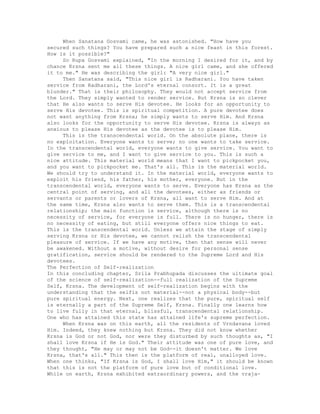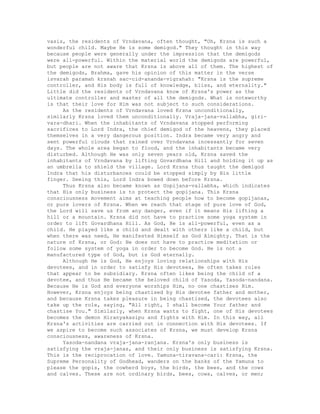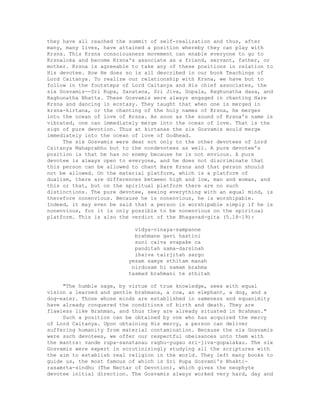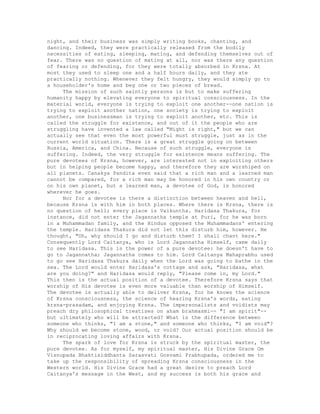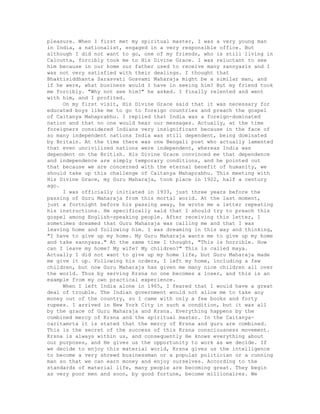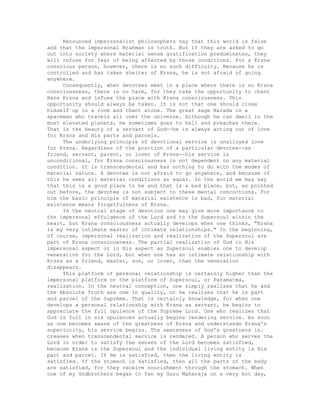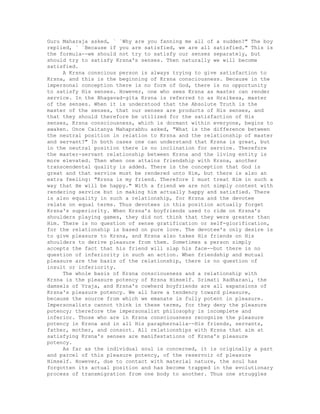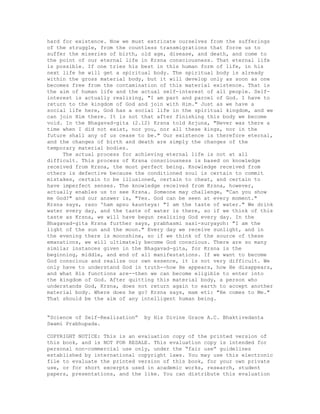This document provides a foreword and introduction to the book "Science of Self-Realization" by His Divine Grace A.C. Bhaktivedanta Swami Prabhupada. The foreword describes the author's first meeting with Prabhupada in 1966 and how he started spreading Indian philosophy and culture in New York City. It details the growth of his movement in the US and his teachings. The introduction explains that Prabhupada was a profound spiritual teacher, philosopher and author who produced many volumes translating classic Indian texts to spread spiritual knowledge to the Western world.
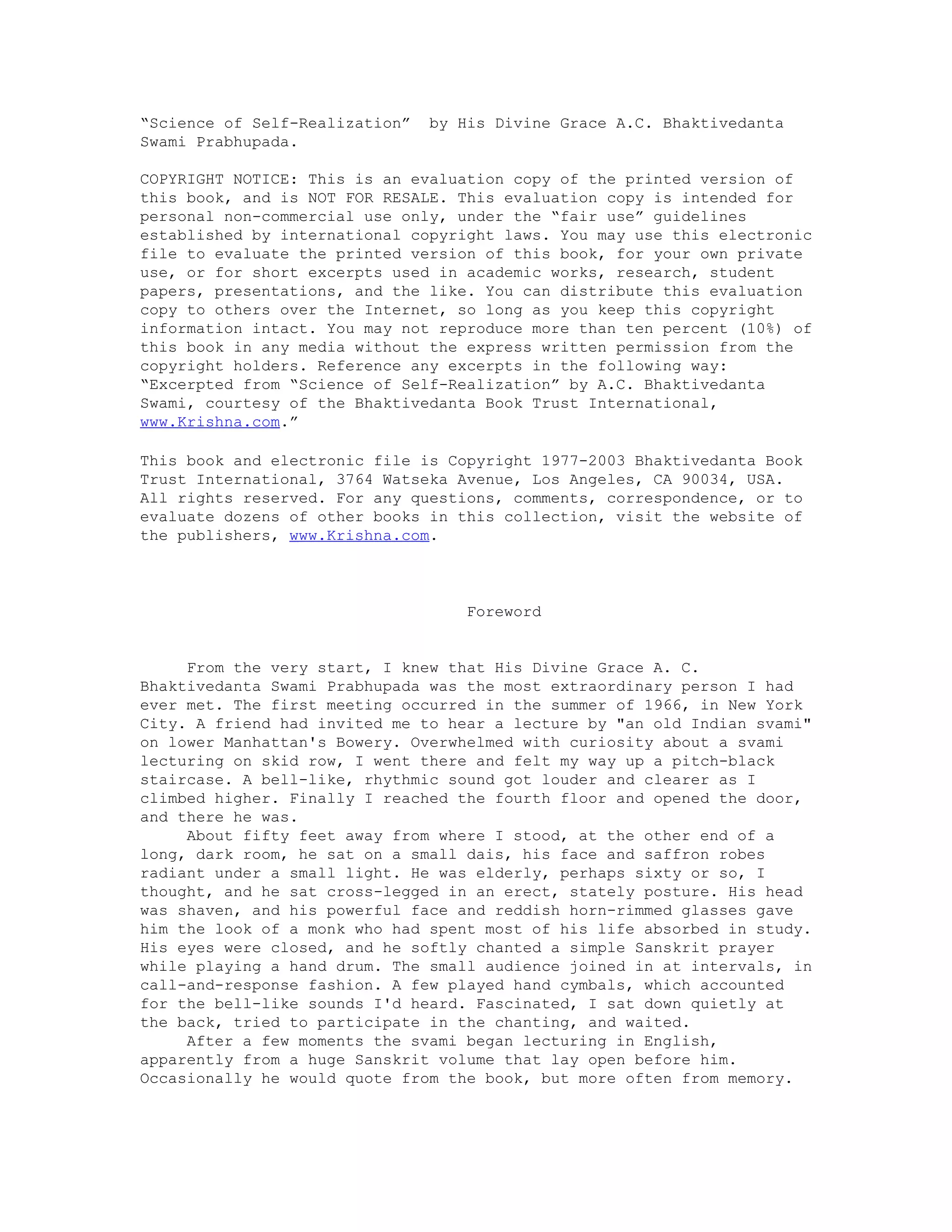
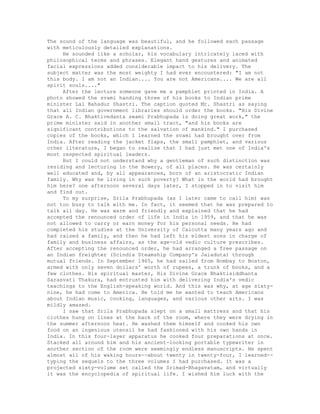
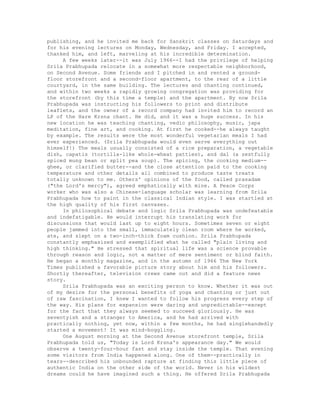
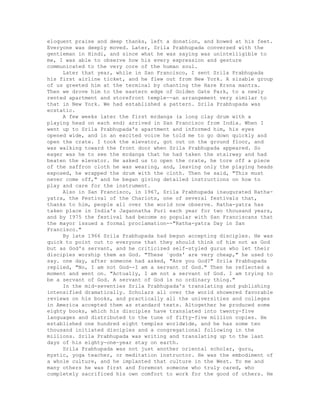
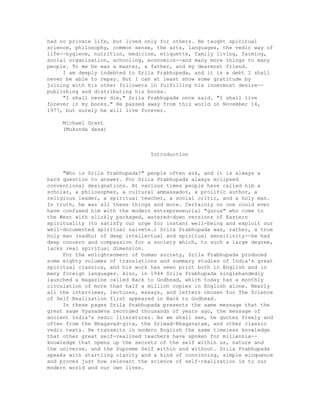
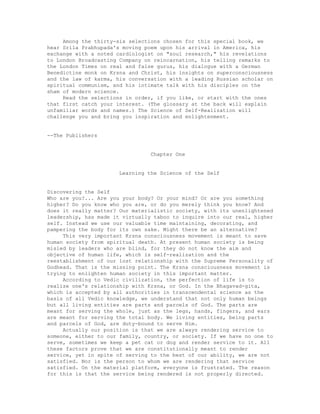
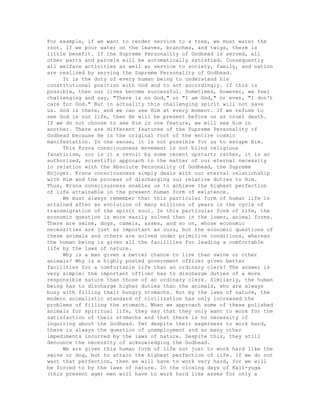
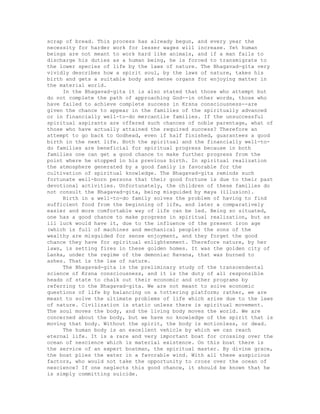
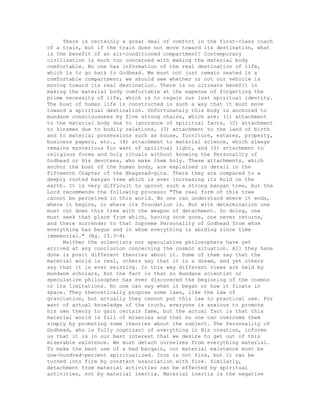
![side of material action, but spiritual activity is not only the negation
of material action but the activation of our real life. We must be
anxious to search out eternal life, or spiritual existence in Brahman,
the Absolute. The eternal kingdom of Brahman is described in the
Bhagavad-gita as that eternal country from which no one returns. That is
the kingdom of God.
The beginning of our present material life cannot be traced, nor is
it necessary for us to know how we became conditioned in material
existence. We have to be satisfied with the understanding that somehow
or other this material life has been going on since time immemorial and
now our duty is to surrender unto the Supreme Lord, who is the original
cause of all causes. The preliminary qualification for going back to
Godhead is given in the Bhagavad-gita (15.5): "One who is free from
illusion, false prestige, and false association, who understands the
eternal, who is done with material lust and is free from the duality of
happiness and distress, and who knows how to surrender unto the Supreme
Person attains that eternal kingdom."
One who is convinced of his spiritual identity and is freed from
the material conception of existence, who is free from illusion and is
transcendental to the modes of material nature, who constantly engages
in understanding spiritual knowledge and who has completely severed
himself from sense enjoyment can go back to Godhead. Such a person is
called amudha, as distinguished from mudha, or the foolish and ignorant,
for he is freed from the duality of happiness and distress.
And what is the nature of the kingdom of God? It is described in
the Bhagavad-gita (15.6) as follows: "That abode of Mine is not
illumined by the sun or moon, nor by electricity. One who reaches it
never returns to this material world."
Although every place in the creation is within the kingdom of God
because the Lord is the supreme proprietor of all planets, there is
still the Lord's personal abode, which is completely different from the
universe in which we are now living. And this abode is called paramam,
or the supreme abode. Even on this earth there are countries where the
standard of living is high and countries where the standard of living is
low. Besides this earth, there are innumerable other planets distributed
all over the universe, and some are considered superior places and some
inferior places. In any case, all planets within the jurisdiction of the
external energy, material nature, require the rays of a sun or the light
of fire for their existence, because the material universe is a region
of darkness. Beyond this region, however, is a spiritual realm, which is
described as functioning under the superior nature of God. That realm is
described in the Upanisads thus: "There is no need of sun, moon, or
stars, nor is that abode illumined by electricity or any form of fire.
All these material universes are illumined by a reflection of that
spiritual light, and because that superior nature is always self-
luminous, we can experience a glow of light even in the densest darkness
of night." In the Hari-vamsa the spiritual nature is explained by the
Supreme Lord Himself as follows: "The glaring effulgence of the
impersonal Brahman [the impersonal Absolute] illuminates all existences,
both material and spiritual. But, O Bharata, you must understand that
this Brahman illumination is the effulgence of My body." In the Brahma-
samhita this conclusion is also confirmed. We should not think that we
can attain that abode by any material means such as spaceships, but we
should know for certain that one who can attain that spiritual abode of](https://image.slidesharecdn.com/scienceofself-realization-180727182233/85/Science-of-self-realization-10-320.jpg)
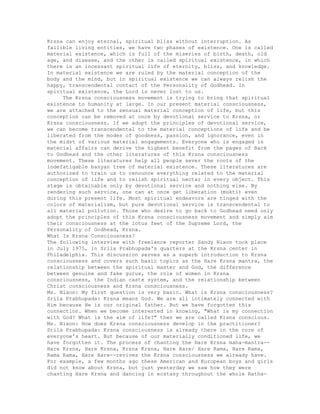
![yatra procession [an annual festival sponsored by the Krsna
consciousness movement in cities around the world]. Do you think that
was artificial? No. Artificially, nobody can chant and dance for hours
together. They have actually awakened their Krsna consciousness by
following a bona fide process. This is explained in the Caitanya-
caritamrta (Madhya 22. 107):
nitya-siddha krsna-prema `sadhya' kabhu naya
sravanadi-suddha-citte karaye udaya
Krsna consciousness is dormant in everyone's heart, and when one
comes in contact with devotees, it is awakened. Krsna consciousness is
not artificial. Just as a young boy awakens his natural attraction for a
young girl in her association, similarly, if one hears about Krsna in
the association of devotees, he awakens his dormant Krsna consciousness.
Ms. Nixon: What is the difference between Krsna consciousness and Christ
consciousness?
Srila Prabhupada: Christ consciousness is also Krsna consciousness, but
because at present people do not follow the rules and regulations of
Christianity--the commandments of Jesus Christ--they do not come to the
standard of God consciousness.
Ms. Nixon: What is unique about Krsna consciousness among all religions?
Srila Prabhupada: Primarily, religion means to know God and to love Him.
That is religion. Nowadays, because of a lack of training, nobody knows
God, what to speak of loving Him. People are satisfied simply going to
church and praying, "O God, give us our daily bread." In the Srimad-
Bhagavatam this is called a cheating religion, because the aim is not to
know and love God but to gain some personal profit. In other words, if I
profess to follow some religion but I do not know who God is or how to
love Him, I am practicing a cheating religion. As far as the Christian
religion is concerned, ample opportunity is given to understand God, but
no one is taking it. For example, the Bible contains the commandment
"Thou shall not kill," but Christians have built the world's best
slaughterhouses. How can they become God conscious if they disobey the
commandments of Lord Jesus Christ? And this is going on not just in the
Christian religion, but in every religion. The title "Hindu," "Muslim,"
or "Christian" is simply a rubber stamp. None of them knows who God is
and how to love Him.
Ms. Nixon: How can one tell a bona fide spiritual master from a fake?
Srila Prabhupada: Whoever teaches how to know God and how to love Him--
he is a spiritual master. Sometimes bogus rascals mislead people. "1 am
God," they claim, and people who do not know what God is believe them.
You must be a serious student to understand who God is and how to love
Him. Otherwise, you will simply waste your time. So the difference
between others and us is that we are the only movement that can actually
teach one how to know God and how to love Him. We are presenting the
science of how one can know Krsna, the Supreme Personality of Godhead,
by practicing the teachings of the Bhagavad-gita and the Srimad-
Bhagavatam. They teach us that our only business is to love God. Our
business is not to ask God for our necessities. God gives necessities to
everyone--even to one who has no religion. For example, cats and dogs
have no religion, yet Krsna supplies them with the necessities of life.
So why should we bother Krsna for our daily bread? He is already](https://image.slidesharecdn.com/scienceofself-realization-180727182233/85/Science-of-self-realization-12-320.jpg)
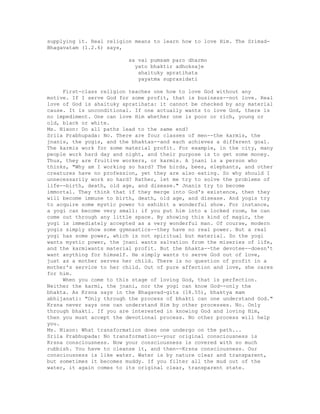
![Ms. Nixon: Can one function better in society by becoming Krsna
conscious?
Srila Prabhupada: Yes, you can see that my disciples are not drunkards
or meat-eaters, and from a physiological point of view they are very
clean--they'll never be attacked by serious diseases. Actually, giving
up meat-eating is not a question of Krsna consciousness but of civilized
human life. God has given human society so many things to eat--nice
fruits, vegetables, grain, and first-class milk. From milk one can
prepare hundreds of nutritious foods, but no one knows the art. Instead,
people maintain big slaughterhouses and eat meat. They are not even
civilized. When man is uncivilized, he kills poor animals and eats them.
Civilized men know the art of preparing nutritious foods from milk.
For instance, on our New Vrndavana farm in West Virginia, we make
hundreds of first-class preparations from milk. Whenever visitors come,
they are astonished that from milk such nice foods can be prepared. The
blood of the cow is very nutritious, but civilized men utilize it in the
form of milk. Milk is nothing but cow's blood transformed. You can make
milk into so many things--yogurt, curd, ghee (clarified butter), and so
on--and by combining these milk products with grains, fruits, and
vegetables, you can make hundreds of preparations. This is civilized
life--not directly killing an animal and eating its flesh. The innocent
cow is simply eating grass given by God and supplying milk, which you
can live on. Do you think cutting the cow's throat and eating its flesh
is civilized?
Ms. Nixon: No, I agree with you one hundred percent.... One thing I'm
very curious about: can the Vedas be taken symbolically as well as
literally?
Srila Prabhupada: No. They must be taken as they are, not symbolically.
That is why we are presenting the Bhagavad-gita As It Is.
Ms. Nixon: Are you attempting to revive the ancient Indian caste system
in the West? The Gita mentions the caste system...
Srila Prabhupada: Where does the Bhagavad-gita mention the caste system?
Krsna says, catur-varnyam maya srstam guna-karma-vibhagasah: "I created
four divisions of men according to their quality and work." (Bg. 4.13)
For instance, you can understand that there are engineers as well as
medical practitioners in society. Do you say they belong to different
castes--that one is in the engineer caste and the other is in the
medical caste? No. If a man has qualified himself in medical school, you
accept him as a doctor; and if another man has a degree in engineering,
you accept him as an engineer. Similarly, the Bhagavad-gita defines four
classes of men in society: a class of highly intelligent men, a class of
administrators, a class of productive men, and ordinary workers. These
divisions are natural. For example, one class of men is very
intelligent. But to actually meet the qualifications of first-class men
as described in the Bhagavad-gita, they need to be trained, just as an
intelligent boy requires training in a college to become a qualified
doctor. So in the Krsna consciousness movement we are training the
intelligent men how to control their minds, how to control their senses,
how to become truthful, how to become clean internally and externally,
how to become wise, how to apply their knowledge in practical life, and
how to become God conscious. All these boys [gestures toward seated
disciples] have first-class intelligence, and now we are training them
to use it properly.](https://image.slidesharecdn.com/scienceofself-realization-180727182233/85/Science-of-self-realization-14-320.jpg)
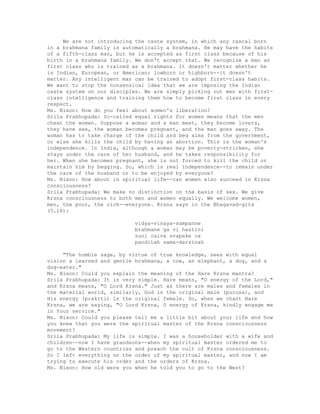
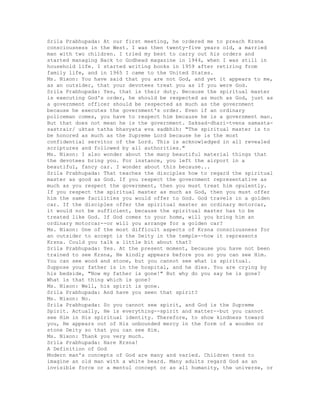
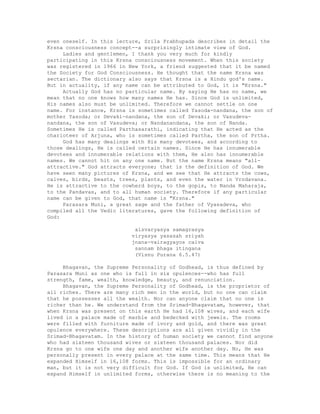
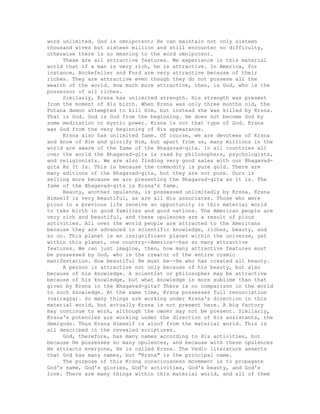
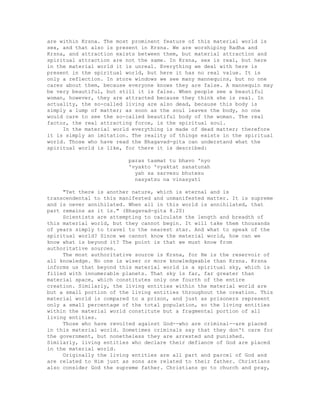
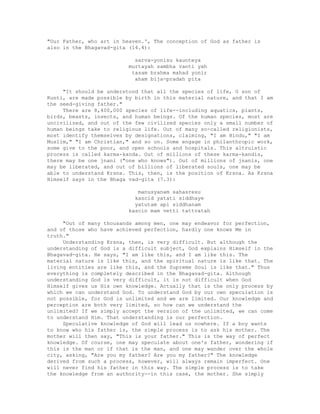
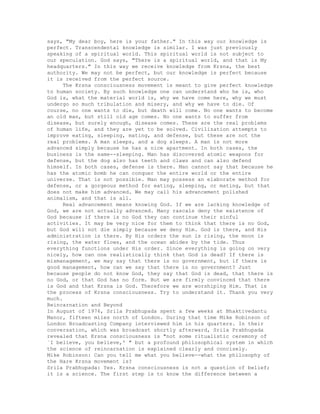
![living body and a dead body. What is the difference? The difference is
that when someone dies, the spirit soul, or the living force, leaves the
body. And therefore the body is called "dead." So, there are two things:
one, this body; and the other, the living force within the body. We
speak of the living force within the body. That is the difference
between the science of Krsna consciousness, which is spiritual, and
ordinary material science. As such, in the beginning it is very, very
difficult for an ordinary man to appreciate our movement. One must first
understand that he is a soul, or something other than his body.
Mike Robinson: And when will we understand that?
Srila Prabhupada: You can understand at any moment, but it requires a
little intelligence. For example, as a child grows, he becomes a boy,
the boy becomes a young man, the young man becomes an adult, and the
adult becomes an old man. Throughout all this time, although his body is
changing from a child to an old man, he still feels himself to be the
same person, with the same identity. Just see: the body is changing, but
the occupier of the body, the soul, is remaining the same. So we should
logically conclude that when our present body dies, we get another body.
This is called transmigration of the soul.
Mike Robinson: So when people die it is just the physical body that
dies?
Srila Prabhupada: Yes. That is explained very elaborately in the
Bhagavad-gita (2.20): na jayate mriyate va kadacin... na hanyate
hanyamane sarire.
Mike Robinson: Do you often quote references?
Srila Prabhupada: Yes, we quote many references. Krsna consciousness is
a serious education, not an ordinary religion. [To a devotee:] Find that
verse in the Bhagavad-gita.
Disciple:
na jayate mriyate va kadacin
nayam bhutva bhavita va na bhuyah
ajo nityah sasvato 'yam purano
na hanyate hanyamane sarire
"For the soul, there is never birth nor death. Nor, having once
been, does he ever cease to be. He is unborn, eternal, ever-existing,
undying, and primeval. He is not slain when the body is slain."
Mike Robinson: Thank you very much for reading that. So can you explain
to me just a bit more? If the soul is undying, does everybody's soul go
to be with God when they die?
Srila Prabhupada: Not necessarily. If one is qualified--if he qualifies
himself in this life to go back home, back to Godhead--then he can go.
If he does not qualify himself, then he gets another material body. And
there are 8,400,000 different bodily forms. According to his desires and
karma, the laws of nature give him a suitable body. It is just like when
a man contracts some disease and then develops that disease. Is that
difficult to understand?
Mike Robinson: It's very difficult to understand all of it.
Srila Prabhupada: Suppose somebody has contracted smallpox. So, after
seven days he develops the symptoms. What is that period called?
Mike Robinson: Incubation?
Srila Prabhupada: Incubation. So you cannot avoid it. If you have
contracted some disease it will develop, by nature's law. Similarly,](https://image.slidesharecdn.com/scienceofself-realization-180727182233/85/Science-of-self-realization-22-320.jpg)

![shirt. If you come to see me tomorrow wearing a different shirt and a
different coat, does that mean you are a different person? No.
Similarly, each time you die you change bodies, but you, the spirit soul
within the body, remain the same. This point has to be understood; then
one can make further progress in the science of Krsna consciousness.
Mike Robinson: I am beginning to understand, but what I'm finding
difficult is how this ties in with the large numbers of your people we
see handing out Hare Krsna literature on Oxford Street.
Srila Prabhupada: This literature is meant to convince people about the
need for spiritual life.
Mike Robinson: And you're really not concerned whether or not they join
the Hare Krsna movement?
Srila Prabhupada: it doesn't matter. Our mission is to educate them.
People are in ignorance; they are living in a fool's paradise, thinking
that when their body is finished, everything is finished. That is
foolishness.
Mike Robinson: And you are basically just concerned to tell them that
there is a spiritual dimension to life?
Srila Prabhupada: Our first concern is to tell you that you are not this
body, that the body is your covering (your shirt and coat) and that
within the body you are living.
Mike Robinson: Yes, I think I've got that now. If we could go on from
there--you said that how you lived made a difference in your life after
death, that there are natural laws that determine your next life. How
does the process of transmigration work?
Srila Prabhupada: The process is very subtle. The spirit soul is
invisible to our material eyes. It is atomic in size. After the
destruction of the gross body, which is made up of the senses, blood,
bone, fat, and so forth, the subtle body of mind, intelligence, and ego
goes on working. So at the time of death this subtle body carries the
small spirit soul to another gross body. The process is just like air
carrying a fragrance. Nobody can see where this rose fragrance is coming
from, but we know that it is being carried by the air. You cannot see
how, but it is being done. Similarly, the process of transmigration of
the soul is very subtle. According to the condition of the mind at the
time of death, the minute spirit soul enters into the womb of a
particular mother through the semen of a father, and then the soul
develops a particular type of body given by the mother. It may be a
human being, it may be a cat, a dog, or anything.
Mike Robinson: Are you saying that we were something else before this
life?
Srila Prabhupada: Yes.
Mike Robinson: And we keep corning back as something else the next time?
Srila Prabhupada: Yes, because you are eternal. According to your work,
you are simply changing bodies. Therefore, you should want to know how
to stop this business, how you can remain in your original, spiritual
body. That is Krsna consciousness.
Mike Robinson: I see. So if I become Krsna conscious, I wouldn't risk
coming back as a dog?
Srila Prabhupada: No. [To a devotee:] Find this verse: janma karma ca me
divyam...
Disciple:
janma karma ca me divyam](https://image.slidesharecdn.com/scienceofself-realization-180727182233/85/Science-of-self-realization-24-320.jpg)
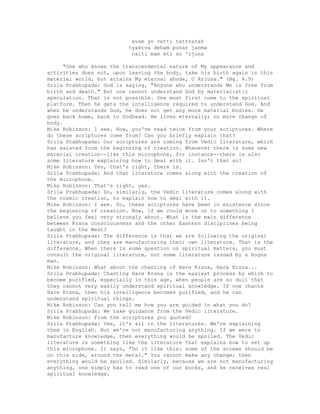
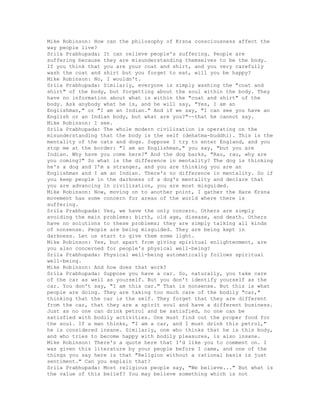
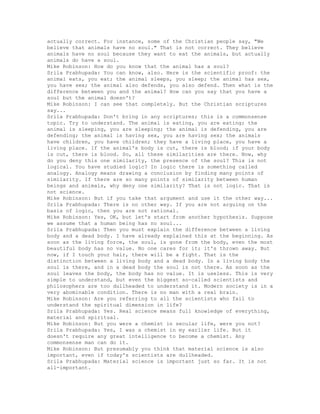
![Mike Robinson: I see. Can I come back to a question I had from before?
When we were differing a few minutes ago you were saying, "Don't bring
the scriptures in; just use common sense." But what part do the
scriptures play in your religion? How important are they?
Srila Prabhupada: Our religion is a science. When we say that a child
grows into a boy, it is science. It is not religion. Every child grows
into a boy. What is the question of religion? Every man dies. What is
the question of religion? And when a man dies, the body becomes useless.
What is the question of religion? It is science. Whether you're
Christian or Hindu or Muslim, when you die your body becomes useless.
This is science. When your relative dies, you cannot say, "We are
Christian; we believe he has not died." No, he has died. Whether you are
Christian or Hindu or Muslim, he has died. So when we speak, we speak on
this basis: that the body is important only as long as the soul is in
the body. When the soul is not there, it is useless. This science is
applicable to everyone, and we are trying to educate people on this
basis.
Mike Robinson: But if I understand you correctly, you seem to be
educating people on a purely scientific basis. Where does religion come
into it at all?
Srila Prabhupada: Religion also means science. People have wrongly taken
religion to mean faith--"I believe." [To a devotee:] Look up the word
religion in the dictionary.
Disciple: Under religion the dictionary says, "recognition of superhuman
control or power, and especially of a personal God entitled to
obedience, and effecting such recognition with the proper mental
attitude."
Srila Prabhupada: Yes. Religion means learning how to obey the supreme
controller. So, you may be Christian and I may be Hindu; it doesn't
matter. We must both accept that there is a supreme controller. Everyone
has to accept that; that is real religion. Not this "We believe animals
have no soul." That is not religion. That is most unscientific. Religion
means scientific understanding of the supreme controller: to understand
the supreme controller and obey Him--that's all. In the state, the good
citizen is he who understands the government and obeys the laws of the
government, and the bad citizen is the one who doesn't care for the
government. So, if you become a bad citizen by ignoring God's
government, then you are irreligious. And if you are a good citizen,
then you are religious.
Mike Robinson: I see. Can you tell me what you believe to be the meaning
of life? Why do we exist in the first place?
Srila Prabhupada: The meaning of life is to enjoy. But now you are on a
false platform of life, and therefore you are suffering instead of
enjoying. Everywhere we see the struggle for existence. Everyone is
struggling, but what is their enjoyment in the end? They are simply
suffering and dying. Therefore, although life means enjoyment, at the
present moment your life is not enjoyment. But if you come to the real,
spiritual platform of life, then you'll enjoy.
Mike Robinson: Can you explain to me, finally, some of the stages you go
through in spiritual life? What are the spiritual stages a new devotee
of Krsna goes through?
Srila Prabhupada: The first stage is that you are inquisitive. "So," you
say, "what is this Krsna consciousness movement? Let me study it." This
is called sraddha, or faith. This is the beginning. Then, if you are](https://image.slidesharecdn.com/scienceofself-realization-180727182233/85/Science-of-self-realization-28-320.jpg)
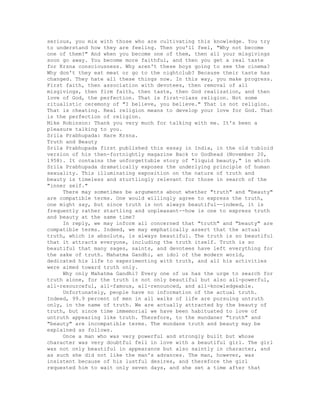
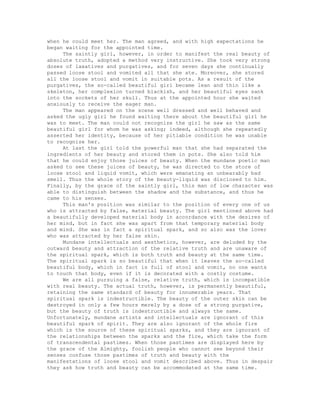
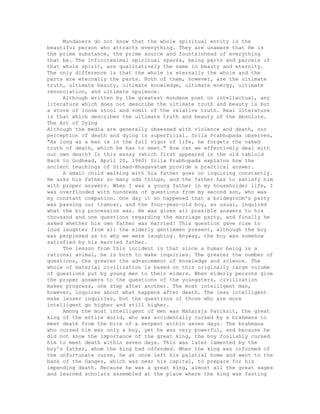
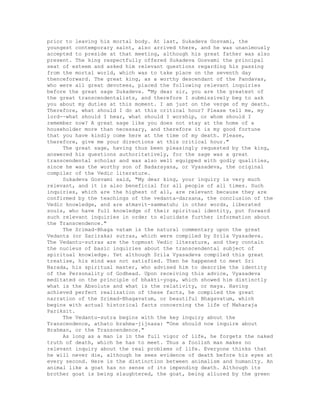

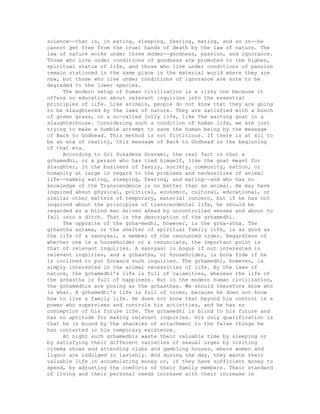
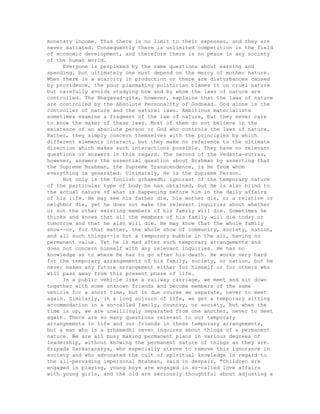
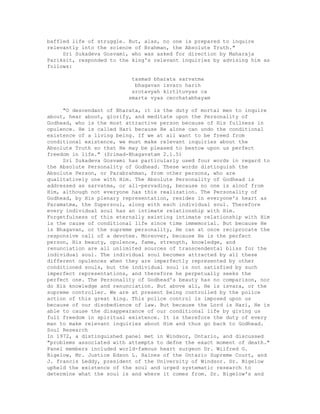
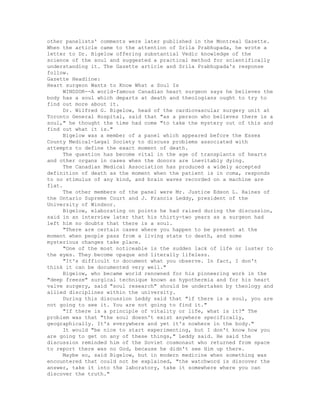
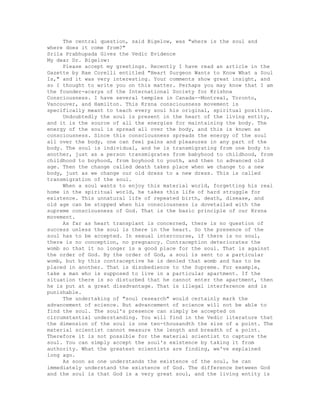
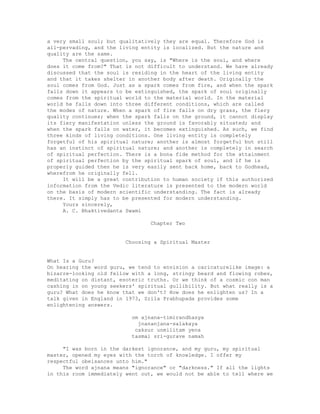
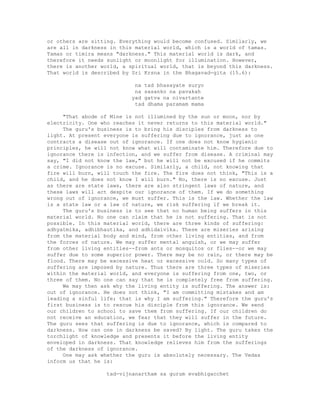
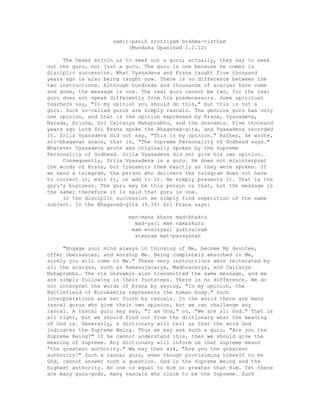
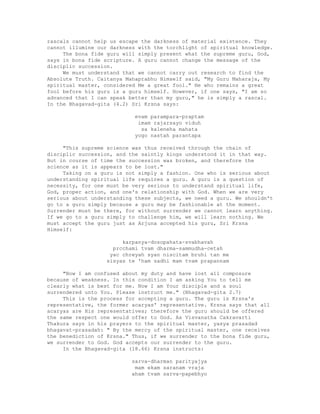
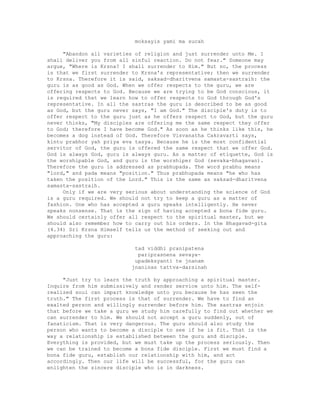
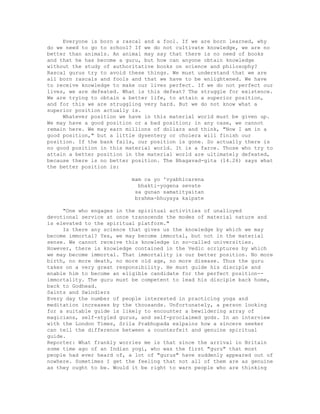
![of taking up spiritual life that they should make sure that they have a
genuine guru to teach them?
Srila Prabhupada: Yes. Of course, to search out a guru is very nice, but
if you want a cheap guru, or if you want to be cheated, then you will
find many cheating gurus. But if you are sincere, you will find a
sincere guru. Because people want everything very cheaply, they are
cheated. We ask our students to refrain from illicit sex, meat-eating,
gambling, and intoxication. People think that this is all very
difficult--a botheration. But if someone else says, "You may do whatever
nonsense you like, simply take my mantra," then people will like him.
The point is that people want to be cheated, and therefore cheaters
come. No one wants to undergo any austerity. Human life is meant for
austerity, but no one is prepared to undergo austerity. Consequently,
cheaters come and say, "No austerity. Whatever you like, you do. Simply
pay me, and I'll give you some mantra, and you'll become God in six
months." All this is going on. If you want to be cheated like this, the
cheaters will come.
Reporter: What about the person who seriously wants to find spiritual
life but who happens to finish up with the wrong guru?
Srila Prabhupada: If you simply want an ordinary education, you have to
devote so much time, labor, and understanding to it. Similarly, if you
are going to take to spiritual life, you must become serious. How is it
that simply by some wonderful mantras, someone can become God in six
months? Why do people want something like that? This means that they
want to be cheated.
Reporter: How can a person tell he has a genuine guru?
Srila Prabhupada: Can any of my students answer this question?
Disciple: Once I remember John Lennon asked you, "How will I know who is
the genuine guru?" And you answered, "Just find out the one who is most
addicted to Krsna. He is genuine."
Srila Prabhupada: Yes. The genuine guru is God's representative, and he
speaks about God and nothing else. The genuine guru is he who has no
interest in materialistic life. He is after God, and God only. That is
one of the tests of a genuine guru: brahma-nistham. He is absorbed in
the Absolute Truth. In the Mundaka Upanisad it is stated, srotriyam
brahma-nistham: "The genuine guru is well versed in the scriptures and
Vedic knowledge, and he is completely dependent on Brahman." He should
know what Brahman [spirit] is and how to become situated in Brahman.
These signs are given in the Vedic literature. As I said before, the
real guru is God's representative. He represents the Supreme Lord, just
as a viceroy represents a king. The real guru will not manufacture
anything. Everything he says is in accordance with the scriptures and
the previous acaryas. He will not give you a mantra and tell you that
you will become God in six months. This is not a guru's business. A
guru's business is to canvass everyone to become a devotee of God. That
is the sum and substance of a real guru's business. Indeed, he has no
other business. He tells whomever he sees, "Please become God
conscious." If he canvasses somehow or other on behalf of God and tries
to get everyone to become a devotee of God, he is a genuine guru.
Reporter: What about a Christian priest?
Srila Prabhupada: Christian, Muhammadan, Hindu--it doesn't matter. If he
is simply speaking on behalf of God, he is a guru. Lord Jesus Christ,
for instance. He canvassed people, saying, "Just try to love God."
Anyone--it doesn't matter who--be he Hindu, Muslim, or Christian, is a](https://image.slidesharecdn.com/scienceofself-realization-180727182233/85/Science-of-self-realization-45-320.jpg)
![guru if he convinces people to love God. That is the test. The guru
never says, "I am God," or "I will make you God." The real guru says, "I
am a servant of God, and I will make you a servant of God also." It
doesn't matter how the guru is dressed. As Caitanya Mahaprabhu said,
"Whoever can impart knowledge about Krsna is a spiritual master." A
genuine spiritual master simply tries to get people to become devotees
of Krsna, or God. He has no other business.
Reporter: But the bad gurus...
Srila Prabhupada: And what is a "bad" guru?
Reporter: A bad guru just wants some money or some fame.
Srila Prabhupada: Well, if he is bad, how can he become a guru?
[Laughter.] How can iron become gold? Actually, a guru cannot be bad,
for if someone is bad, he cannot be a guru. You cannot say "bad guru."
That is a contradiction. What you have to do is simply try to understand
what a genuine guru is. The definition of a genuine guru is that he is
simply talking about God--that's all. If he's talking about some other
nonsense, then he is not a guru. A guru cannot be bad. There is no
question of a bad guru, any more than a red guru or a white guru. Guru
means "genuine guru." All we have to know is that the genuine guru is
simply talking about God and trying to get people to become God's
devotees. If he does this, he is genuine.
Reporter: If I wanted to be initiated into your society, what would I
have to do?
Srila Prabhupada: First of all, you'd have to give up illicit sex life.
Reporter: Does that include all sex life? What is illicit sex life?
Srila Prabhupada: Illicit sex is sex outside of marriage. Animals have
sex with no restrictions, but in human society there are restrictions.
In every country and in every religion, there is some system of
restricting sex life. You would also have to give up all intoxicants,
including tea, cigarettes, alcohol, marijuana--anything that
intoxicates.
Reporter: Anything else?
Srila Prabhupada: You'd also have to give up eating meat, eggs, and
fish. And you'd have to give up gambling as well. Unless you gave up
these four sinful activities, you could not be initiated.
Reporter: How many followers do you have throughout the world?
Srila Prabhupada: For anything genuine, the followers may be very few.
For something rubbish, the followers may be many. Still, we have about
five thousand initiated disciples.
Reporter: Is the Krsna consciousness movement growing all the time?
Srila Prabhupada: Yes, it is growing--but slowly. This is because we
have so many restrictions. People do not like restrictions.
Reporter: Where is your following the greatest?
Srila Prabhupada: In the United States, Europe, South America, and
Australia. And, of course, in India there are millions who practice
Krsna consciousness.
Reporter: Could you tell me what the goal of your movement is?
Srila Prabhupada: The purpose of this Krsna consciousness movement is to
awaken man's original consciousness. At the present moment our
consciousness is designated. Someone is thinking, "I am an Englishman,"
and another is thinking, "I am an American." Actually, we do not belong
to any of these designations. We are all part and parcel of God; that is
our real identity. If everyone simply comes to that consciousness, all
the problems of the world will be solved. Then we shall come to know](https://image.slidesharecdn.com/scienceofself-realization-180727182233/85/Science-of-self-realization-46-320.jpg)
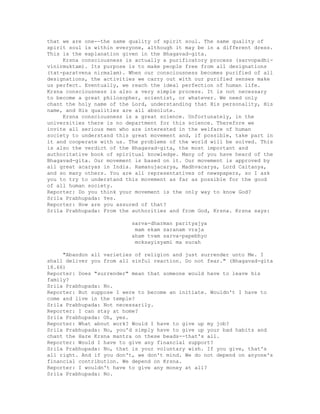

![What is actually required is that the leaders of society come forward to
understand this movement.
Reporter: Have you ever had people come to you who had previously been
involved with a fake guru?
Srila Prabhupada: Yes, there are many.
Reporter: Were their spiritual lives in any way spoiled by the fake
gurus?
Srila Prabhupada: No, they were genuinely seeking something spiritual,
and that was their qualification. God is within everyone's heart, and as
soon as someone genuinely seeks Him, He helps that person find a genuine
guru.
Reporter: Have the real gurus like yourself ever tried to put a stop to
the false gurus--that is, put pressure on them to put them out of
business, so to speak?
Srila Prabhupada: No, that is not my purpose. I started my movement
simply by chanting Hare Krsna. I chanted in New York in a place called
Tompkins Square Park, and soon people began to come to me. In this way,
the Krsna consciousness movement gradually developed. Many accepted, and
many did not accept. Those who are fortunate have accepted.
Reporter: Don't you feel that people are suspicious because of their
experience with fake gurus? If you went to a quack dentist and he broke
your tooth, you might be suspicious about going to another dentist.
Srila Prabhupada: Yes. Naturally, if you are cheated, you become
suspicious. But this does not mean that if you are cheated once, you
will always be cheated. You should find someone genuine. But to come to
Krsna consciousness, you must be either very fortunate or well aware of
this science. From the Bhagavad-gita we understand that the genuine
seekers are very few: manusyanam sahasresu kascid yatati siddhaye. Out
of many millions of people, there may be only one who is interested in
spiritual life. Generally, people are interested in eating, sleeping,
mating, and defending. So how can we expect to find many followers? It
is not difficult to notice that people have lost their spiritual
interest. And almost all those who are actually interested are being
cheated by so-called spiritualists. You cannot judge a movement simply
by the number of its followers. If one man is genuine, then the movement
is successful. It is not a question of quantity, but quality.
Reporter: I wondered how many people you think might have been taken in
by fake gurus.
Srila Prabhupada: Practically everyone. [Laughter.] There is no question
of counting. Everyone.
Reporter: This would mean thousands of people, wouldn't it?
Srila Prabhupada: Millions. Millions have been cheated, because they
want to be cheated. God is omniscient. He can understand your desires.
He is within your heart, and if you want to be cheated, God sends you a
cheater.
Reporter: ls it possible for everyone to attain the perfectional stage
you spoke of previously?
Srila Prabhupada: Within a second. Anyone can attain perfection within a
second--providing he is willing. The difficulty is that no one is
willing. In the Bhagavad-gita (18.66) Krsna says, sarva-dharman
parityajya mam ekam saranam vraja: "Simply surrender unto Me." But who
is going to surrender to God? Everyone says, "Oh, why should I surrender
to God? I will be independent." If you simply surrender, it is a](https://image.slidesharecdn.com/scienceofself-realization-180727182233/85/Science-of-self-realization-49-320.jpg)
![second's business. That's all. But no one is willing, and that is the
difficulty.
Reporter: When you say that lots of people want to be cheated, do you
mean that lots of people want to carry on with their worldly pleasures
and at the same time, by chanting a mantra or by holding a flower,
achieve spiritual life as well? Is this what you mean by wanting to be
cheated?
Srila Prabhupada: Yes, this is like a patient thinking, "I shall
continue with my disease, and at the same time I shall become healthy."
It is contradictory. The first requirement is that one become educated
in spiritual life. Spiritual life is not something one can understand by
a few minutes' talk. There are many philosophy and theology books, but
people are not interested in them. That is the difficulty. For instance,
the Srimad-Bhagavatam is a very long work, and if you try to read this
book, it may take many days just to understand one line of it. The
Bhagavatam describes God, the Absolute Truth, but people are not
interested. And if, by chance, someone becomes a little interested in
spiritual life, he wants something immediate and cheap. Therefore, he is
cheated. Actually, human life is meant for austerity and penance. That
is the way of Vedic civilization. In Vedic times they would train boys
as brahmacaris; no sex life was allowed at all up to the age of twenty-
five. Where is that education now? A brahmacari is a student who lives a
life of complete celibacy and obeys the commands of his guru at the
gurukula [school of the spiritual master]. Now schools and colleges are
teaching sex from the very beginning, and twelve- or thirteen-year-old
boys and girls are having sex. How can they have a spiritual life?
Spiritual life means voluntarily accepting some austerities for the sake
of God realization. That is why we insist on no illicit sex, meat-
eating, gambling, or intoxication for our initiated students. Without
these restrictions, any "yoga meditation" or so-called spiritual
discipline cannot be genuine. It is simply a business deal between the
cheaters and the cheated.
Reporter: Thank you very much.
Srila Prabhupada: Hare Krsna.
The Absolute Necessity of a Spiritual Master
In February 1936, in Bombay, India, the members of a reputed religious
society, the Gaudiya Majha, were astonished by the powerful and eloquent
words of a young member who spoke in honor of his spiritual master,
Srila Bhaktisiddhanta Sarasvati Gosvami. Three decades later, the young
speaker would become the world-renowned founder and spiritual master of
the Krsna consciousness movement. Srila Prabhupada's presentation is a
memorable statement on the importance of the guru in spiritual life.
saksad-dharitvena samasta-sastrair
uktas tatha bhavyata eva sadbhih
kintu prabhor yah priya eva tasya
vande guroh sri-caranara vindam
"In the revealed scriptures it is declared that the spiritual
master should be worshiped like the Supreme Personality of Godhead, and
this injunction is obeyed by pure devotees of the Lord. The spiritual
master is the most confidential servant of the Lord. Thus let us offer
our respectful obeisances unto the lotus feet of our spiritual master."](https://image.slidesharecdn.com/scienceofself-realization-180727182233/85/Science-of-self-realization-50-320.jpg)
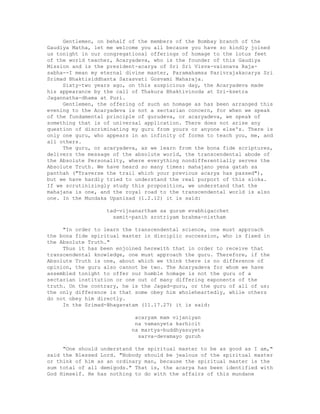
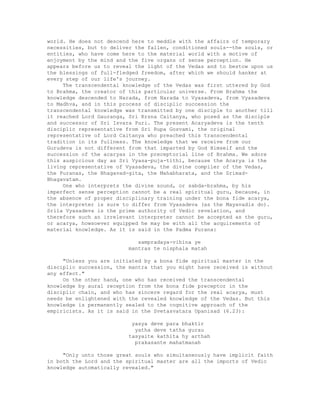
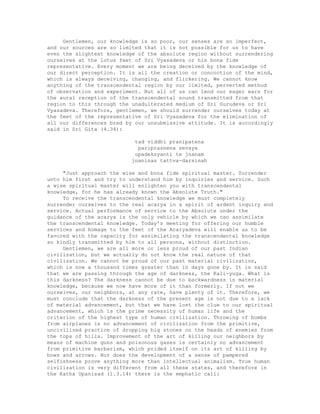
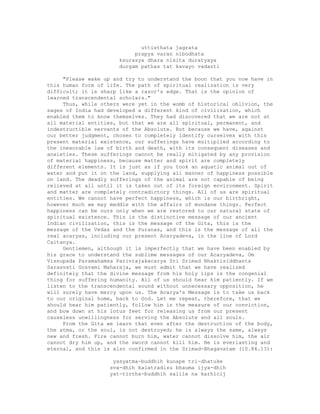
![janesv abhijnesu sa eva go-kharah
"Anyone who accepts this bodily bag of three elements [bile, mucus,
and air] as his self, who has an affinity for an intimate relationship
with his wife and children, who considers his land worshipable, who
takes bath in the waters of the holy places of pilgrimage but never
takes advantage of those persons who are in actual knowledge--he is no
better than an ass or a cow."
Unfortunately, in these days we have all been turned foolish by
neglecting our real comfort and identifying the material cage with
ourselves. We have concentrated all our energies for the meaningless
upkeep of the material cage for its own sake, completely neglecting the
captive soul within. The cage is meant for the undoing of the bird; the
bird is not meant for the welfare of the cage. Let us, therefore, deeply
ponder this. All our activities are now turned toward the upkeep of the
cage, and the most we do is try to give some food to the mind by art and
literature. But we do not know that this mind is also material in a more
subtle form. This is stated in the Gita (7.4):
bhumir apo 'nalo vayuh
kham mano buddhir eva ca
ahankara itiyam me
bhinna prakrtir astadha
"Earth, fire, water, air, sky, intelligence, mind, and ego are all
My separated energies."
We have scarcely tried to give any food to the soul, which is
distinct from the body and mind; therefore we are all committing suicide
in the proper sense of the term. The message of the Acaryadeva is to
give us a warning to halt such wrong activities. Let us therefore bow
down at his lotus feet for the unalloyed mercy and kindness he has
bestowed upon us.
Gentlemen, do not for a moment think that my Gurudeva wants to put
a complete brake on the modern civilization--an impossible feat. But let
us learn from him the art of making the best use of a bad bargain, and
let us understand the importance of this human life, which is fit for
the highest development of true consciousness. The best use of this rare
human life should not be neglected. As it is said in the Srimad-
Bhagavatam (11.9.29):
labdh va sudurlabham idam bahu-sambha vante
manusyam arthadam anityam apiha dhirah
turnam yateta na pated anu mrtyu yavan
nihsreyasaya visayah khalu sarvatah syat
"This human form of life is obtained after many, many births, and
although it is not permanent, it can offer the highest benefits.
Therefore a sober and intelligent man should immediately try to fulfill
his mission and attain the highest profit in life before another death
occurs. He should avoid sense gratification, which is available in all
circumstances."
Let us not misuse this human life in the vain pursuit of material
enjoyment, or, in other words, for the sake of only eating, sleeping,](https://image.slidesharecdn.com/scienceofself-realization-180727182233/85/Science-of-self-realization-55-320.jpg)
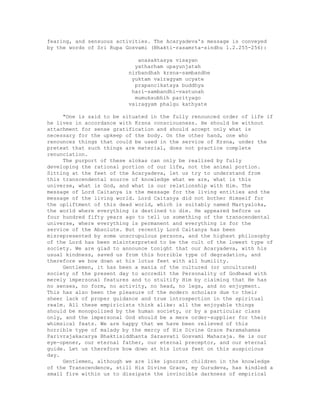
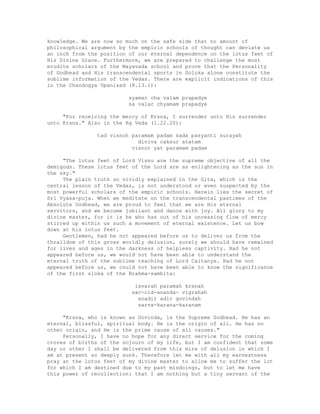
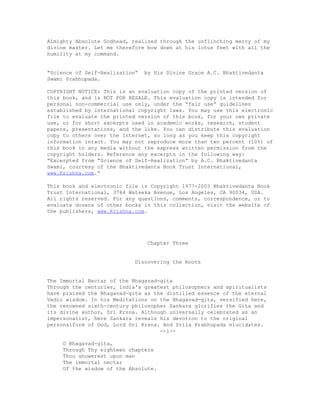
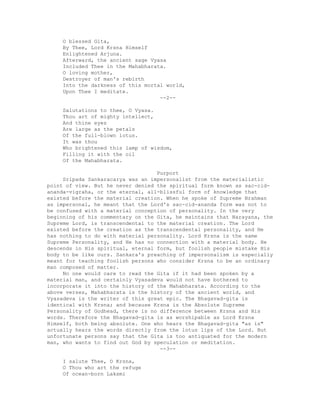
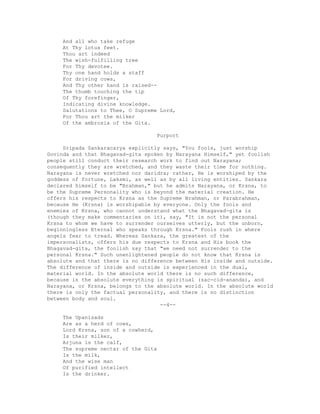
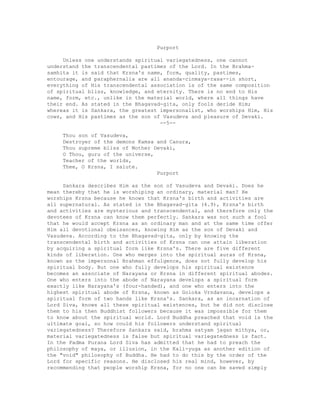
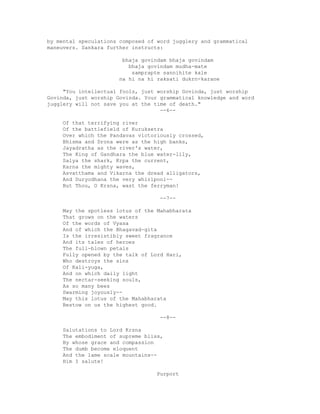
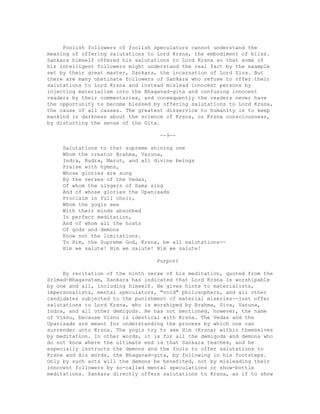
![the fools, who are searching after light, that here ls light like the
sun. But the fallen demons are like owls that will not open their eyes
on account of their fear of the sunlight itself. These owls will never
open their eyes to see the sublime light of Krsna and His words the
Bhagavad-gita. They will, however, comment on the Gita with their closed
owl-eyes to mislead their unfortunate readers and followers. Sankara,
however, discloses the light to his less intelligent followers and shows
that the Bhagavad-gita and Krsna are the only source of light. This is
all to teach the sincere seekers of truth to offer salutation to Lord
Krsna and thus surrender unto Him without misgivings. That is the
highest perfection of life, and that is the highest teaching of Sankara,
the great learned scholar whose teachings drove the voidist philosophy
of Buddha out of India, the land of knowledge. Om tat sat.
The Scriptural Basis of Krsna Consciousness
On January 11, 1970, an article in the Los Angeles Times reported that
faculty members at the University of California at Berkeley, including
Dr. J. F. Staal, professor of philosophy and South Asian languages, had
turned down a request to grant credit for an experimental course in
Krsna consciousness to have been taught by Hans Kary, president of the
Hare Krsna movement's Berkeley center. In rejecting the proposed course,
Dr. Staal suggested that the devotees "spend too much time chanting to
develop a philosophy." When the article came to the attention of Srila
Prabhupada, the founder and spiritual master ofthe Hare Krsna movement,
he initiated an unusual correspondence with the renowned professor.
Excerpt from the Los Angeles Times Article
"Dr. J. F. Staal, Professor of Philosophy and Near Eastern [sic]
Languages at UC Berkeley and an instructor in Indian philosophy,
believes that the Krsna sect is an authentic Indian religion and that
its adherents are sincere. He attributes the Society's rapid increase in
members to the tendency of today's younger generation to reject
organized churchgoing while at the same time searching for fulfillment
of a belief in mysticism.
"He points out, however, that persons who turn away from
Christianity, Muhammadanism, and Judaism have usually lost faith with
the personal god of those religions and are looking for a mystical
religion without absolutes.
" `These people in the Krsna movement have turned to Hinduism, but,
curiously, it is a cult that is highly personalistic,' Staal said. `They
accept a personal god, Krsna, and Christianity has that. I feel that
they have transferred some of their Christian background to a Hindu
sect.'
"He also feels that they spend too much time chanting to develop a
philosophy. On these grounds he and others on the faculty turned down
the request to grant credit for an experimental course in Krsna
consciousness that will be taught during the winter quarter by Hans
Kary, president of the sect's Berkeley temple."
Srila Prabhupada's Letter to the Los Angeles Times
Editor Los Angeles Times
Dear Sir:](https://image.slidesharecdn.com/scienceofself-realization-180727182233/85/Science-of-self-realization-64-320.jpg)
![With reference to your article in the Los Angeles Times dated
Sunday, January 11, 1970, under the heading "Krsna Chant," I beg to
point out that the Hindu religion is perfectly based on the personal
conception of God, or Visnu. The impersonal conception of God is a side
issue, or one of the three features of God. The Absolute Truth is
ultimately the Supreme Personality of Godhead, the Paramatma conception
is the localized aspect of His omnipresence, and the impersonal
conception is the aspect of His greatness and eternity. But all these
combined together make the Complete Whole.
Dr. J. F. Staal's statement that the Krsna cult is a combination of
Christian and Hindu religion, as if something manufactured by
concoction, is not correct. If Christian, Muhammadan, or Buddhist
religions are personal, that is quite welcome. But the Krsna religion
has been personal from a time long, long ago when Christian, Muhammadan,
and Buddhist religions had not yet come into existence. According to the
Vedic conception, religion is basically made by the personal God as His
laws. Religion cannot be manufactured by man or anyone except God
superior to man. Religion is the law of God only.
Unfortunately, all the svamis who came before me in this country
stressed the impersonal aspect of God, without sufficient knowledge of
God's personal aspect. In the Bhagavad-gita, therefore, it is said that
only less intelligent persons consider that God is originally impersonal
but assumes a form when He incarnates. The Krsna philosophy, however,
based on the authority of the Vedas, is that originally the Absolute
Truth is the Supreme Personality of Godhead. His plenary expansion is
present in everyone's heart in His localized aspect, and the impersonal
Brahman effulgence is the transcendental light and heat distributed
everywhere.
In the Bhagavad-gita it is clearly said that the aim of the Vedic
way of searching out the Absolute Truth is to find the personal God. One
who is satisfied only with the other aspects of the Absolute Truth,
namely the Paramatma feature or the Brahman feature, is to be considered
possessed of a poor fund of knowledge. Recently we have published our
Sri Isopanisad, a Vedic literature, and in this small booklet we have
thoroughly discussed this point.
As far as the Hindu religion is concerned, there are millions of
Krsna temples in India, and there is not a single Hindu who does not
worship Krsna. Therefore, this Krsna consciousness movement is not a
concocted idea. We invite all scholars, philosophers, religionists, and
members of the general public to understand this movement by critical
study. And if one does so seriously, one will understand the sublime
position of this great movement.
The chanting process is also authorized. Professor Staal's feeling
of disgust in the matter of constant chanting of the holy name of Krsna
is a definite proof of his lack of knowledge in this authorized movement
of Krsna consciousness. Instead of turning down the request to give
Kary's course credit, he and all other learned professors of the
University of California at Berkeley should patiently hear about the
truth of this authorized movement so much needed at present in godless
society. [Credit for the course was later established.] This is the only
movement which can save the confused younger generation. I shall invite
all responsible guardians of this country to understand this
transcendental movement and then give us all honest facilities to spread
it for everyone's benefit.](https://image.slidesharecdn.com/scienceofself-realization-180727182233/85/Science-of-self-realization-65-320.jpg)
![A. C. Bhaktivedanta Swami
Spiritual Master of the Hare Krsna Movement
The Exchange Between Srila Prabhupada and Dr. Staal
Swami A. C. Bhaktivedanta
Dear Swamiji:
Thank you very much for sending me a copy of your letter to the Los
Angeles Times, now also published in the Daily Californian. I think you
will agree with me that apart from publicity, little is gained by
discussing religious or philosophic issues through interviews and
letters in the press; but allow me to make two brief observations.
First, I know that devotion to Krsna is old (though definitely not
as old as the Vedas) and has never been influenced by Christianity,
Islam, or Judaism (I never referred to Buddhism in this connection). The
differences between the personal and impersonal are relatively vague,
but adopting this distinction for simplicity, I expressed surprise at
seeing people who have grown up in a Western culture which stresses the
personal take to an Indian cult which does the same. I am less surprised
when people who are dissatisfied with Western monotheism take to an
Indian philosophy which stresses an impersonal absolute.
Second, I never expressed nor felt disgust at the chanting of the
name of Krsna. I am not only not irritated at it (like some people), but
I rather like it. But it is an indisputable fact that the Bhagavad-gita
(not to mention the Vedas) does not require such constant chanting. The
Gita deals with quite different subjects, which I treat at some length
in my courses on the philosophies of India.
Thanking you,
Yours sincerely,
J. F. Staal
Professor of Philosophy and of South Asian Languages
J. F. Staal
Professor of Philosophy and of South Asian Languages
University of California
Berkeley, California
My dear Professor Staal:
I thank you very much for your kind letter dated January 23, 1970.
In the last paragraph of your letter you have mentioned that you are not
irritated at the chanting of the Hare Krsna mantra (like some people),
but rather like it. This has given me much satisfaction, and I am
sending herewith a copy of our magazine, Back to Godhead, issue number
28, in which you will find how the students [at a program at Ohio State
University] liked this chanting of the Hare Krsna mantra, although all
of them were neophytes to this cult of chanting. Actually this chanting
is very pleasing to the heart and is the best means of infusing
spiritual consciousness, or Krsna consciousness, into the hearts of
people in general.
This is the easiest process of spiritual realization and is
recommended in the Vedas. In the Brhan-naradiya Purana it is clearly
stated that it is only chanting of the holy name of Hari [Krsna] that
can save people from the problems of materialistic existence, and there](https://image.slidesharecdn.com/scienceofself-realization-180727182233/85/Science-of-self-realization-66-320.jpg)
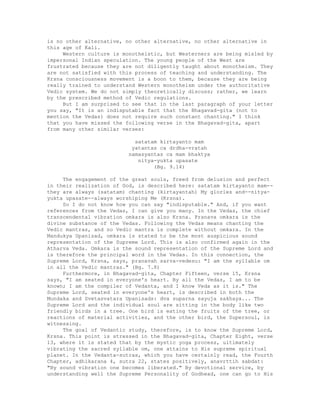
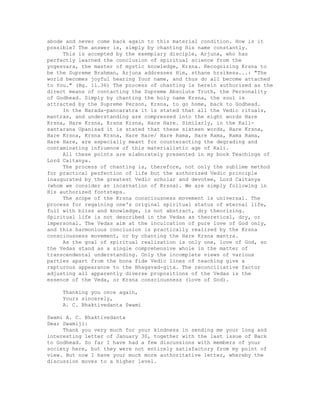
![And yet, I am afraid, you have not convinced me that all the
scriptures you quote prescribe only chanting of the name of Krsna. Let
me refer only to the most important ones.
In the Bhagavad-gita (9.14), kirtayantah need not mean chanting of
the name of Krsna. It may mean glorifying, chanting, reciting, talking,
and refer to songs, hymns, descriptions, or conversations. The
commentators take it that way. Sankara in his commentary merely repeats
the word, but Anandagiri in his vyakhya classes kirtana as vedanta-
sravanam pranava-japas ca, "listening to the Vedanta and muttering om"
(that the Vedic om is Krsna is said in the Bhagavad-gita, where Krsna is
also identified with many other things, and which is smrti, but not in
the Vedas, which are sruti). Another commentator, Hanuman, in his
Paisaca-bhasya, says that kirtayantah merely means bhasamanah--"talking
[about]."
More important, I think, than the precise meaning of this word, is
that the entire verse does not require that everyone always engage in
kirtana, but merely states that some great souls do so. This is obvious
from the next verse, which states that anye, "others," engage in jnana:
yajnena... yajanto mam, "worshiping me... with the worship of
knowledge." The Bhagavad-gita is broad-minded and tolerant of a variety
of religious approaches, although it also stresses one aspect above all
others (i.e., sarva-phala-tyaga).
Finally, in the last sutra of the Vedanta-sutra, anavrttih
sabdat..., sabda refers to the scripture or to the revelation of the
Vedas, as is clear from the context and from the commentators. Sankara
quotes a number of texts (ending with ity adi-sabdebhyah, "according to
these sabdas") to support this, i.e., to support the statement that
"according to the scripture there is no return." He also refers to sabda
in this sutra by saying mantrartha-vadadi..., "mantras, descriptions,
etc." Vacaspati Misra in the Bhamati supports this and clarifies it
further by adding that a contrary view is sruti-smrti-virodhah, "in
conflict with the smrti and the sruti."
Thanking you once again for your kind attention.
Yours very sincerely,
J. F. Staal
J. F. Staal
Professor of Philosophy and of South Asian Languages
My dear Dr. Staal:
I am very glad to receive your letter dated Sunday, February 8,
1970. I am very much pleased also to note the contents.
Regarding convincing you that all scriptures prescribe chanting of
the name of Krsna, I can simply present the authority of Lord Caitanya.
Lord Caitanya recommended, kirtanlyah sada harih ["Hari, Krsna, is
constantly to be praised" (Siksastaka 3)]. Similarly, Madhvacarya
quotes, vede ramayane caiva harih sarvatra glyate ["Hari is sung about
everywhere in the Vedas and Ramayana"]. Similarly, in the Bhagavad-gita
(15.15) the Lord says, vedais ca sarvair aham eva vedyah ["By all the
Vedas, I am to be known"].
In this way we find all the scriptures aiming at the Supreme
Person. In the Rg Veda (1.22.20) the mantra is om tad visnoh paramam
padam sada pasyanti surayah ["The demigods are always looking to that
supreme abode of Visnu"]. The whole Vedic process, therefore, is to](https://image.slidesharecdn.com/scienceofself-realization-180727182233/85/Science-of-self-realization-69-320.jpg)
![understand Lord Visnu, and any scripture is directly or indirectly
chanting the glories of the Supreme Lord, Visnu.
Regarding the Bhagavad-gita, verse 9.14, kirtayantah certainly
means glorifying, chanting, reciting, and talking, as you have said; but
glorifying, chanting, or reciting about whom? It is certainly Krsna. The
word used in this connection is mam ["Me"]. Therefore, we do not
disagree when a person glorifies Krsna, as Sukadeva did in the Srimad-
Bhagavatam. This is also kirtana. The highest among all Vedic
literatures is the proper place for such glorification of the Supreme
Lord, Krsna, and this is to be well understood from the verse:
nigama -kalpataror galitam phalam
suka-mukhad amrta-dra va-samyutam
pibata bhaga vatam rasam alayam
muhur aho rasika bhuvi bhavukah
"O expert and thoughtful men, relish Srimad-Bhagavatam, the mature
fruit of the desire tree of Vedic literatures. It emanated from the lips
of Sri Sukadeva Gosvami. Therefore this fruit has become even more
tasteful, although its nectarean juice was already relishable for all,
including liberated souls." (Srimad-Bhagavatam 1.1.3)
It is said that Maharaja Pariksit attained salvation simply by
hearing, and similarly Sukadeva Gosvami attained salvation simply by
chanting. In our devotional service there are nine different methods for
achieving the same goal, love of Godhead, and the first process is
hearing. This hearing process is called sruti. The next process is
chanting. The chanting process is smrti. We accept both sruti and smrti
simultaneously. We consider sruti the mother and smrti the sister,
because a child hears from the mother and then again learns from the
sister by description.
Sruti and smrti are two parallel lines. Srila Rupa Gosvami
therefore says:
sruti-smrti-puranadi-
pancaratra-vidhim vina
aikantiki harer bhaktir
utpatayaiva kaipate
(Bhakti-rasamrta-sindhu 1.2.101)
That is, without references to sruti, smrti, Puranas, and
Pancaratras, unadulterated devotional service is never achieved.
Therefore, anyone who shows a devotional ecstasy without reference to
the sastras [Vedic scriptures] simply creates disturbances. On the other
hand, if we simply stick to the srutis, then we become veda-vada-ratah,
who are not very much appreciated in the Bhagavad-gita.
Therefore Bhagavad-gita, although smrti, is the essence of all
Vedic scripture, sarvopanisado gavah. It is just like a cow which is
delivering the milk, or the essence of all the Vedas and Upanisads, and
all the acaryas, including Sankaracarya, accept the Bhagavad-gita as
such. Therefore you cannot deny the authority of the Bhagavad-gita
because it is smrti; that view is sruti-smrti-virodhah, "in conflict
with the smrti and the sruti," as you have correctly said.
Regarding Anandagiri's quotation that kirtana means vedanta-sra
vanam prana va japas ca ["listening to the Vedanta and muttering om"],](https://image.slidesharecdn.com/scienceofself-realization-180727182233/85/Science-of-self-realization-70-320.jpg)
![the knower of Vedanta is Krsna, and He is the compiler of Vedanta. He is
veda-vit and vedanta-krt. So where is there a greater opportunity for
vedanta-sravana than to hear it from Krsna?
Regarding the next verse, in which it is mentioned that jnana-
yajnena... yajanto mam, the object of worship is Krsna, as indicated by
mam ["Me"]. The process is described in the Isopanisad, mantra 11:
vidyam cavidyam ca yas
tad vedobhayam saha
avidyaya mrtyum tirtva
vidyayamrtam asnute
"Only one who can learn the process of nescience and that of
transcendental knowledge side by side can transcend the influence of
repeated birth and death and enjoy the full blessings of immortality."
The culture of vidya, or transcendental knowledge, is essential for
the human being, otherwise the culture of avidya, or nescience, binds
him to conditional existence on the material platform. Materialistic
existence means the pursuit or culture of sense gratification, and this
kind of knowledge of sense gratification (avdiya) means advancement of
repeated birth and death. Those who are absorbed in such knowledge
cannot learn any lesson from the laws of nature, and they do the same
things over repeatedly, being enamored of the beauty of illusory things.
Vidya, or factual knowledge, on the other hand, means to know thoroughly
the process of nescient activities while at the same time culturing
transcendental science and thereby undeviatingly following the path of
liberation.
Liberation is the enjoyment of the full blessings of immortality.
This immortality is enjoyed in the eternal kingdom of God (sambhuty-
amrtam asnute), the region of the Supreme Personality of Godhead, and is
the result obtained by worshiping the Supreme Lord, the cause of all
causes, sambhavat. So in this way real knowledge, vidya, means to
worship the Supreme Personality of Godhead, Krsna; that is jnana-
yajnena, the worship of knowledge.
This jnana-yajnena... yajanto mam is the perfection of knowledge,
as stated in the Bhagavad-gita (7.19):
bahunam janmanam ante
jnanavan mam prapadyate
vasudevah sarvam iti
sa mahatma sudurlabhah
"After many births and deaths, he who is actually in knowledge
surrenders unto Me [Krsna], knowing Me to be the cause of all causes,
and all that is. Such a great soul is very rare."
If one has not yet come to this conclusion of knowledge and simply
indulges in dry speculation without Krsna, then his hard speculative
labor is something like beating empty husks of grain. The unhulled rice
and the empty husks of rice look very much the same. One who knows how
to get the grain out of the unhulled rice is wise, but one who beats on
the empty husk, thinking to get some result, is simply wasting his labor
uselessly. Similarly, if one studies the Vedas without finding the goal
of the Vedas, Krsna, he simply wastes his valuable time.](https://image.slidesharecdn.com/scienceofself-realization-180727182233/85/Science-of-self-realization-71-320.jpg)
![So to cultivate knowledge for worshiping Krsna culminates after
many, many births and deaths when one actually becomes wise. When one
becomes wise in this way, he surrenders to Krsna, recognizing Him at
last to be the cause of all causes and all that is. That sort of great
soul is very rare. So those who have surrendered to Krsna life and soul
are rare sudurlabha mahatmas. They are not ordinary mahatmas.
By the grace of Lord Caitanya that highest perfectional status of
life is being distributed very freely. The effect is also very
encouraging; otherwise, how are boys and girls without any background of
Vedic culture quickly occupying the posts of rare mahatmas simply by
vibrating this transcendental sound, Hare Krsna? And simply on the basis
of this chanting, the majority of them (those who are very sincere) are
steady in devotional service and are not falling down to the four
principles of material sinful life, namely (1) meat-eating, (2) illicit
sexual connection, (3) taking of intoxicants, including coffee, tea, and
tobacco, and (4) gambling. And that is the last sutra of the Vedanta-
sutra, i.e., anavrttih sabdat ["By sound vibration one becomes
liberated"].
One has to learn by the result (phalena pariclyate). Our students
are ordered to act like this, and they are not falling down. That they
are remaining on the platform of pure spiritual life without hankering
to culture the above principles of avidya, or sense gratification, is
the test of their proper understanding of the Vedas. They do not come
back to the material platform, because they are relishing the nectarean
fruit of love of God.
Sarva-phala-tyaga ["renunciation of all the fruits of one's work"]
is explained in the Bhagavad-gita by the Lord Himself in the words
sarva-dharman parityajya mam ekam saranam vraja: "Give up everything and
simply surrender unto Me [Krsna]." The Hare Krsna mantra means "O
Supreme Energy of Krsna and O Lord Krsna, please engage me in Your
eternal service." So we have given up everything and are simply engaged
in the service of the Lord. What Krsna orders us to do is our only
engagement. We have given up all resultant actions of karma, jnana, and
yoga; and that is the stage of pure devotional service, bhaktir uttama.
Yours sincerely,
A. C. Bhaktivedanta Swami
Swami A. C. Bhaktivedanta
Founder-Acarya
International Society for Krishna Consciousness
Dear Swamiji:
Thank you very much for your very interesting letter of February
15, 1970, with enclosure.
I am afraid that whenever you quote a passage purporting to show
that only the chanting of the name Krsna is required, I can quote
another one which requires something else, adding, yadi sloko 'pi
pramanam, ayam api slokah pramanam bha vitum arhati: "If mere verses are
authoritative, this verse also ought to be regarded as authoritative."
And there may be no end to this in the foreseeable future, as Patanjali
also says, mahan hi sabdasya prayoga-visayah: "For vast is the domain
for the use of words."
Yours very sincerely,
J. F. Staal
Dear Dr. Staal:](https://image.slidesharecdn.com/scienceofself-realization-180727182233/85/Science-of-self-realization-72-320.jpg)
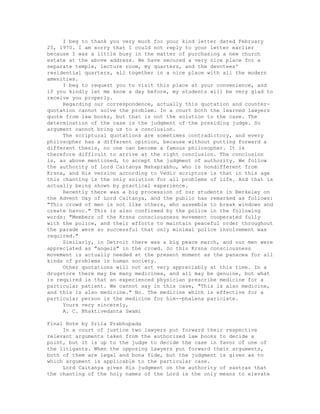
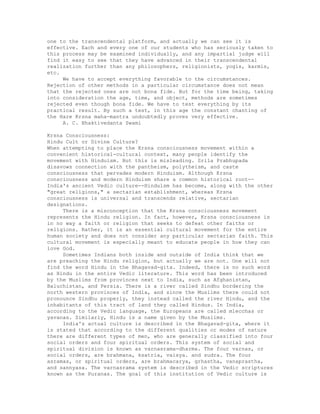
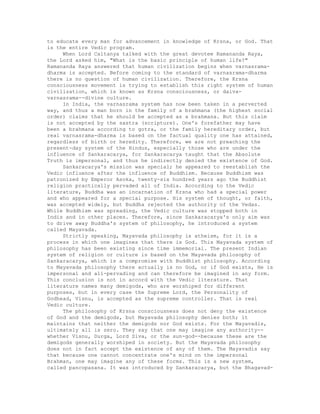
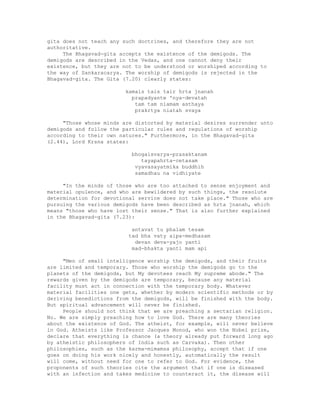
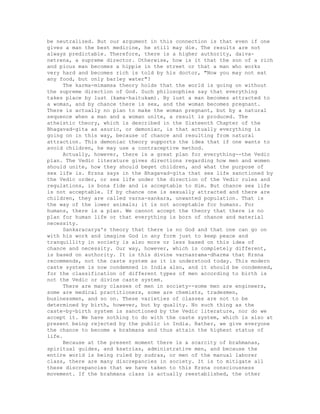
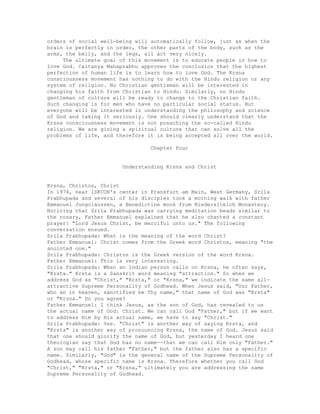
![Father Emmanuel: Yes, if we speak of God's actual name, then we must
say, "Christos." In our religion, we have the Trinity: the Father, Son,
and the Holy Spirit. We believe we can know the name of God only by
revelation from the Son of God. Jesus Christ revealed the name of the
father, and therefore we take the name Christ as the revealed name of
God.
Srila Prabhupada: Actually, it doesn't matter--Krsna or Christ--the name
is the same. The main point is to follow the injunctions of the Vedic
scriptures that recommend chanting the name of God in this age. The
easiest way is to chant the maha-mantra: Hare Krsna, Hare Krsna, Krsna
Krsna, Hare Hare/ Hare Rama, Hare Rama, Rama Rama, Hare Hare. Rama and
Krsna are names of God, and Hare is the energy of God. So when we chant
the maha-mantra, we address God together with His energy. This energy is
of two kinds, the spiritual and the material. At present we are in the
clutches of the material energy. Therefore we pray to Krsna that He may
kindly deliver us from the service of the material energy and accept us
into the service of the spiritual energy. That is our whole philosophy.
Hare Krsna means, "O energy of God, O God [Krsna], please engage me in
Your service." It is our nature to render service. Somehow or other we
have come to the service of material things, but when this service is
transformed into the service of the spiritual energy, then our life is
perfect. To practice bhakti-yoga [loving service to God] means to become
free from designations like "Hindu," "Muslim," "Christian," this or
that, and simply to serve God. We have created Christian, Hindu, and
Muhammadan religions, but when we come to a religion without
designations, in which we don't think we are Hindus or Christians or
Muhammadans, then we can speak of pure religion, or bhakti.
Father Emmanuel: Mukti?
Srila Prabhupada: No, bhakti. When we speak of bhakti, mukti [liberation
from material miseries] is included. Without bhakti there is no mukti,
but if we act on the platform of bhakti, then mukti is included. We
learn this from the Bhagavad-gita (14.26):
mam ca yo 'vyabhicarena
bhakti-yogena sevate
sa gunan samatityaitan
brahma-bhuyaya kalpate
"One who engages in full devotional service, who does not fall down
under any circumstance, at once transcends the modes of material nature
and thus comes to the level of Brahman."
Father Emmanuel: Is Brahman Krsna?
Srila Prabhupada: Krsna is Parabrahman. Brahman is realized in three
aspects: as impersonal Brahman, as localized Paramatma, and as personal
Brahman. Krsna is personal, and He is the Supreme Brahman, for God is
ultimately a person. In the Srimad-Bhagavatam (1.2.11), this is
confirmed:
vadanti tat tattva-vidas
tattvam yajjnanam advayam
brahmeti paramatmeti
bhagavan iti sabdyate](https://image.slidesharecdn.com/scienceofself-realization-180727182233/85/Science-of-self-realization-79-320.jpg)

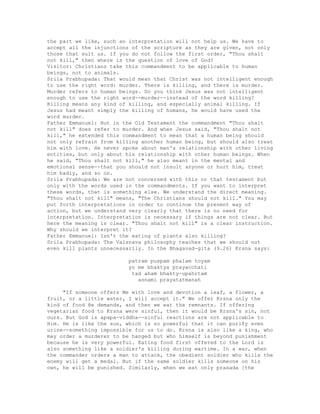
![remnants of food offered to Krsna], we do not commit any sin. This is
confirmed in the Bhagavad-gita (3.13):
yajna-sistasinah santo
mucyante sarva-kilbisaih
bhunjate te tv agham papa
ye pacanty atma-karanat
"The devotees of the Lord are released from all kinds of sins
because they eat food that is first offered for sacrifice. Others, who
prepare food for personal sense enjoyment, verily eat only sin."
Father Emmanuel: Krsna cannot give permission to eat animals?
Srila Prabhupada: Yes--in the animal kingdom. But the civilized human
being, the religious human being, is not meant to kill and eat animals.
If you stop killing animals and chant the holy name Christ, everything
will be perfect. I have not come to teach you, but only to request you
to please chant the name of God. The Bible also demands this of you. So
let's kindly cooperate and chant, and if you have a prejudice against
chanting the name Krsna, then chant "Christos" or "Krsta"--there is no
difference. Sri Caitanya said: namnam akari bahudha nija-sarva-saktih.
"God has millions and millions of names, and because there is no
difference between God's name and Himself, each one of these names has
the same potency as God." Therefore, even if you accept designations
like "Hindu," "Christian," or "Muhammadan," if you simply chant the name
of God found in your own scriptures, you will attain the spiritual
platform. Human life is meant for self-realization--to learn how to love
God. That is the actual beauty of man. Whether you discharge this duty
as a Hindu, a Christian, or a Muhammadan, it doesn't matter--but
discharge it!
Father Emmanuel: I agree.
Srila Prabhupada [pointing to a string of 108 meditation beads]: We
always have these beads, just as you have your rosary. You are chanting,
but why don't the other Christians also chant? Why should they miss this
opportunity as human beings? Cats and dogs cannot chant, but we can,
because we have a human tongue. If we chant the holy names of God, we
cannot lose anything; on the contrary, we gain greatly. My disciples
practice chanting Hare Krsna constantly. They could also go to the
cinema or do so many other things, but they have given everything up.
They eat neither fish nor meat nor eggs, they don't take intoxicants,
they don't drink, they don't smoke, they don't partake in gambling, they
don't speculate, and they don't maintain illicit sexual connections. But
they do chant the holy name of God. If you would like to cooperate with
us, then go to the churches and chant, "Christ," "Krsta," or "Krsna."
What could be the objection?
Father Emmanuel: There is none. For my part, I would be glad to join
you.
Srila Prabhupada: No, we are speaking with you as a representative of
the Christian church. Instead of keeping the churches closed, why not
give them to us? We would chant the holy name of God there twenty-four
hours a day. In many places we have bought churches that were
practically closed because no one was going there. In London I saw
hundreds of churches that were closed or used for mundane purposes. We
bought one such church in Los Angeles. It was sold because no one came
there, but if you visit this same church today, you will see thousands](https://image.slidesharecdn.com/scienceofself-realization-180727182233/85/Science-of-self-realization-82-320.jpg)
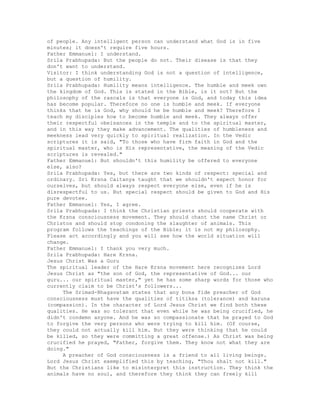
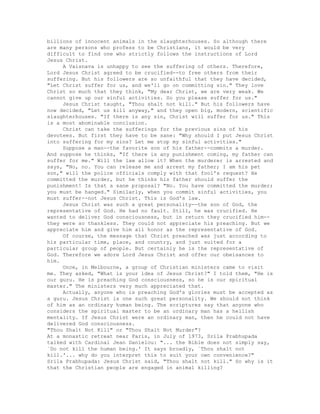
![Cardinal Danielou: Certainly in Christianity it is forbidden to kill,
but we believe that there is a difference between the life of a human
being and the life of the beasts. The life of a human being is sacred
because man is made in the image of God; therefore, to kill a human
being is forbidden.
Srila Prabhupada: But the Bible does not simply say, "Do not kill the
human being." It says broadly, "Thou shalt not kill."
Cardinal Danielou: We believe that only human life is sacred.
Srila Prabhupada: That is your interpretation. The commandment is "Thou
shalt not kill."
Cardinal Danielou: It is necessary for man to kill animals in order to
have food to eat.
Srila Prabhupada: No. Man can eat grains, vegetables, fruits, and milk.
Cardinal Danielou: No flesh?
Srila Prabhupada: No. Human beings are meant to eat vegetarian food. The
tiger does not come to eat your fruits. His prescribed food is animal
flesh. But man's food is vegetables, fruits, grains, and milk products.
So how can you say that animal killing is not a sin?
Cardinal Danielou: We believe it is a question of motivation. If the
killing of an animal is for giving food to the hungry, then it is
justified.
Srila Prabhupada: But consider the cow: we drink her milk; therefore,
she is our mother. Do you agree?
Cardinal Danielou: Yes, surely.
Srila Prabhupada: So if the cow is your mother, how can you support
killing her? You take the milk from her, and when she's old and cannot
give you milk, you cut her throat. Is that a very humane proposal? In
India those who are meat-eaters are advised to kill some lower animals
like goats, pigs, or even buffalo. But cow killing is the greatest sin.
In preaching Krsna consciousness we ask people not to eat any kind of
meat, and my disciples strictly follow this principle. But if, under
certain circumstances, others are obliged to eat meat, then they should
eat the flesh of some lower animal. Don't kill cows. It is the greatest
sin. And as long as a man is sinful, he cannot understand God. The human
being's main business is to understand God and to love Him. But if you
remain sinful, you will never be able to understand God--what to speak
of loving Him.
Cardinal Danielou: I think that perhaps this is not an essential point.
The important thing is to love God. The practical commandments can vary
from one religion to the next.
Srila Prabhupada: So, in the Bible God's practical commandment is that
you cannot kill; therefore killing cows is a sin for you.
Cardinal Danielou: God says to the Indians that killing is not good, and
he says to the Jews that...
Srila Prabhupada: No, no. Jesus Christ taught, "Thou shalt not kill."
Why do you interpret this to suit your own convenience?
Cardinal Danielou: But Jesus allowed the sacrifice of the Paschal Lamb.
Srila Prabhupada: But he never maintained a slaughterhouse.
Cardinal Danielou: [Laughs.] No, but he did eat meat.
Srila Prabhupada: When there is no other food, someone may eat meat in
order to keep from starving. That is another thing. But it is most
sinful to regularly maintain slaughterhouses just to satisfy your
tongue. Actually, you will not even have a human society until this
cruel practice of maintaining slaughterhouses is stopped. And although](https://image.slidesharecdn.com/scienceofself-realization-180727182233/85/Science-of-self-realization-85-320.jpg)

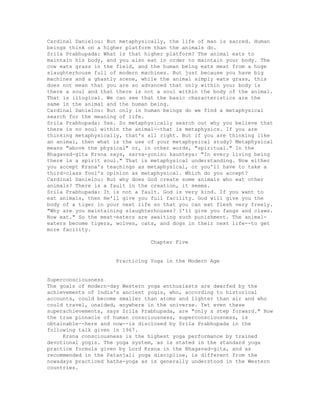
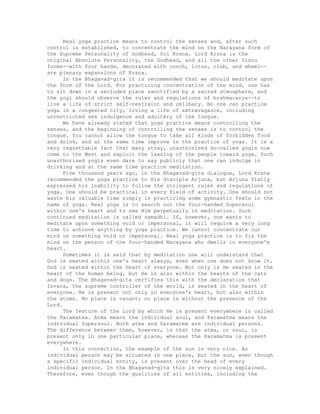
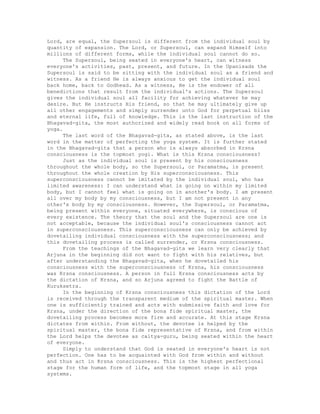
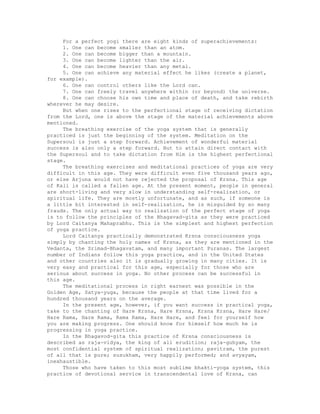
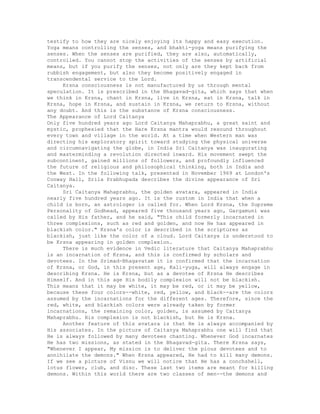
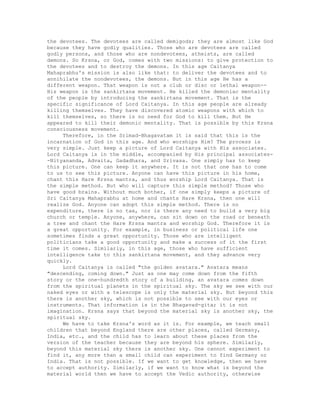
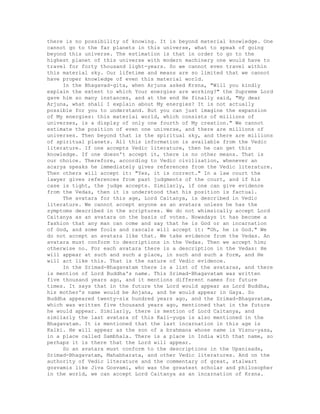
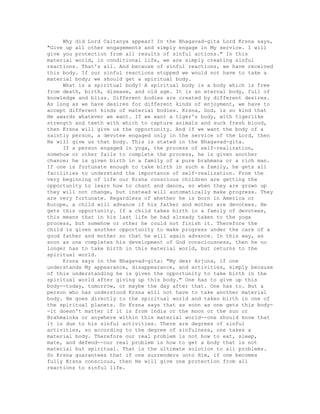
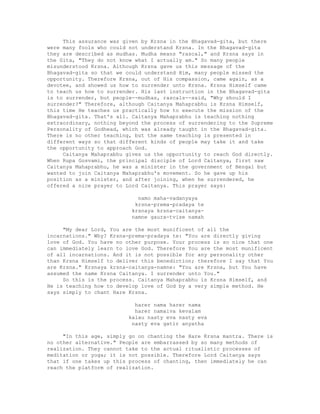
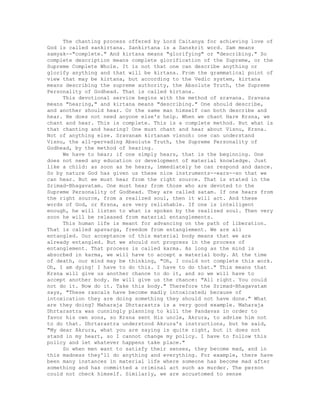
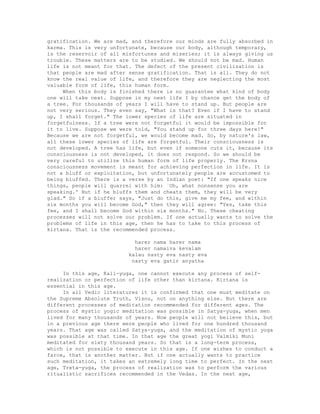
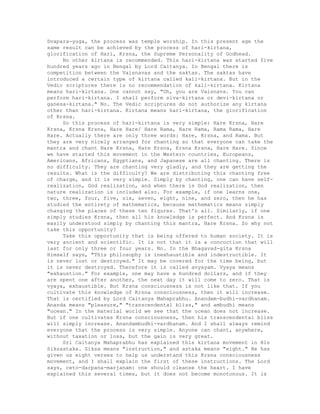
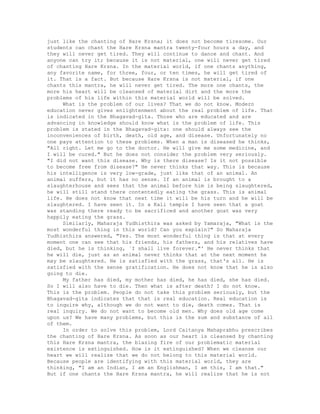
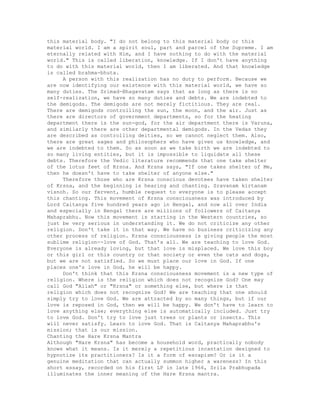
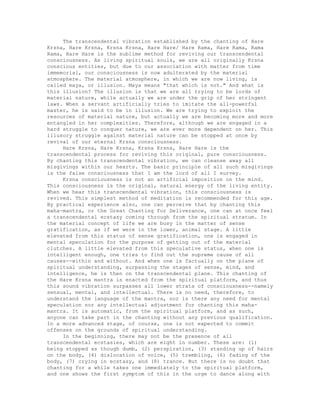
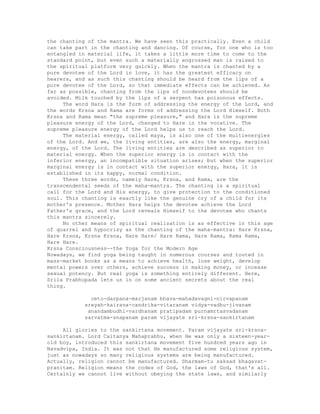
![we cannot live without obeying the laws of God. And in the Bhagavad-gita
(4.7) the Lord says that whenever there are discrepancies in the
prosecution of religious activities (yada yada hi dharmasya glanir
bhavati bharata) and there is a predominance of irreligious activities
(abhyutthanam adharmasya), at that time I (Krsna) appear (tadatmanam
srjamy aham). And in the material world we can see the same principle
demonstrated, for whenever there is disobedience of state laws, there is
the advent of some particular state officer or policeman to "set things
right."
Lord Caitanya Mahaprabhu is worshiped by the Gosvamis. There were
six Gosvamis: Rupa Gosvami, Sanatana Gosvami, Raghunatha Bhatta Gosvami,
Jiva Gosvami, Gopala Bhatta Gosvami, and Sri Raghunatha dasa Gosvami.
There are three meanings of go. Go means "land," go means "cow,"and go
means "senses." And svami means "master." So gosvami means that they
were masters of the senses. When one becomes master of the senses, or
gosvami, he can make progress in spiritual life. That is the real
meaning of svami. Svami means that one is not servant of the senses, but
master of them.
One of these six Gosvamis, Rupa Gosvami, was the head, and he
compiled a nice verse in honor of Lord Caitanya Mahaprabhu. He says:
anarpita-carim cirat karunayavatirnah kalau
samarpayitum unnatojjvala-rasam sva-bhakti-sriyam
harih purata-sundara-dyuti-kadamba-sandipitah
sada hrdaya-kandare sphuratu vah saci-nandanah
(Caitanya-caritamrta, Adi 1.4)
Kalau means this age, this age of Kali, the Iron Age, which is very
much contaminated, an age of quarrel and disagreement. Rupa Gosvami says
that in this age of Kali, when everything is disagreement and quarrel,
"You have descended to offer the highest love of God." Samarpayitum
unnatojjvala-rasam: and not only the topmost, but a very brilliant rasa,
or transcendental humor. Purata-sundara-dyuti: Your complexion is just
like gold, like the luster of gold. "You are so kind that I bless
everyone [the Gosvamis can bless because they are masters of the senses]
that this form of the Lord, Lord Caitanya Mahaprabhu, may always remain
dancing in everyone's heart."
When Rupa Gosvami first met Lord Caitanya Mahaprabhu at Prayaga,
Lord Caitanya was chanting and dancing in the street, "Hare Krsna, Hare
Krsna." At that time also Rupa Gosvami offered one prayer. Namo maha-
vadanyaya krsna-prema-pradaya te: "Oh, You are the most munificent of
all incarnations because You are distributing love of Godhead." Krsna-
prema-pradaya te/ krsnaya krsna-caitanya-namne gaura-tvise namah: "You
are Krsna Himself, because if You were not Krsna You could not
distribute krsna-prema, or love of God, for love of Krsna is not so
easily acquired. But You are distributing this love freely to everyone."
In this way the sankirtana movement was inaugurated in Bengal,
India, in Navadvipa. In this sense, the Bengalis are very fortunate that
in their country this movement was inaugurated by Lord Caitanya, who
predicted:
prthivite ache yata nagaradi grama
sarvatra pracara haibe mora nama](https://image.slidesharecdn.com/scienceofself-realization-180727182233/85/Science-of-self-realization-103-320.jpg)
!["In all the villages and towns all over the world, everywhere, this
sankirtana movement will be preached." That is His prediction.
So by the grace of Lord Caitanya, this movement is already
introduced in the Western countries, beginning from New York. Our
sankirtana movement was first introduced in New York in 1966. At that
time I came and began to chant this Hare Krsna mantra in Tompkins
Square. I was chanting there for three hours with a small mrdanga
(drum), and these American boys assembled and gradually joined, and so
it is increasing. First of all it was started in a New York storefront,
26 Second Avenue, then we started our branches in San Francisco,
Montreal, Boston, Los Angeles, Buffalo, Columbus. We now [1970] have
twenty-four branches, including one in London and one in Hamburg. In
London they are all American boys and girls, and they are preaching.
They are not sannyasis, nor are they Vedantists, nor Hindus, nor
Indians, but they have taken this movement very seriously. Even in the
London Times there was an article headlined, "Krsna Chant Startles
London." So we have many in the movement now. All my disciples, at least
in this country, are Americans and Europeans. They are chanting,
dancing, and distributing a magazine, Back to Godhead. Now we have
published many books--the Srimad-Bhaga vatam, Bhagavad-gita As It Is,
Teachings of Lord Caitanya, and Isopanisad. It is not that this movement
is simply a sentimental movement. Don't think that these boys are
dancing out of some religious sentiment or fanaticism. No. We have the
highest philosophical and theosophical background.
As an illustration, let us consider Caitanya Mahaprabhu. While He
was preaching, He went to Benares, the seat of Mayavadi sannyasis. The
followers of Sankaracarya are mostly seen in Benares. When Caitanya
Mahaprabhu was there, He was chanting and dancing. Some of the people
very much appreciated this, and so He quickly became famous. One
prominent sannyasi, Prakasananda Sarasvati, leader of many thousands of
Mayavadi sannyasis, was informed: "Oh, from Bengal one young sannyasi
has come. He is so nicely chanting and dancing." Prakasananda Sarasvati
was a great Vedantist, and he did not like the idea. He said, "Oh, he is
a pseudo sannyasi. He is chanting and dancing, and this is not the
business of a sannyasi. A sannyasi should always engage himself in the
study of philosophy and the Vedanta."
Then one of the devotees who did not like the remarks of
Prakasananda Sarasvati came back and informed Lord Caitanya that He was
being criticized. So the devotee arranged a meeting of all the
sannyasis, and there was a philosophical discussion on the Vedanta
between Prakasananda Sarasvati and Lord Caitanya Mahaprabhu. These
accounts and philosophical discussions are given in our Teachings of
Lord Caitanya. It is remarkable that Prakasananda himself with all his
disciples became Vaisnavas.
Similarly, Caitanya Mahaprabhu had a great discussion with
Sarvabhauma Bhattacarya, the greatest logician of that time, who was
also Mayavadi, impersonalist, and he was also converted. So Caitanya
Mahaprabhu's movement is not mere sentimentalism. There is a very rich
background if one wants to understand this sankirtana movement through
philosophy and logic. There is ample opportunity, for this movement is
based on science and on the authority of the Vedas. But it is all
simplified. That is the beauty of this movement. Whether one is a great
scholar or philosopher or a child, he can take part without any
difficulty. Other systems of self-realization, the jnana process or yoga](https://image.slidesharecdn.com/scienceofself-realization-180727182233/85/Science-of-self-realization-104-320.jpg)
![process, are also recognized, but it is not possible to practice them in
this age. That is the verdict of the Vedas:
krte yad dhyayato visnum
tretayam yajato makhaih
dvapare paricaryayam.
kalau tad dhari-kirtanat
(Srimad-Bhagavatam 12.3.52)
In the Satya-yuga, the Golden Age, it was possible to execute the
meditation process. For instance, Valmiki Muni meditated for sixty
thousand years to get perfection. But where is our old age? Besides
that, for the meditation process, as described in the Bhagavad-gita, one
has to select a secluded place, he has to execute it alone, he has to
sit down in a rigid posture, he has to lead a life of complete celibacy,
and so on. There are many rules and regulations. Thus astanga-yoga
meditation is not possible. If one is satisfied by imitating, that is a
different thing, but if one wants perfection, then he has to execute all
the eight stages of astanga-yoga. If this is not possible, then it is a
waste of time.
What is the ultimate goal of the yoga process or meditation?
Contact with the Supreme, the Supersoul, the Supreme Lord, is the aim
and object of all yoga processes. Similarly, philosophical research, the
jnana process, also aims at understanding the Supreme Brahman. These are
recognized processes, undoubtedly, but according to authoritative
description, they are not practical in this Iron Age of Kali. Therefore
one has to take to this process of hari-kirtana. Anyone can practice
without prequalification. One doesn't have to study philosophy or
Vedanta. This was the purport of Lord Caitanya's meeting with
Prakasananda Sarasvati.
When the Vedanta philosophy was thoroughly discussed between Lord
Caitanya and Prakasananda Sarasvati, Prakasananda Sarasvati first of all
asked Caitanya Mahaprabhu, "I understand that You were a very good
scholar in Your early life. [Lord Caitanya was actually a very great
scholar. His name was Nimai Pandita, and at the age of sixteen He
defeated a great scholar from Kashmir, Kesava Kasmiri.] And I understand
that You are a great Sanskrit scholar, and that especially in logic You
are a very learned scholar. You were also born in a brahmana family, and
now You are a sannyasi. How is it that You are chanting and dancing and
not reading the Vedanta?" This was the first question asked by
Prakasananda Sarasvati, and Lord Caitanya replied, "Yes, the reason is
that when I was initiated by My spiritual master, he said that I am fool
number one. `You don't discuss the Vedanta,' he told Me. `You will
simply spoil Your time. Just take to this chanting of Hare Krsna, and
You will be successful.' " That was his reply. Of course, Caitanya
Mahaprabhu was not a fool, and certainly the Vedanta is not for fools.
One needs sufficient education, and one must attain a certain status
before he can understand the Vedanta. In each and every word there are
volumes of meanings, and there are many commentaries by Sankaracarya and
Ramanujacarya, huge volumes in Sanskrit. But how can we understand
Vedanta? It is not possible. It may be possible for one person or two
persons to understand, but for the mass of people it is not possible.
Nor is it possible to practice yoga. Therefore, if one takes to Caitanya
Mahaprabhu's method, chanting Hare Krsna, the first installment of gain](https://image.slidesharecdn.com/scienceofself-realization-180727182233/85/Science-of-self-realization-105-320.jpg)
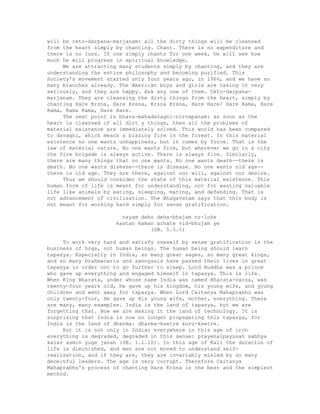
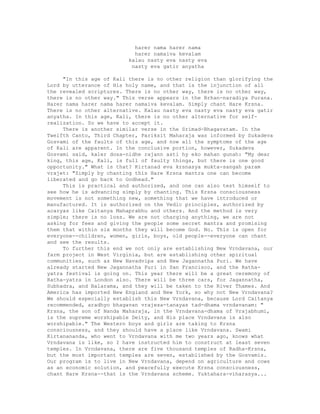
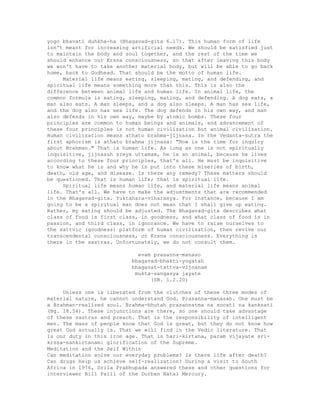
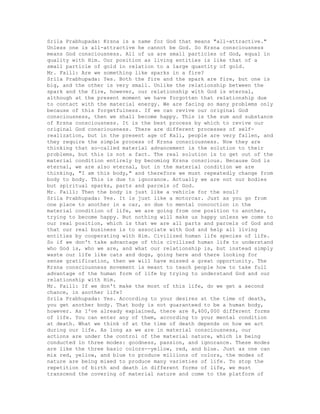
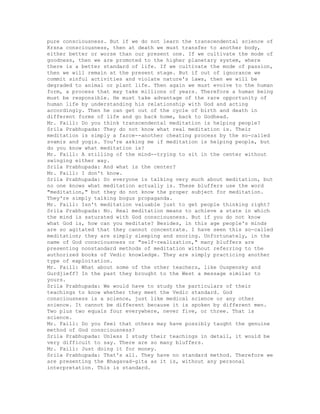
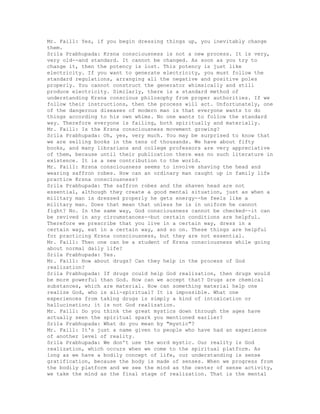
![platform. From the mental platform we may come to the intellectual
platform, and from the intellectual platform we can rise to the
transcendental platform. Finally we can rise above even the
transcendental platform and come to the mature, spiritual platform.
These are the stages of God realization. However, in this age, because
people are so fallen, the sastras [scriptures] give the special
recommendation that people come directly to the spiritual platform by
chanting the holy names of God: Hare Krsna, Hare Krsna, Krsna Krsna,
Hare Hare/ Hare Rama, Hare Rama, Rama Rama, Hare Hare. If we cultivate
this practice on the spiritual platform, then immediately we can realize
our spiritual identity. Then the process of God realization becomes
successful very quickly.
Mr. Faill: Today a lot of people are saying that we must look inward for
the truth rather than outward into the world of the senses.
Srila Prabhupada: Looking inward means knowing that you are a spirit
soul. Unless you understand that you are not the body but a soul, there
is no question of looking inward.
First we have to study, "Am I this body, or am I something within
this body?" Unfortunately, this subject is not taught in any school,
college, or university. Everyone is thinking, "I am this body." For
example, in this country people everywhere are thinking, "I am South
African, they are Indian, they are Greek," and so on. Actually, everyone
in the whole world is in the bodily conception of life. Krsna
consciousness starts when one is above this bodily conception.
Mr. Faill: So the recognition of the spiritual spark comes first?
Srila Prabhupada: Yes. Recognizing the existence of the spirit soul
within the body is the first step. Unless one understands this simple
fact, there is no question of spiritual advancement.
Mr. Faill: Is it a question of just understanding it intellectually?
Srila Prabhupada: in the beginning, yes. There are two departments of
knowledge: theoretical and practical. First one must learn spiritual
science theoretically; then, by working on that spiritual platform, one
comes to the point of practical realization.
Unfortunately, today almost everyone is in the darkness of the
bodily conception of life. Therefore this movement is very important,
because it can lift civilized men out of that darkness. As long as they
are in the bodily conception of life, they are no better than animals.
"I am a dog," "I am a cat," "I am a cow." Animals think like this. As
soon as someone passes, a dog will bark, thinking, "I am a dog. I have
been appointed here as watchdog." Similarly, if I adopt the dog's
mentality and challenge foreigners--"Why have you come to this country?
Why have you come to my jurisdiction?"--then what is the difference
between the dog and me?
Mr. Faill: There is none. To change the subject a little, is it
necessary to follow certain eating habits to practice spiritual life?
Srila Prabhupada: Yes, the whole process is meant to purify us, and
eating is part of that purification. I think you have a saying, "You are
what you eat," and that's a fact. Our bodily constitution and mental
atmosphere are determined according to how and what we eat. Therefore
the sastras recommend that to become Krsna conscious, you should eat
remnants of food left by Krsna. If a tuberculosis patient eats something
and you eat the remnants, you will be infected with tuberculosis.
Similarly, if you eat krsna-prasadam, then you will be infected with
Krsna consciousness. Thus our process is that we don't eat anything](https://image.slidesharecdn.com/scienceofself-realization-180727182233/85/Science-of-self-realization-112-320.jpg)
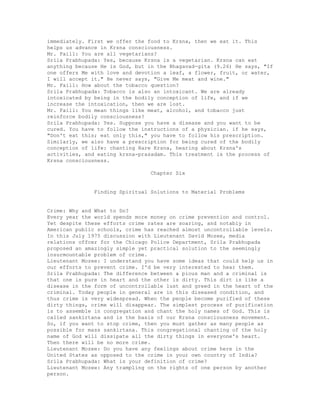
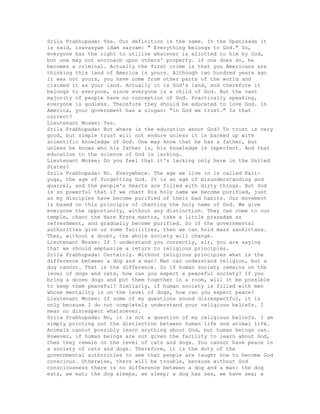
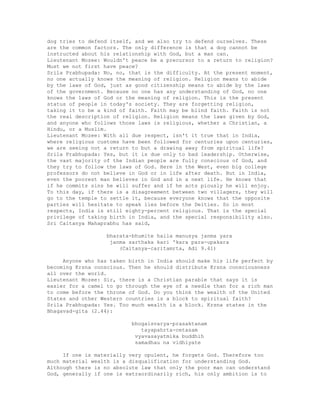
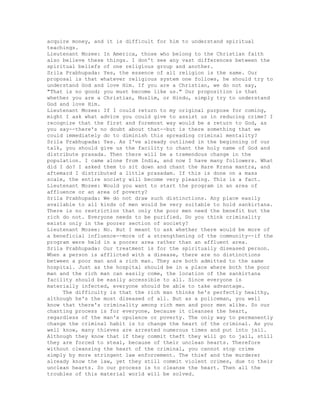
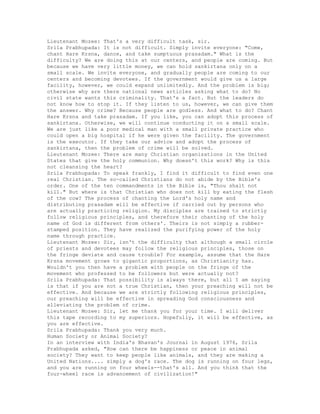
![Interviewer: The first question is this: Is the influence of religion on
the wane? And if so, does this factor account for the increase in
corruption and the widespread deterioration of moral values?
Srila Prabhupada: Yes, religion is on the wane. This is predicted in the
Srimad-Bhagavatam (12.2.1):
tatas canudinam dharmah
satyam saucam ksama daya
kalena balina rajan
nanksyaty ayur balam smrtih
"In the Kali-yuga [the present age of quarrel and hypocrisy] the
following things will diminish: religion, truthfulness, cleanliness,
mercy, duration of life, bodily strength, and memory."
These are human assets, which make the human being distinct from
the animal. But these things will decline. There will be no mercy, there
will be no truthfulness, memory will be short, and the duration of life
will be cut short. Similarly, religion will vanish. That means that
gradually we will come to the platform of animals.
Interviewer: Religion will vanish? We'll become animals?
Srila Prabhupada: Especially when there is no religion, it is simply
animal life. Any common man can distinguish that the dog does not
understand what religion is. The dog is also a living being, but he is
not interested in understanding the Bhagavad-gita or the Srimad-
Bhagavatam. He is not interested. That is the distinction between man
and dog: the animal is not interested.
So when the human beings become uninterested in religious things,
then they are animals. And how can there be happiness or peace in animal
society? They want to keep people like animals, and they are making a
United Nations. How is it possible? United animals, society for united
animals? These things are going on.
Interviewer: Do you see any hopeful signs?
Srila Prabhupada: At least they have detected that religion is
declining. That is good. "Declining" means they are going to be animals.
In logic it is said that man is a rational animal. When the rationality
is missing, then he is simply an animal, not a human being. In human
society either you become Christian, Muhammadan, Hindu, or Buddhist; it
doesn't matter. There must be some system of religion. Human society
without religion is animal society. This is a plain fact. Why are people
so unhappy now? Because there is no religion. They are neglecting
religion.
One gentleman has written me that Tolstoy once said, "Unless
dynamite is put underneath the church, there cannot be any peace." Even
now the Russian government is very strictly against God consciousness,
because they think that religion has spoiled the whole social
atmosphere.
Interviewer: It seems there could be some truth in that.
Srila Prabhupada: The religious system might have been misused, but that
does not mean that religion should be avoided. Real religion should be
taken. It does not mean that because religion has not been properly
executed by the so-called priests, religion should be rejected. If my
eye is giving me some trouble on account of a cataract, it does not mean
that the eye should be plucked out. The cataract should be removed. That
is Krsna consciousness.](https://image.slidesharecdn.com/scienceofself-realization-180727182233/85/Science-of-self-realization-118-320.jpg)
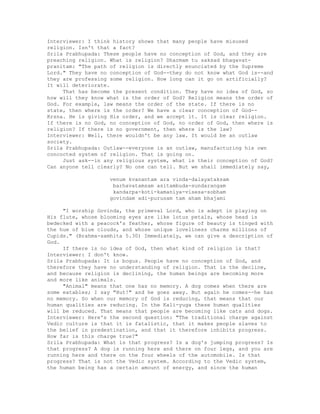
![being has better consciousness than the animals, the energy of the human
beings is more valuable than the energy of the animals.
Interviewer: Probably no one would dispute that the human being has more
freedom or, I suppose, responsibility than the animals.
Srila Prabhupada: So human energy should be utilized for spiritual
advancement, not that the energy should be employed to compete with the
dog. The saintly person is not busy like the dog. Today people think
that "dog-ness" is life, but actual life is spiritual progress.
Therefore, the Vedic literature says,
tasyaiva hetoh prayateta kovido
na labhyate yad bhramatam upary adhah
tal labhyate duhkha vad anyatah sukham
kalena sarvatra gabhira-ramhasa
"Persons who are actually intelligent and philosophically inclined
should endeavor only for that purposeful end which is not obtainable
even by wandering from the topmost planet [Brahmaloka] down to the
lowest planet [Patala]. As far as happiness derived from sense enjoyment
is concerned, it can be obtained automatically in the course of time,
just as in the course of time we obtain miseries, even though we do not
desire them." (Srimad-Bhagavatam 1.5.18)
Interviewer: Could you explain that a little further?
Srila Prabhupada: The human being should exert his energy for that thing
which he did not get in many, many lives. In many, many lives the soul
has been in the forms of dogs, or demigods, or cats, birds, beasts, and
many others. There are 8,400,000 different types of bodies. So this
transmigration of the soul is going on. The business in every case is
sense gratification.
Interviewer: Which means?
Srila Prabhupada: For example, the dog is busy for sense gratification:
where is food, where is shelter, where is a female, where is defense?
The man is also doing the same business, in different ways. This
business is going on, life after life. Even a small insect is trying for
the same thing. Birds, beasts, fish--everywhere the same struggle is
going on. Where is food, where is sex, where is shelter, and how to
defend? The Vedic literature says that these things we have done for
many, many lives, and that if we don't get out of this struggle for
existence, we will have to do them again for many, many lives.
Interviewer: I'm beginning to see.
Srila Prabhupada: Yes, so these things should be stopped. Therefore,
Prahlada Maharaja makes this statement:
sukham aindriyakam daitya
deha-yogena dehinam
sarvatra labhyate daivad
yatha duhkham ayatnatah
"My dear friends born of demoniac families, the happiness perceived
with reference to the sense objects by contact with the body can be
obtained in any form of life, according to one's past fruitive
activities. Such happiness is automatically obtained without endeavor,
just as we obtain distress." (SB. 7.6.3)](https://image.slidesharecdn.com/scienceofself-realization-180727182233/85/Science-of-self-realization-120-320.jpg)
![A dog has a body, and I have a body. So, my sex pleasure and the
dog's sex pleasure--there is no difference. The pleasure derived out of
sex is the same. A dog is not afraid of having sex pleasure on the
street before everyone, and we hide it. That's all. People are thinking
that to have sex pleasure in a nice apartment is advanced. However, that
is not advanced. And they are making a dog's race for this so-called
advancement. People do not know that according to whatever kind of body
one has acquired, the pleasure is already stored up.
Interviewer: What do you mean, "the pleasure is already stored up"?
Srila Prabhupada: That is called destiny. A pig has got a certain type
of body, and his eatable is the stool. You cannot change it. The pig
will not like to eat halvah [a dessert made of sweetened, buttery
toasted grains]. It is not possible. Because he has a particular type of
body, he must eat like that. Can any scientist improve the standard of
living of the pig?
Interviewer: I doubt it.
Srila Prabhupada: Therefore, Prahlada Maharaja says that it is already
stored up. The pleasure is basically the same, but a little different
according to the body. The uncivilized man in the jungle is having the
same thing.
Now people are thinking that civilization means constructing
skyscraper buildings. But Vedic civilization says, No, that is not
advancement. The real advancement of human life is self-realization, how
much you have realized your self. Not that you have constructed
skyscraper buildings.
Interviewer: But wouldn't what you're saying make sense to most people?
Srila Prabhupada: Sometimes people misunderstand. In a high court, a
judge is sitting soberly, apparently doing nothing, and he is getting a
high salary. Someone else is thinking, "I am working so hard in the same
court, rubber-stamping--and not getting one tenth the salary of the
judge." He is thinking, "I am so busy, working so hard, and I am not
getting as good a salary as the man who is just sitting on the bench."
The situation is like that: the Vedic civilization is meant for self-
realization, not for a dog's race.
Interviewer: Still, isn't it usually considered honorable to work hard,
to struggle, and eventually "get ahead" in life?
Srila Prabhupada: The karmis, fruitive workers, have been described in
the Bhagavad-gita as mudhas, asses. Why are they compared to the asses?
Because the ass works very hard with loads on his back, and in return
his master gives him only a little morsel of grass. He stands at the
door of the washerman and eats grass while again the washerman loads his
back. He doesn't have the sense to think, "If I go out of the cottage of
the washerman, I can get grass anywhere. Why am I carrying so much?"
Interviewer: That brings to mind some people I know.
Srila Prabhupada: The fruitive worker is like that. He is very busy in
the office, and if you want to see him he will say, "I am very busy." So
what is the result of your being so busy? He takes two pieces of toast
and one cup of tea. And for this purpose you are so busy? He does not
know why he is busy. In the account books he will find that the balance
was one million dollars and now it has become two million. He is
satisfied with that, but he will take only two pieces of toast and one
cup of tea, and still he will work very hard. That is what is meant by
karmi. Asses--they work like asses, without any aim in life.](https://image.slidesharecdn.com/scienceofself-realization-180727182233/85/Science-of-self-realization-121-320.jpg)
![But Vedic civilization is different. The accusation is not correct-
-people in Vedic civilization are not at all lazy. They are busy for a
higher subject matter. Prahlada Maharaja stresses that this busy-ness is
so important that it should begin from one's very childhood. Kaumara
acaret prajnah: one should not lose a second's time. That is Vedic
civilization. The asses see, "These men are not working like I am"--like
dogs and asses--and they consider that we are escaping. Yes, escaping
your fruitless endeavor. The Vedic civilization is meant for self-
realization.
Interviewer: Could you give us more of an idea what the Vedic
civilization is like?
Srila Prabhupada: The Vedic civilization begins from the varnasrama
system. In the varnasrama system there is this arrangement: brahmanas
[intellectuals, advisors], ksatriyas [administrators], vaisyas
[merchants, farmers], sudras [workers], brahmacaris [celibate students],
grhasthas [householders], vanaprasthas [retired married people], and
sannyasis [renounced monks].
The ultimate goal is that Krsna, the Supreme Lord, should be
worshiped. So if you worship Krsna, then you fulfill all your
occupational duties, either as a brahmana, ksatriya, vaisya, sudra,
brahmacari, anything. Take to it immediately--take to Krsna
consciousness. This is so important.
Interviewer: If people really knew about a life-style that was more
natural, more fulfilling, what would be the problem? They actually
would, as you say, take to it.
Srila Prabhupada: But they do not know, and therefore there is no
religion, simply a dog's race. The dog is running on four legs, and you
are running on four wheels--that's all. And you think that the four-
wheel race is the advancement of civilization.
Therefore, modern civilization is practically said to do nothing.
Whatever is obtainable by destiny you will get, wherever you are.
Rather, take to Krsna consciousness. The example is given by Prahlada
Maharaja that you do not want anything distasteful and yet it comes upon
you. Similarly, even if you do not want happiness which you are
destined, it will come upon you. You should not waste your energy for
material happiness. You cannot get more material happiness than you are
destined.
Interviewer: How can you be so sure of that?
Srila Prabhupada: How shall I believe it? Because you get some
distressful condition, although you do not want it. For instance,
President Kennedy died by the hand of his own countryman. Who wanted it,
and why did it come? He was a great man, he was protected by so many,
and still he was destined to be killed. Who can protect you?
So if the distressful condition comes upon me by destiny, then the
opposite position--happiness--will also come. Why shall I waste my time
for this rectification? Let me use my energy for Krsna consciousness.
That is intelligent. You cannot check your destiny. Everyone will
experience a certain amount of happiness and a certain amount of
distress. No one is enjoying uninterrupted happiness. That is not
possible.
Just as you cannot check your distress, so you cannot check your
happiness. It will come automatically. So don't waste your time for
these things. Rather, you should utilize your time for advancing in
Krsna consciousness.](https://image.slidesharecdn.com/scienceofself-realization-180727182233/85/Science-of-self-realization-122-320.jpg)
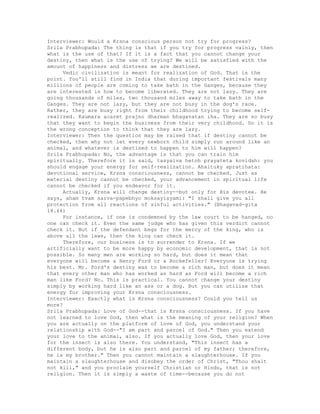
![understand God; you have no love for God, and you are labeling yourself
under some sect, but there is no real religion. That is going on all
over the world.
Interviewer: How can we cure the situation?
Srila Prabhupada: Krsna is the Supreme Personality of Godhead. If you do
not accept that Krsna is the supreme entity, then try to understand.
That is education: there is someone supreme; Krsna is not Indian; He is
God. The sun rises first in India, but that does not mean that the sun
is Indian; similarly, although Krsna appeared in India, now He has come
to the Western countries, through this Krsna consciousness movement.
Altruism: Temporary and Eternal
In 1972, the South Indian state of Andhra Pradesh was stricken by a
severe drought that affected millions. Hoping that the International
Society for Krishna Consciousness would provide assistance, T. L.
Katidia, Secretary of the Andhra Pradesh Relief Fund Committee, wrote to
Srila Prabhupada. Srila Prabhupada responded with this surprising and
edifying letter.
Revered Swamiji,
The residents of the twin cities are happy to have this opportunity
to meet you and your esteemed followers. You may be aware that due to
inadequate rainfall during the last two years and its complete failure
this year, more than half of our state [Andhra Pradesh, a state in
southern India] is in the grip of a serious drought. With a view to
supplement governmental efforts to combat this evil, a Central Voluntary
Organization of citizens drawn from various walks of life has been set
up. The members of this organization surveyed the areas affected by
drought. The situation is pathetic. There are villages where drinking
water is not available for miles. Due to scarcity of fodder, the cattle
owners are parting with their cattle for a nominal price. Many of the
stray cattle are dying away due to unavailability of fodder and water.
The food problem is also very serious. Due to high prices of food grains
on the open market, purchase of grains at market prices is beyond the
reach of poor villagers, with the result that at least five to six
million people are hardly having one meal a day. There are many who are
on the verge of starvation. The entire situation is most pathetic and
heartrending.
We therefore appeal to your revered self to consider how your
Society could best come to the rescue of these millions of souls who are
in unimaginable distress. The Committee would like to suggest that
members of your Society appeal to the bhaktas [devotees] attending your
discourses to contribute their mite to the Andhra Pradesh Relief Fund.
The Committee is prepared to send some of its representatives along
with members of your Society wherever you wish to distribute prasada to
the hungry millions in the state.
As manava-seva is madhava-seva ["Service to man is service to
God"], the Committee is confident that even a little effort by your
gracious Society will go a long way in mitigating the sufferings of
hundreds and thousands of people.
Yours ever in the service of the Lord,
T. L. Katidia, Secretary
Andhra Pradesh Relief fund Committee
Hyderabad, India
My dear Mr. Katidia,](https://image.slidesharecdn.com/scienceofself-realization-180727182233/85/Science-of-self-realization-124-320.jpg)
![Please accept my greetings. With reference to your letter and your
personal interview, I beg to inform you that without pleasing the
Supreme Personality of Godhead, no one can become happy. Unfortunately
people do not know who God is and how to make Him happy. Our Krsna
consciousness movement is therefore meant to present the Supreme
Personality of Godhead directly to the people. As stated in the Srimad-
Bhaga vatam, Seventh Canto, Sixth Chapter: tuste ca tatra kim alabhyam
ananta adye/ kim tair guna-vyatikarad iha ye sva-siddhah.
The idea stated in this verse is that by pleasing the Supreme
Personality of Godhead, we please everyone, and there is no question of
scarcity. Because people do not know this secret of success, they are
making their own independent plans to be happy. However, it is not
possible to achieve happiness in this way. On your letterhead I find
many important men in this country who are interested in relieving the
sufferings of the people, but they should know for certain that without
pleasing the Supreme Personality of Godhead all their attempts will be
futile. A diseased man cannot live simply on the strength of the help of
an expert physician and medicine. If this were so, then no rich man
would ever die. One must be favored by Krsna, the Supreme Personality of
Godhead.
Therefore if you want to perform relief work simply by collecting
funds, I think that it will not be successful. You have to please the
supreme authority, and that is the way to success. For example, due to
the performance of sankirtana here, the rain has begun to fall after a
drought of two years. The last time we performed a Hare Krsna Festival
in Delhi, there was imminent danger of Pakistan's declaring war, and
when a newspaper man approached me for my opinion, I said there must be
fighting because the other party was aggressive. However, because of our
sankirtana movement, India emerged victorious. Similarly, when we held a
festival in Calcutta, the Naxalite [Communist] movement stopped. These
are facts. Through the sankirtana movement we can not only get all
facilities for living, but also at the end can go back home, back to
Godhead. Those who are of a demoniac nature cannot understand this, but
it is a fact.
I therefore request you, as leading members of society, to join
this movement. There is no loss on anyone's part for chanting the Hare
Krsna mantra, but the gain is great. According to Bhagavad-gita (3.21),
what is accepted by leading men is also accepted by common men:
yad yad acarati sresthas
tat tad evetaro janah
sa yat pramanam kurute
lokas tad anuvartate
"Whatever action a great man performs, common men follow in his
footsteps. And whatever standards he sets by exemplary acts, all the
world pursues."
The sankirtana movement of Krsna consciousness is very important.
Therefore, through you I wish to appeal to all the leading men of India
to accept this movement very seriously and give us all facility to
spread this movement throughout the world. Then there will be a very
happy condition, not only in India but all over the world.
Hoping this will meet you in good health,
Your ever well-wisher,](https://image.slidesharecdn.com/scienceofself-realization-180727182233/85/Science-of-self-realization-125-320.jpg)
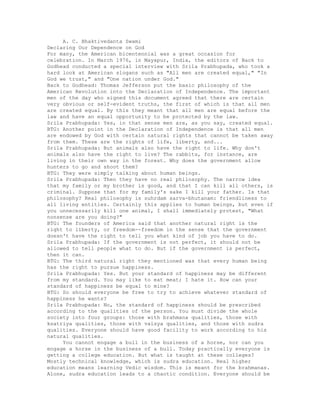
![tested to find out which education he is suited for. Some sudras may be
given technical education, but most sudras should work on the farms.
Because everyone is coming to the cities to get an education, thinking,
"We can get more money," the agriculture is being neglected. Now there
is scarcity because no one is engaged in producing nice foodstuffs. All
these anomalies have been caused by bad government. It is the duty of
the government to see that everyone is engaged according to his natural
qualities. Then people will be happy.
BTG: So if the government artificially puts all men into one class, then
there can't be happiness.
Srila Prabhupada: No, that is unnatural and will cause chaos.
BTG: America's founding fathers didn't like classes, because they'd had
such bad experience with them. Before the revolution, Americans had been
ruled by monarchs, but the monarchs would always become tyrannical and
unjust.
Srila Prabhupada: Because they weren't trained to be saintly monarchs.
In Vedic civilization, boys were trained from the very beginning of life
as first-class brahmacaris [celibate students]. They went to the
gurukula, the school of the spiritual master, and learned self-control,
cleanliness, truthfulness, and many other saintly qualities. The best of
them were later fit to rule the country.
The American Revolution has no special significance. The point is
that when people become unhappy, they revolt. That was done in America,
that was done in France, and that was done in Russia.
BTG: The American revolutionaries said that if a government fails to
rule the people properly, then the people have the right to dissolve
that government.
Srila Prabhupada: Yes. Just as in Nixon's case: they pulled him down.
But if they replace Nixon with another Nixon, then what is the value?
They must know how to replace Nixon with a saintly leader. Because
people do not have that training and that culture, they will go on
electing one Nixon after another and never become happy. People can be
happy. The formula for happiness is there in the Bhagavad-gita. The
first thing they must know is that the land belongs to God. Why do
Americans claim that the land belongs to them? When the first settlers
went to America, they said, "This land belongs to God; therefore we have
a right to live here." So why are they now not allowing others to settle
on the land? What is their philosophy? There are so many overpopulated
countries. The American government should let those people go to America
and should give them facility to cultivate the land and produce grains.
Why are they not doing that? They have taken others' property by force,
and by force they are checking others from going there. What is the
philosophy behind this?
BTG: There is no philosophy.
Srila Prabhupada: Roguism is their philosophy. They take the property by
force, and then they make a law that no one can take another's property
by force. So they are thieves. They cannot restrict God's property from
being occupied by God's sons. America and the other countries in the
United Nations should agree that wherever there is enough land, it may
be utilized by the human society for producing food. The government can
say, "All right, you are overpopulated. Your people can come here. We
will give them land, and they can produce food." We would see a
wonderful result. But will they do that? No. Then what is their](https://image.slidesharecdn.com/scienceofself-realization-180727182233/85/Science-of-self-realization-127-320.jpg)

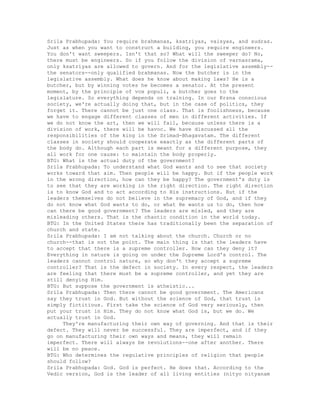
![cetanas cetananam). We are different from Him because He is all-perfect
and we are not. We are very small. We have the qualities of God, but in
very small quantity. Therefore we have only a little knowledge--that's
airplane, but you cannot manufacture a mosquito. God has created the
mosquito's body, which is also an "airplane." And that is the difference
between God and us: we have knowledge, but it is not as perfect as
God's. So the leaders of the government have to consult God; then they
will rule perfectly.
BTG: Has God also devised the most perfect government?
Srila Prabhupada: Oh, yes. The ksatriyas ruled the government in Vedic
times. When there was a war, the king was the first to fight. Just like
your George Washington: he fought when there was a war. But what kind of
president is ruling now? When there is a war, he sits very securely and
telephones orders. He's not fit to be president. When there is war, the
president should be the first to come forward and lead the battle.
BTG: But if man is small and imperfect, how can he execute God's perfect
orders for a perfect government?
Srila Prabhupada: Although you may be imperfect, because you are
carrying out my order, you're becoming perfect. You have accepted me as
your leader, and I accept God as my leader. In this way society can be
governed perfectly.
BTG: So good government means first of all to accept the Supreme Being
as the real ruler of the government?
Srila Prabhupada: You cannot directly accept the Supreme Being. You must
accept the servants of the Supreme Being--the brahmanas or Vaisnavas
[devotees of the Lord]--as your guides. The government men are
ksatriyas--the second class. The ksatriyas should take advice from the
brahmanas or Vaisnavas and make laws accordingly. The vaisyas should
carry out the ksatriyas' orders in practice. And the sudras should work
under these three orders. Then society will be perfect.
The Peace Formula
Amid the antiwar protests of late 1966, Srila Prabhupada put out a
mimeographed leaflet (among the very first of his publications in
America) from his small storefront temple on New York's Second Avenue.
Srila Prabhupada's followers and sympathizers handed this leaflet out by
the thousands on the streets of New York, and later in San Francisco,
Montreal, and other cities. His "Peace Formula" was an entirely new
approach to the antiwar question, and for thousands of Americans, it
provided the perfect solution.
The great mistake of modern civilization is to encroach upon
others' property as though it were one's own and to thereby create an
unnecessary disturbance of the laws of nature. These laws are very
strong. No living entity can violate them. Only one who is Krsna
conscious can easily overcome the stringency of the laws of nature and
thus become happy and peaceful in the world.
As a state is protected by the department of law and order, so the
state of Universe, of which this earth is only an insignificant
fragment, is protected by the laws of nature. This material nature is
one of the different potencies of God, who is the ultimate proprietor of
everything that be. This earth is, therefore, the property of God, but
we, the living entities, especially the so-called civilized human
beings, are claiming God's property as our own, under both an individual
and collective false conception. If you want peace, you have to remove
this false conception from your mind and from the world. This false](https://image.slidesharecdn.com/scienceofself-realization-180727182233/85/Science-of-self-realization-130-320.jpg)
![claim of proprietorship by the human race on earth is partly or wholly
the cause of all disturbances of peace on earth.
Foolish and so-called civilized men are claiming proprietary rights
on the property of God because they have now become godless. You cannot
be happy and peaceful in a godless society. In the Bhagavad-gita Lord
Krsna says that He is the factual enjoyer of all activities of the
living entities, that He is the Supreme Lord of all universes, and that
He is the well-wishing friend of all beings. When the people of the
world know this as the formula for peace, it is then and there that
peace will prevail.
Therefore, if you want peace at all, you will have to change your
consciousness into Krsna consciousness, both individually and
collectively, by the simple process of chanting the holy name of God.
This is a standard and recognized process for achieving peace in the
world. We therefore recommend that everyone become Krsna conscious by
chanting Hare Krsna, Hare Krsna, Krsna Krsna, Hare Hare/ Hare Rama, Hare
Rama, Rama Rama, Hare Hare.
This is practical, simple, and sublime. Four hundred and eighty
years ago this formula was introduced in India by Lord Sri Caitanya, and
now it is available in your country. Take to this simple process of
chanting as above mentioned, realize your factual position by reading
the Bhagavad-gita As It Is, and reestablish your lost relationship with
Krsna, God. Peace and prosperity will be the immediate worldwide result.
Spiritual Communism
In 1971, during his historic visit to the Soviet Union, Srila Prabhupada
was introduced to Professor Grigoriy Kotovsky, head of the India
Department at the U.S.S.R. Academy of Sciences and chairman of the
Indian studies department at the University of Moscow. As they sat
informally in Dr. Kotovsky's office, the spiritual leader and the
communist scholar vigorously discussed topics of mutual concern, and
Srila Prabhupada proposed a radical reformation within modern communism.
Srila Prabhupada: The other day I was reading the paper, Moscow News.
There was a Communist congress, and the President declared, "We are
ready to take others' experience to improve." So I think the Vedic
concept of socialism or communism will much improve the idea of
communism. For example, in a socialistic state the idea is that no one
should starve; everyone must have his food. Similarly, in the Vedic
concept of grhastha [householder] life it is recommended that a
householder see that even a lizard or a snake living in his house should
not starve. Even these lower creatures should be given food, and
certainly all humans should. It is recommended that the grhastha, before
taking his lunch, stand on the road and declare, "If anyone is still
hungry, please come! Food is ready!" If there is no response, then the
proprietor of the household takes his lunch. Modern society takes the
people as a whole as the proprietor of a certain state, but the Vedic
conception is isavasyam idam sarvam--everything is owned by isa, the
supreme controller. Tena tyaktena bhunjithah--you may enjoy what is
allotted to you by Him. Ma grdhah kasya svid dhanam: but do not encroach
upon others' property. This is the Isopanisad--Veda. The same idea is
explained in the different Puranas. There are many good concepts in the
Vedic literature about communism. So I thought that these ideas should
be distributed to your most thoughtful men. Therefore I was anxious to
speak.](https://image.slidesharecdn.com/scienceofself-realization-180727182233/85/Science-of-self-realization-131-320.jpg)
![Prof. Kotovsky: It is interesting that here in our country there is now
great interest in the history of old, old thought. From this point of
view, our Institute translated into Russian and published many literary
monuments of great Indian culture. You will be interested to discover
that we published some of the Puranas and parts of the Ramayana. There
are volumes in Russian of Mahabharata and also a second edition of
Mahabharata, translated in full. We have also published the full
translation of Manu-smrti with Sanskrit commentaries. Interest in these
publications was so great that they sold out in a week. They are now
completely out of stock. It was impossible to get them in the book
market after a month. There is great interest among reading people here
in Moscow and the U.S.S.R. toward ancient Vedic culture, and from this
point of view we published many such books.
Srila Prabhupada: Among these Puranas, the Srimad-Bhagavatam is called
the Maha-Purana.
Prof. Kotovsky: Maha-Purana.
Srila Prabhupada: Yes. We have translated the full text--first we
present the original Sanskrit text, its transliteration, the English
equivalent for each word, then the translation, and then a purport, or
explanation of the verse. In this way, there are eighteen thousand
verses in Srimad-Bhagavatam. We are translating everything literally.
You can see. Each and every verse is being done like that for the whole
Bhagavata Purana. The opinion of the acaryas, the great saintly sages
who are the preachers of the Bhagavata philosophy, is nigama-kaipataror
galitam phalam: this is the ripened fruit of the Vedic desire tree
(Srimad-Bhagavatam 1.1.3). It is accepted by all the Indian scholars,
and Lord Caitanya especially preached this Bhagavatam. So we have the
complete Bhagavatam in its English translation. If you want to see it, I
can show you.
Prof. Kotovsky: It seems to me that in the Moscow and Leningrad
libraries we have nearly all the major texts of ancient Indian culture,
beginning from the Vedas, the original texts in Sanskrit. For instance,
in the Leningrad branch of our Institute there are six or eight editions
of Manu-smrti. This Institute was founded in Imperial Russia in
Leningrad, so in Leningrad we now have a branch of our Institute dealing
mainly with the history of Asiatic culture. You will find here an
account of what is being translated and what studies are being done on
the history of Indian religion and also the state of Indian religion,
Hinduism, in Hindu India today.
Srila Prabhupada: Hinduism is a very complex topic.
Prof. Kotovsky: Oh, yes. [They laugh.] Really, to my understanding, it
is not a religion, from the European point of view; it is a way of life-
-religion, philosophy, a way of life, whatever you want.
Srila Prabhupada: This word Hindu is not a Sanskrit word. It was given
by the Muhammadans. You know that there is a river, Indus, which in
Sanskrit is called Sindhu. The Muhammadans pronounce s as h. Instead of
Sindhu, they made it Hindu. So Hindu is a term that is not found in the
Sanskrit dictionary, but it has come into use. But the real cultural
institution is called varnasrama. There are four varnas (social
divisions)--brahmana, ksatriya, vaisya, and sudra--and four asramas
(spiritual divisions)--brahmacarya, grhastha, vanaprastha, and sannyasa.
According to the Vedic concept of life, unless people take to this
system or institution of four varnas and four asramas, actually they do
not become civilized human beings. One has to take this process of four](https://image.slidesharecdn.com/scienceofself-realization-180727182233/85/Science-of-self-realization-132-320.jpg)
![divisions of social orders and four divisions of spiritual orders; that
is called varnasrama. India's culture is based on this age-old Vedic
system.
Prof. Kotovsky: Varnasrama.
Srila Prabhupada: Varnasrama. And in the Bhagavad-gita--perhaps you have
read the Bhagavad-gita?
Prof. Kotovsky: Yes.
Srila Prabhupada: There, in the Bhagavad-gita (4.13), is the statement
catur-varnyam maya srstam: this system was created by Visnu [God]. So
since varnasrama is a creation of the Supreme, it cannot be changed. It
is prevalent everywhere. It is like the sun. The sun is a creation of
the Supreme. The sunshine is there in America, in Russia, and in India--
everywhere. Similarly, this varnasrama system is prevalent everywhere in
some form or another. Take, for example, the brahmanas, the most
intelligent class of men. They are the brains of the society. The
ksatriyas are the administrative class; then the vaisyas are the
productive class, and the sudras are the worker class. These four
classes of men are prevalent everywhere under different names. Because
it is created by the original creator, so it is prevalent everywhere,
varnasrama-dharma.
Prof. Kotovsky: It is interesting that in the opinion of some European
and old Russian scholars, this varnasrama system is a later creation,
and if you would read the old texts of Vedic literature, you would find
a much more simple and agrarian society. It is the opinion of these
scholars that the varnasrama system was introduced in Indian society in
the late age of the Vedic era but not from the beginning. And if you
would analyze the old texts, you would find that in the old classical
India it was not so prevalent.
Srila Prabhupada: As far as we are concerned, it is mentioned in the
Bhagavad-gita. Catur-varnyam maya srstam. The Bhagavad-gita was spoken
five thousand years ago, and in the Bhagavad-gita it is said, "This
system of the Bhagavad-gita was spoken by Me to the sun-god." So if you
take an estimation of that period, it comes to forty million years ago.
Can the European scholars trace back history five thousand years? Can
they go back forty million years? We have evidence that this varnasrama
system has been current at least five thousand years. The varnasrama
system is also mentioned in the Visnu Purana (3.8.9). Varnasramacara-
vata purusena parah puman. That is stated in the Visnu Purana.
Varnasrama-dharma is not a phenomenon of a historical period calculated
in the modern age. It is natural. In the Srimad-Bhagavatam the
comparison is given that just as in the body there are four divisions--
the brain division, the arms division, the belly division, and the leg
division--so by nature's way these four divisions are existing in the
social body. There exist a class of men who are considered the brain, a
class of men who are considered the arms of the state, a class of men
who are called the productive class, and so on. There is no need of
tracing history; it is naturally existing from the day of creation.
Prof. Kotovsky: You have said that in any society there are four
divisions, but they are not so easy to distinguish. For instance, one
can group together different social classes and professional groups into
four divisions in any society; there is no difficulty. The only
difficulty is, for instance, in the socialistic society--in our country
and other socialist societies--how you can distinguish the productive
group from the workers.](https://image.slidesharecdn.com/scienceofself-realization-180727182233/85/Science-of-self-realization-133-320.jpg)
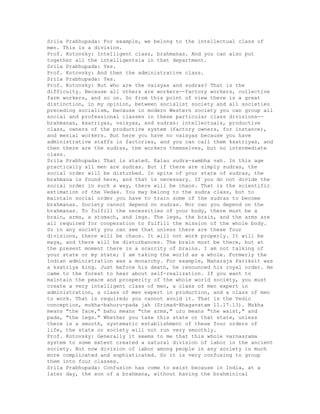
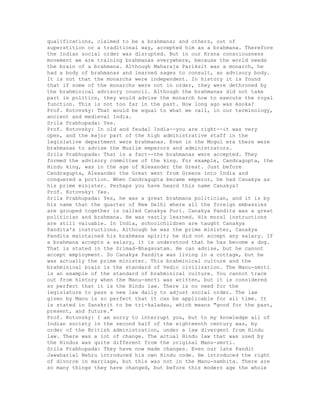
![human society was governed by the Manu-smrti. Strictly speaking, modern
Hindus are not strictly following the Hindu scriptures.
But our point is not to try to bring back the old type of Hindu
society. That is impossible. Our idea is to take the best ideas from the
original idea. For example, in the Srimad-Bhagavatam there is a
description of the communist idea. It is described to Maharaja
Yudhisthira. If there is something good, a good experience, why
shouldn't you adopt it? That is our point of view. Besides that, modern
civilization is missing one all-important point--the aim of human life.
Scientifically, the aim of human life is self-realization, atma-tattva.
It is said that unless the members of human society come to the point of
self-realization, they are defeated in whatever they do. Actually it is
happening in modern society, despite all economic advancement and other
advancement: instead of keeping peace and tranquillity, they are
fighting--individually, socially, politically, and nationally. If we
think about it in a cool-headed way, we can see that in spite of much
improvement in many branches of knowledge, we are keeping the same
mentality that is visible in the lower animal society. Our conclusion,
according to the Srimad-Bhagavatam, is that this human body is not meant
for working hard for sense gratification. But people do not know
anything beyond that. They do not know about the next life. There is no
scientific department of knowledge to study what happens after this body
is finished. That is a great department of knowledge.
In the Bhagavad-gita (2.13) it is said, dehino 'smin yatha-dehe.
Deha means "this body." Dehinah means "the one who owns this body."
Dehino 'smin yatha dehe kaumaram yauvanamjara. The dehi, the owner of
the body, is within, and the body is changing from one form to another.
The child has a certain type of body that changes to another type when
he is older. But the owner of the body still exists throughout.
Similarly, when this body is completely changed, we accept another body.
People do not understand this. We are accepting different bodies, even
in this life, from babyhood to childhood to boyhood to youth. That is a
fact--everyone knows it. I was a child, but that childhood body is no
more. I have a different body now. What is the difficulty in
understanding that when this body will be no more, then I will have to
accept another body? It is a great science.
Prof. Kotovsky: As you know, there are two quite opposite approaches to
this problem. The approach is slightly different according to different
religions, but at the same time, any religion recognizes and searches
for the change-of-place experience, or transmigration of spirit. In
Christian religion, in Judaism, in...
Srila Prabhupada: I am not talking religions with you. I am talking
science and philosophy. One religion may accept one way; that is not our
concern. We are concerned with the point that if the owner of the body
is permanent in spite of different changes of body, there should be no
difficulty in understanding that when this body changes entirely, the
owner of the body will have another body.
Prof. Kotovsky: Another approach is that there is no separation. There
are no two phenomena--the body and the owner of the body are the same.
Srila Prabhupada [emphatically]: No.
Prof. Kotovsky: When the body dies, the owner also dies.
Srila Prabhupada: No, no. But why is there no department of knowledge in
the university to study this fact scientifically? That is my
proposition--they are lacking. It may be as you say or it may be as I](https://image.slidesharecdn.com/scienceofself-realization-180727182233/85/Science-of-self-realization-136-320.jpg)
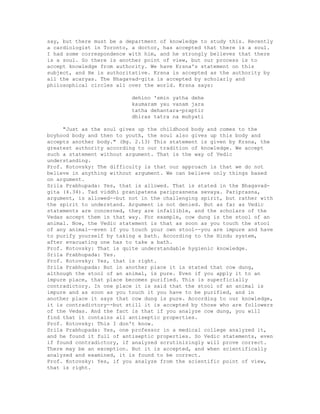
![Srila Prabhupada: There are other instances--for example, the
conchshell. The conchshell is the bone of an animal, and according to
Vedic instruction if you touch the bone of an animal you become impure
and have to take a bath. But this conchshell is kept in the Deity room,
because it is accepted as pure by the Vedas. My point is that we accept
Vedic laws without argument. That is the principle followed by scholars.
If you can substantiate your statements by quotations from the Vedas,
then they are accepted. You are not required to substantiate them in
other ways. There are different kinds of pramanas, or evidences. Proof
by Vedic quotation is called sruti-pramana. As in the legal court if you
can give statements from the law book your statement is accepted, so all
statements you give, if supported by sruti-pramanas, are accepted by
scholars. I think you know the Vedas are known as srutis.
Prof. Kotovsky: Yes.
Srila Prabhupada:
sruti-smrti-puranadi-
pancaratra- vidhim vina
aikantiki harer bhaktir
utpatayaiva kaipate
(Brahma-yamala)
Any system we accept must be supported by evidences of sruti,
smrti, the Puranas, and Pancaratra. That which is not proved by these
pramanas is a disturbance.
Prof. Kotovsky: Could I just say one thing? What is in the Vedas could
also have been proved in a scientific way. Today, suppose there is a
scientific laboratory. What is said by that lab is true. That it is true
you accept, without going into the propriety of it. Suppose you have a
scientific workshop or institution; if this workshop or scientific
institution says, "This is not good," the general body will take it for
granted: "Yes. The scientific body has said so, so it is understood."
Srila Prabhupada: Similarly, Vedic authoritative statements are accepted
by the acaryas [great teachers]. India is governed by the acaryas--
Ramanujacarya, Madhvacarya, Sankaracarya. They accept the Vedas, and
their followers accept them. The benefit is that I do not waste my time
to research whether cow dung is pure or impure; rather, because it is
stated in the Vedas to be pure, I accept it. I save my time by accepting
the sruti-pramana. In that way there are different statements in the
Vedas for sociology and politics or anything, for veda means
"knowledge."
sarvasya caham hrdi sannivisto
mattah smrtirjnanam apohanam ca
vedais ca sarvair aham eva vedyo
vedanta-krd veda-vid eva caham
(Bg.15.15)
Prof. Kotovsky: May I put one question to you? Have you many
branches of your society in the world?
Srila Prabhupada: Yes.
Prof. Kotovsky: Where is your main center, and where are the branches of
the Krsna consciousness society?](https://image.slidesharecdn.com/scienceofself-realization-180727182233/85/Science-of-self-realization-138-320.jpg)
![Srila Prabhupada: Of course, I have over sixty-five branches. accepted
the principles. Just like these boys. [Srila Prabhupada points to his
two secretaries.]
Prof. Kotovsky: But does that mean that these students abstain from
normal Western, European universities? For instance, can a normal
student from one of the various universities who is attending lectures
in the normal way also be initiated and admitted to your community?
Srila Prabhupada: If you want to live in our community and be initiated,
we welcome you. If not, come try to understand our philosophy, read our
books--there are so many books, magazines, questions, and answers. Try
to understand the philosophy. It is not that all of a sudden a student
comes and becomes our disciple. He first of all comes, associates, and
tries to understand. We do not canvass. He voluntarily says that he
wants to be a disciple.
Prof. Kotovsky: What happens if, for instance, one is not a student but
a young worker or the young son of a farmer? Would he renounce his whole
life and join your community in a given center? How would he maintain
himself in his day-to-day life, in material life?
Srila Prabhupada: As I told you, this propaganda is meant for creating
brahmanas all over the world, because the brahmana element is lacking.
One who seriously comes to us has to become a brahmana, so he should
adopt the occupation of a brahmana and give up the occupation of a
ksatriya or sudra. But if one wants to keep his profession and also at
the same time understand our movement, that is allowed. We have many
professors following our movement. There is Howard Wheeler, a professor
at Ohio State University. He is my disciple. He is continuing with his
professorship, but almost all the money he is getting he is spending for
this Krsna consciousness. Grhasthas, those who are in householder life
outside, are expected to contribute fifty percent of their income for
our society, keep twenty-five percent for family, and keep twenty-five
percent for personal emergencies. But Lord Caitanya Mahaprabhu teaches
that it does not matter whether one is a grhastha (householder), or in
the renounced order, or a brahmana, or a sudra. Lord Caitanya says,
"Anyone who understands the science of Krsna becomes My spiritual
master." The actual words in Bengali are kiba vipra, kiba nyasi, sudra
kene naya. Do you understand a little Bengali?
Prof. Kotovsky: A little.
Srila Prabhupada: Yes, as a vibration. Yei krsna-tattva-vetta, sei
`guru' haya. "Anyone who understands the science of Krsna can become a
spiritual master." (Caitanya-caritamrta, Madhya 8.128)
Prof. Kotovsky: But by creating brahmanas from different social classes
of society, you deny the old prescription of the Hindu scriptures.
Srila Prabhupada: No, I establish it.
Prof. Kotovsky: According to all scriptures--the Puranas, etc.--every
member of one of these four classes of varnas has to be born within it.
Srila Prabhupada: No, no, no, no.
Prof. Kotovsky: That is the foundation of all the varnas...
Srila Prabhupada: No, no. I am sorry.
Prof. Kotovsky: The foundation of all the varnas...
Srila Prabhupada: You have spoken incorrectly. With great respect I beg
to submit that you are not speaking correctly. In the Bhagavad-gita
(4.13) it is stated, catur-varnyam maya-srstam guna-karma-vibhagasah.
"These four orders of brahmanas, ksatriyas, vaisyas, and sudras were](https://image.slidesharecdn.com/scienceofself-realization-180727182233/85/Science-of-self-realization-139-320.jpg)
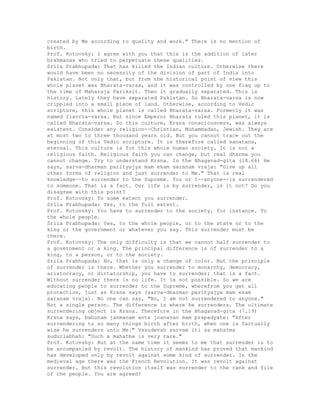
![Srila Prabhupada: Yes.
Prof. Kotovsky: So it is not enough to come to a full stop. Surrender is
to be accompanied with revolt against some and surrender to other
people.
Srila Prabhupada: But the surrender will be fully stopped when it is
surrender to Krsna.
Prof. Kotovsky: Ah, ah.
Srila Prabhupada: That is full stop--no more surrender. Any other
surrender you have to change by revolution. But when you come to Krsna,
then it is sufficient. You are satisfied. I'll give you an example: a
child is crying, and people move him from one lap to another. Oh, he
does not stop. But as soon as the baby comes to the lap of his mother...
Prof. Kotovsky: It stops.
Srila Prabhupada: Yes, full satisfaction. So this surrender, these
changes, will go on in different categories. But the sum total of all
this surrender is surrender to maya. Therefore, in the Bhagavad-gita it
is said that this surrender, neglecting Krsna, is all maya. Either you
surrender to this or to that, but final surrender is surrender to Krsna;
then you will be happy. The process of surrender is there, but surrender
to Krsna keeps one quite satisfied, transcendentally.
Prof. Kotovsky: Haven't you come across hostile attitudes to your
teachings from orthodox Hindus or brahmanas in India?
Srila Prabhupada: We have subdued them.
Prof. Kotovsky: Ah.
Srila Prabhupada: Any orthodox Hindu may come and challenge, but we have
our weapons--the Vedic literatures. So no one has come. Even Christian
priests in America love me. They say, "These boys are American,
Christian, Jewish, and now they are so much after God. But we could not
deliver them." They are admitting it. Their fathers and their parents
come to me, offer their obeisances, and say, "Swamiji, it is our great
fortune that you have come here to teach God consciousness." So on the
contrary, I have been well received. In India also, since you inquired
of India, all other sects are admitting that before me many kinds of
svamis went to the Western countries, but they could not convert even a
single person to Krsna consciousness. They are admitting that. As far as
I am concerned, I don't take any credit, but I am confident that because
I am presenting the Vedic knowledge as it is, without adulteration, it
is being effective. That is my confidence. If you have the right
medicine and you administer it to a patient, you must be sure that he
will be cured.
Prof. Kotovsky: How many out of your one thousand disciples do you have
in India itself? How many of your community do you have in India?
Srila Prabhupada: In India?
Prof. Kotovsky: Yes.
Srila Prabhupada: In India there are many Krsna conscious persons--
hundreds, thousands, millions. In India there is no question. There is
not a single Hindu who is not Krsna conscious.
Prof. Kotovsky: Yes, I understand.
Srila Prabhupada: Vaisnavas. This is called the Vaisnava cult. You have
been in India, so as it is commonly known, there are many millions of
Vaisnavas. For example, this gentleman [an Indian gentleman present] is
the commander of Air India airlines. He is not my disciple, but he is a
Vaisnava, Krsna conscious. Similarly, in India there are millions of
Krsna conscious persons. There are even Muhammadans who are Krsna](https://image.slidesharecdn.com/scienceofself-realization-180727182233/85/Science-of-self-realization-141-320.jpg)
![conscious. At Gorakhpur University there is a Muhammadan professor who
is a great devotee of Lord Krsna. So this is natural. It is said in the
Caitanya-caritamrta that Krsna consciousness is everywhere, in
everyone's heart. It simply has to be awakened by this process. That is
all. It is there in your heart also. It is not that it is foreign to
you. In everyone's heart there is Krsna consciousness. By this process
we have to awaken it. It is just like the way the sun rises. It is not
that all of a sudden the sun comes from nowhere. It is there, but it
rises in the morning. Similarly, this Krsna consciousness is everywhere,
but some way or another it is now covered. By this process it is
reawakened and aroused by association.
Prof. Kotovsky: You came yesterday to Moscow. Have you seen something
here in Moscow?
Srila Prabhupada: No, I am not very much interested in sight-seeing.
Prof. Kotovsky: But in any case, just to stay in an old-style hotel is
not interesting--not many people to see. And you are leaving the day
after tomorrow?
Srila Prabhupada: That is my program.
Prof. Kotovsky: You are leaving for the United States or for Europe?
Srila Prabhupada: Yes, for Europe. Paris. And we have two very big
ceremonies in London and San Francisco. They are making arrangements for
the Ratha-yatra Car Festival. This car festival is observed in
Jagannatha Puri. You have been to Jagannatha Puri?
Prof. Kotovsky: Yes, the car festival has been held from immemorial
times. A very old tradition. Huge cars.
Srila Prabhupada: Yes, and it has now been introduced in the Western
countries in London and San Francisco, and gradually maybe we will
introduce it in other countries also.
Prof. Kotovsky: In London there is a large Indian community.
Srila Prabhupada: No, no. This is organized by the Englishmen and
Americans. The Indian communities in London and San Francisco are trying
to become--you know the word? Sahib?
Prof. Kotovsky: [Laughs.] Westernized. [They both laugh.] A very great
social anthropologist at the university has written something very
interesting. He says there are two processes--the process of
Westernization among brahmanas, mainly the upper class, and the process
called Sanskritization, which is the process of adopting brahmana
rituals, etc., by so-called lower classes, even untouchables. It is a
very interesting process in India just now. But India's position,
unfortunately, is problematic.
Srila Prabhupada: The difficulty is that India is nowhere. They are
trying to imitate Western life, but from a materialistic or technical
point of view, they are one hundred years back.
Prof. Kotovsky: Yes, that is right. But what to do for India?
Srila Prabhupada: There is one thing I am experiencing. If India's
spiritual asset is distributed, that will increase India's honor.
Because everywhere I go, people still adore Indian culture. If this
treasure-house of India's spiritual knowledge is properly distributed,
at least people outside of India will understand that they are getting
something from India.
Prof. Kotovsky: Of course, you're right. The Indian cultural heritage is
to be made known everywhere. But at the same time, in what way would
this benefit the Indian masses themselves? They are sitting in India,
and they have nothing to gain from the spreading of the Indian cultural](https://image.slidesharecdn.com/scienceofself-realization-180727182233/85/Science-of-self-realization-142-320.jpg)
![heritage all over the world. Indian villages have to have fertilizers,
tractors, etc.
Srila Prabhupada: Yes, we do not object to that.
Prof. Kotovsky: Yes, I don't think you can object, but at the same time,
something has to be done in India. One may call it Westernization, but
this introduction to an industrial technological revolution is needed in
all fields of Indian life--agriculture, industry, etc.
Srila Prabhupada: Arjuna, before understanding the Bhagavad-gita, was a
fighter, and after understanding the Bhagavad-gita he remained a
fighter. So we don't want to change the position. For example, you are a
respectable professor, a teacher. We don't say that you must change your
position. We have come to convince you about our philosophy. That is
all. Arjuna was refusing to fight. "Krsna, I don't want to kill my
relatives. I do not want this kingdom." But he was taught the Bhagavad-
gita, and at the end when Krsna inquired, "What is your decision now?"
he said, karisye vacanam ta va--"Yes, I shall act as You say."
(Bg.18.72) That means that his consciousness changed. He was a fighter,
and he remained a fighter, but he changed his consciousness. We want
that. We don't want to disturb the present condition of society. We are
not against technology. No, but we try to make one understand this Krsna
consciousness. That is our program.
Prof. Kotovsky: Of course, at the same time the final goal of any
consciousness is to change the society--to make it a better society.
Srila Prabhupada: That is automatic.
Prof. Kotovsky: I am not really so happy that the ultimate goal is not
to disturb society, because in modern society there are many things to
be changed through consciousness.
Srila Prabhupada: That preliminary change is to follow rules and
regulations of austerity. For example, don't take intoxicants.
Prof. Kotovsky: No indulging in intoxicants--simplicity, etc.
Srila Prabhupada: So if one takes to this process...
Prof. Kotovsky: Then the others will come automatically.
Srila Prabhupada: One's whole life will change, because these four
things--illicit sex life, intoxicants, meat-eating and gambling--are
very great impediments to social improvement.
Prof. Kotovsky: That will automatically make life simpler, because a
person who does not indulge in illicit sex, intoxicants, and such other
things has to lead a comparatively simple life.
Srila Prabhupada: The other day I was speaking in Bombay with a
respectable gentleman. I was telling him that Krsna says:
mam hi partha vyapasritya
ye 'pi syuh papa-yonayah
striyo vaisyas tatha sudras
te 'pi yanti param gatim
"Even those who are lowborn [papa-yonayah]--stri, vaisyas, and
sudras--are also included by accepting Me. By accepting My shelter they
are also elevated to the transcendental position." (Bg. 9.32) Now why
have the higher classes of Hindu society neglected this injunction of
the Bhagavad-gita? Suppose one is papa-yonayah, lowborn. Krsna says that
he can be "elevated to the transcendental position if he accepts Me."
Why wasn't this message propagated by the higher class of people so that
the so-called lowborn could be elevated? Why did they reject them? The](https://image.slidesharecdn.com/scienceofself-realization-180727182233/85/Science-of-self-realization-143-320.jpg)
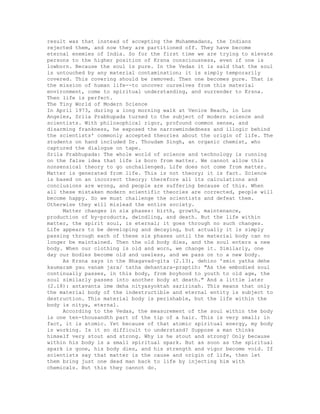
![Dr. Singh: Since scientists cannot see the spirit soul, they say its
existence is very doubtful.
Srila Prabhupada: How can they see it? It is too small to see. Where is
such seeing power?
Dr. Singh: Still, they want to sense it by some means.
Srila Prabhupada: If you inject just one grain of deadly poison into
someone, he immediately dies. No one can see the poison or how it acts.
But the poison is acting nevertheless. In the same way, the Vedas say
that because the minute particle called the soul is within the body, the
whole body is working nicely. If I pinch myself, I immediately feel it,
because I am conscious all over my skin. But as soon as the soul is
absent, which is the case when my body dies, you can take this same skin
and cut it and chop it, and no one will protest. Why is this simple
thing so hard to understand? ls this not detecting spirit?
Dr. Singh: That is the soul. But what about God?
Srila Prabhupada: First of all let us understand the soul. The soul is a
small God. If you understand the sample, then you can understand the
whole.
Now here is matter. [Srila Prabhupada points at a dead tree with
his cane.] Formerly leaves and twigs were growing from this tree. Why
are they not growing now? Can the scientists answer this question?
Karandhara dasa: They would say the chemical composition has changed.
Srila Prabhupada: All right, then if they are so advanced in knowledge
of chemistry, they must supply the proper chemicals to make branches and
leaves grow again.
Brahmananda Swami: Knowledge means that one must be able to demonstrate
his theory. They should be able to show in their laboratories that life
is caused by a combination of chemicals.
Srila Prabhupada: Yes, the scientific method means first observation,
then hypothesis, and then demonstration. But these scientists cannot
demonstrate their hypothesis. They simply observe and then speak
nonsense.
Scientists say that the chemicals are the cause of life. But all
the chemicals that were there when the tree was living are still
present. And life energy is also there. There are thousands of microbes
in the tree, and they are all living entities. No one can claim that
life energy is lacking in the body of this tree.
Dr. Singh: But what about the life energy of the tree itself?
Srila Prabhupada: Yes, that is the difference. The living force is
individual, and the particular individual living entity which was the
tree has left. This must be the case, since all the chemicals that are
necessary to support life are still there yet the tree is dead.
Here is another example: suppose I am living in an apartment, and
then I leave it. I am gone, but many other living entities remain there-
-ants, spiders, and so forth. It is not true that simply because I have
left the apartment, it can no longer accommodate life. Other living
entities are still living there. It is simply that I--an individual
living being--have left. The chemicals in the tree are like the
apartment; they are simply the environment for the individual living
force--the soul--to act through. Thus the scientists will never be able
to produce life in the chemical laboratory.
The so-called scientists say that life begins from chemicals. But
the real question is, "Where have the chemicals come from?" The
chemicals come from life, and this means that life has mystic power. For](https://image.slidesharecdn.com/scienceofself-realization-180727182233/85/Science-of-self-realization-145-320.jpg)
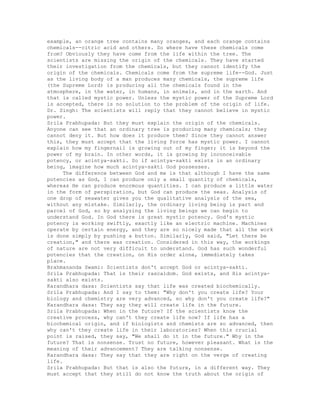
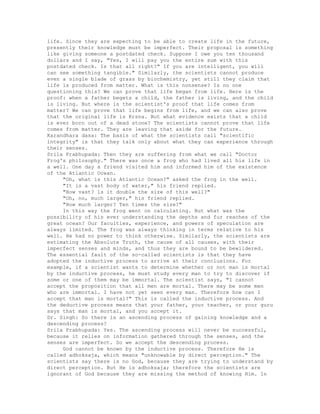
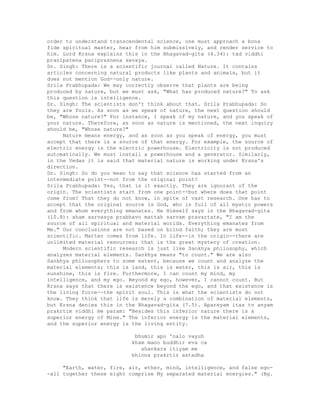
![7.4) Krsna explains here in the Bhagavad-gita that vayu (gas) comes from
Him, and that finer than the gases is kham (ether). Finer than ether is
the mind, finer than the mind is intelligence, and finer than the
intelligence is the soul. But the scientists do not know this. They can
perceive only gross things. They mention vayu, but where does the vayu
come from? Where does the gas come from?
Dr. Singh: That they cannot answer.
Srila Prabhupada: But we can answer. We have the knowledge that gas
comes from kham, or ether, and ether comes from mind, mind comes from
intelligence, and intelligence comes from Krsna's superior energy, the
spirit soul.
Dr. Singh: Are both inferior and superior energies studied in Sankhya
philosophy?
Srila Prabhupada: No. Sankhya philosophers do not know of superior
energy. They simply analyze the material elements, just as the
scientists do. Neither the scientists nor the Sankhya philosophers know
anything of the spirit soul. They are simply analyzing Krsna's material
energy.
Dr. Singh: They are analyzing the creative material elements?
Srila Prabhupada: Material elements are not creative! The soul is
creative. No one can create life with only matter, and matter cannot
create itself. You, a living entity, can mix hydrogen and oxygen to
create water. But matter itself has no creative energy. If you place a
bottle of hydrogen near a bottle of oxygen, will they automatically
combine, without your help?
Dr. Singh: No. They must be mixed.
Srila Prabhupada: Yes, the superior energy--the living entity--is
required. Oxygen and hydrogen are inferior energy, but when the superior
energy mixes them, then they can become water.
Inferior energy has no power unless superior energy is involved.
This sea [indicating the Pacific Ocean] is calm and quiet. But when
superior force--air--pushes it, high waves are created. The sea has no
power without the superior force. Similarly, there is another force
superior to the air, and another, and another, until we arrive at Krsna,
the most superior force. This is real research. Suppose a railroad train
is just starting to move. The engine pushes one car, which pushes
another, and so on, until the entire train is moving. And the whole
motion originates with the engineer, a living entity. Similarly, in the
cosmic creation, Krsna gives the first push, and then, by means of many
successive pushes, the entire cosmic manifestation comes into being.
This is explained in the Bhagavad-gita (9.10): mayadhyaksena prakrtih
suyate sa-caracaram. "This material nature is working under My
direction, O son of Kunti, and is producing all moving and unmoving
beings." And a little later:
sarva-yonisu kaunteya
murtayah sambha vanti yah
tasam brahma mahad yonir
aham bija-pradah pita
"All species of life are made possible by birth in material nature,
and I am the seed-giving father." (Bg. 14.4) For example, if we sow a
banyan seed, a huge tree eventually grows up and produces millions of
new seeds. Each of these seeds, in turn, produces another tree with](https://image.slidesharecdn.com/scienceofself-realization-180727182233/85/Science-of-self-realization-149-320.jpg)
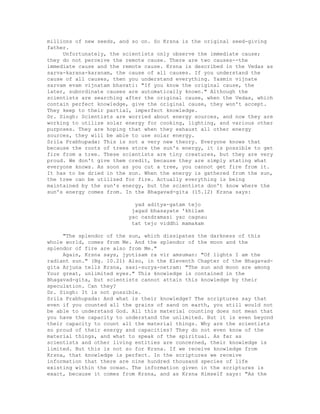
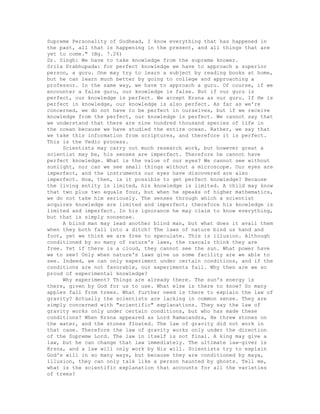
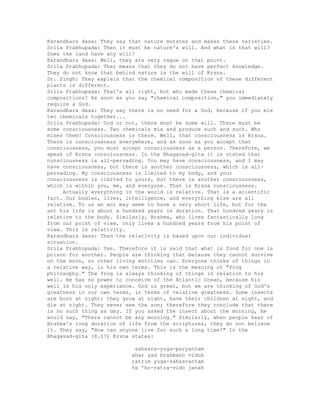
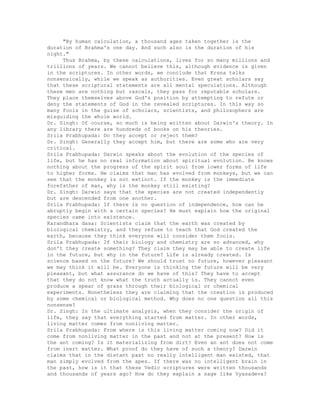
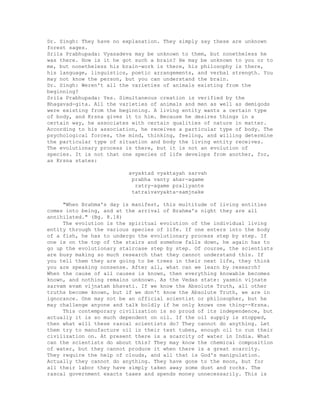
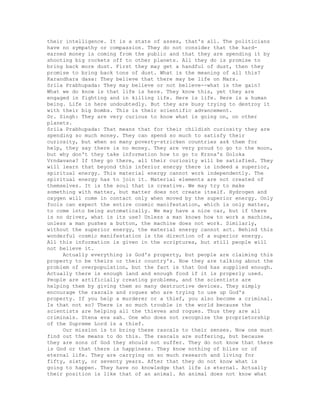

![My dear Lord Krsna, You are so kind upon this useless soul, but I do not
know why You have brought me here. Now You can do whatever You like with
me.
But I guess You have some business here, otherwise why would You bring
me to this terrible place?
Most of the population here is covered by the material modes of
ignorance and passion. Absorbed in material life, they think themselves
very happy and satisfied, and therefore they have no taste for the
transcendental message of Vasudeva. I do not know how they will be able
to understand it.
But I know Your causeless mercy can make everything possible, because
You are the most expert mystic.
How will they understand the mellows of devotional service? O Lord, I am
simply praying for Your mercy so that I will be able to convince them
about Your message.
All living entities have become under the control of the illusory energy
by Your will, and therefore, if You like, by Your will they can also be
released from the clutches of illusion.
I wish that You may deliver them. Therefore if You so desire their
deliverance, then only will they be able to understand Your message.
The words of the Srimad-Bhagavatam are Your incarnation, and if a sober
person repeatedly receives them with submissive aural reception, then he
will be able to understand Your message.
It is said in the Srimad-Bhagavatam (1.2.17-21): "Sri Krsna, the
Personality of Godhead, who is the Paramatma [supersoul] in everyone's
heart and the benefactor of the truthful devotee, cleanses desire for
material enjoyment from the heart of the devotee who relishes His
messages, which are in themselves virtuous when properly heard and
chanted. By regularly hearing the Bhagavatam and rendering service unto
the pure devotee, all that is troublesome to the heart is practically
destroyed, and loving service unto the glorious Lord, who is praised
with transcendental songs, is established as an irrevocable fact. At the
time loving service is established in the heart, the modes of passion
[rajas] and ignorance [tamas], and lust and desire [kama] disappear from
the heart. Then the devotee is established in goodness and he becomes
happy. Thus established in the mode of goodness, the man rejuvenated by
loving service to the Lord gains liberation from material association
[mukti] and comes to know scientifically of the Personality of Godhead.
Thus the knots of the heart and all misgivings are cut to pieces. The
chain of fruitive actions [karma] is terminated when one sees the self
as master."
He will become liberated from the influence of the modes of ignorance
and passion and thus all inauspicious things accumulated in the core of
the heart will disappear.
How will I make them understand this message of Krsna consciousness? I
am very unfortunate, unqualified, and the most fallen. Therefore I am
seeking Your benediction so that I can convince them, for I am powerless
to do so on my own.
Somehow or other, O Lord, You have brought me here to speak about You.
Now, my Lord, it is up to You to make me a success or failure as You
like.
O spiritual master of all the worlds! I can simply repeat Your message,
so if You like You can make my power of speaking suitable for their
understanding.](https://image.slidesharecdn.com/scienceofself-realization-180727182233/85/Science-of-self-realization-157-320.jpg)
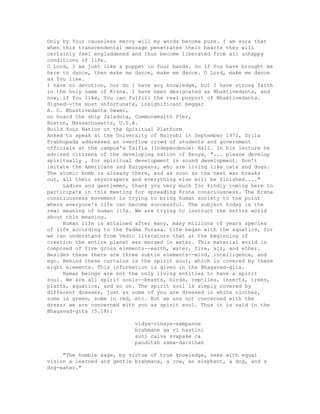
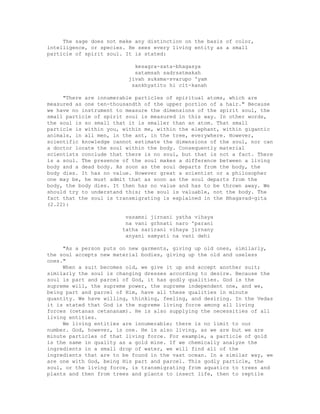
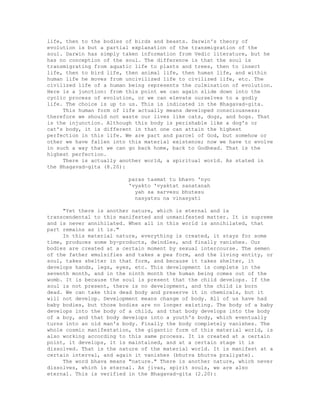
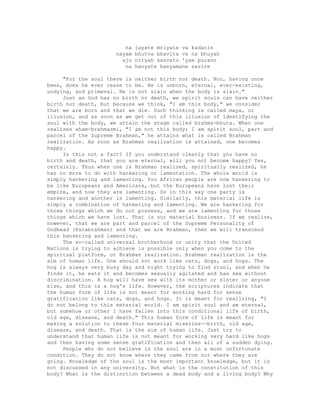
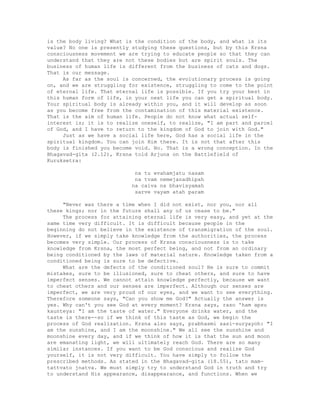
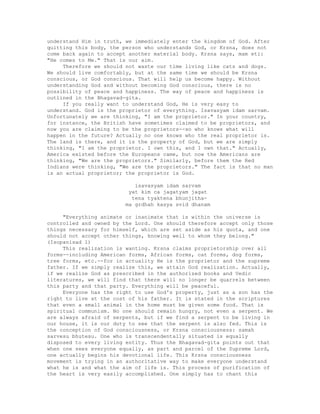
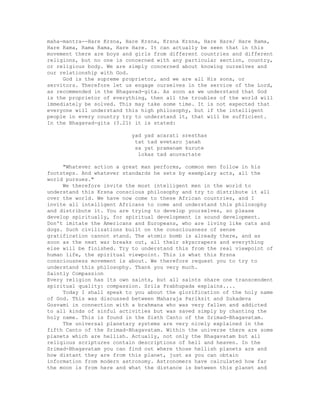
![the sun; similarly, the Bhagavatam contains descriptions of the hellish
planets.
We have experience of different atmospheric conditions even on this
planet. In the Western countries near the North Pole, the climate is
different than in India, which is near the equator. Just as there are
differences in atmosphere and living conditions on this planet,
similarly there are many planets which have different atmospheres and
conditions of life.
After hearing a description of the hellish planets from Sukadeva
Gosvami, Pariksit Maharaja said,
adhuneha maha-bhaga
yathaiva narakan narah
nanogra-yatanan neyat
tan me vyakhyatum arhasi
"Sir, I have heard from you about the hellish planets. Men who are
very sinful are sent to those planets." (Srimad-Bhagavatam 6.1.6)
Pariksit Maharaja is a Vaisnava [devotee], and a Vaisnava always feels
compassion for others' distress. He is very afflicted by the miseries of
others. When Lord Jesus Christ presented himself, for instance, he was
greatly afflicted by the miserable conditions of the people. Regardless
of which country or sect they belong to, all Vaisnavas, or devotees--any
people who are God conscious, or Krsna conscious--are thus
compassionate. Therefore to blaspheme a Vaisnava, a preacher of God's
glories, is a great offense.
Krsna, God, is never tolerant of offenses committed at the lotus
feet of a Vaisnava. Krpambudhi: a Vaisnava is an ocean of mercy. Vancha-
kalpa-taru: everyone has desires, but a Vaisnava can fulfill all
desires. Kalpa-taru means "desire tree." There is a tree in the
spiritual world which is called a desire tree. In this material world,
you get a particular type of fruit from a particular type of tree, but
in Krsnaloka as well as in all the Vaikuntha planets, all the trees are
spiritual and will fulfill all your desires. That is described in the
Brahma-samhita: cintamani-prakara-sadmasu kalpa-vrksa.
A Vaisnava is addressed as maha-bhaga, which means "fortunate." One
who becomes a Vaisnava and is God conscious is understood to be greatly
fortunate.
Caitanya Mahaprabhu has explained that the living entities are
rotating in different species of life, in different planetary systems
all over the universe. A living entity can go anywhere--to hell or
heaven--as he likes and as he prepares himself. There are many heavenly
planets, many hellish species of life. The living entity is rotating,
wandering through these species and creating bodies according to his
mentality in the present life. As you sow, so shall you reap.
Caitanya Mahaprabhu says that out of all these numberless living
entities who are traveling in the material world, one is fortunate, not
everyone. If everyone were fortunate, they would all have taken to Krsna
consciousness. It is being distributed freely everywhere. But why are
people not taking it? Because they are unfortunate. Therefore Caitanya
Mahaprabhu says that only those who are fortunate take to this Krsna
consciousness, and they get hopeful life, pleasant life, blissful life,
a life of knowledge.](https://image.slidesharecdn.com/scienceofself-realization-180727182233/85/Science-of-self-realization-165-320.jpg)
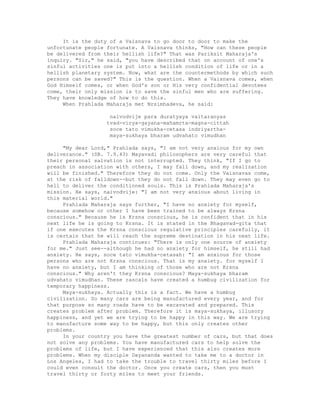
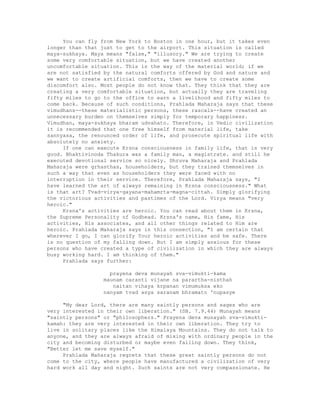
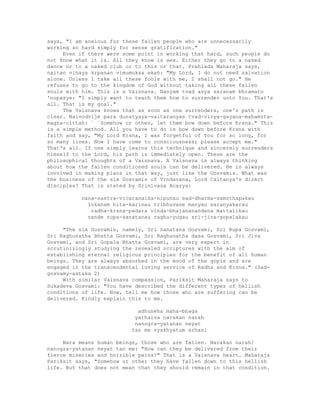
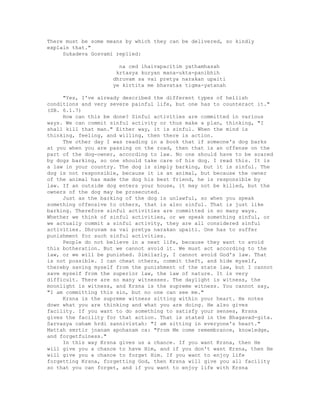
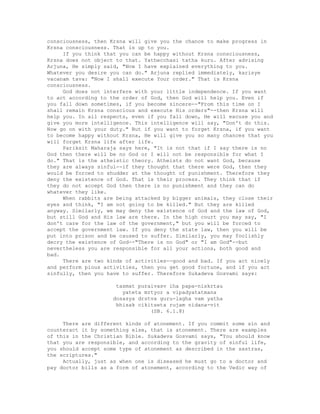
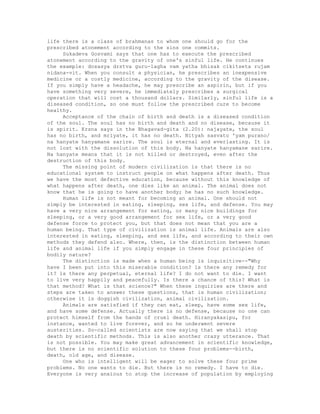
![so many contraceptive methods, but still, birth is going on. So there is
no stoppage or birth. You may invent up-to-date medicines by your
scientific methods, but you cannot stop disease. It is not possible just
to take a tablet to put an end to disease.
In the Bhagavad-gita it is said, janma-mrtyu jara-vyadhi-duhkha-
dosanudarsanam: one might think that he has solved all the problems of
his life, but where is the solution to these four problems of birth,
death, old age, and disease? That solution is Krsna consciousness.
Krsna also says in the same book,
janma karma ca me divyam
evam yo vetti tattvatah
tyaktva deham punar janma
naiti mam eti so 'rjuna
(Bg. 4.9)
Every one of us is giving up our body at every moment. The last
phase of giving up this body is called death. But Krsna says, "If anyone
understands My appearance and disappearance and My activities--not
superficially, but in truth--after giving up this body he never again
accepts a material body."
What happens to such a person? Mam eti--he returns to Krsna. If you
are to go to Krsna, then you have to prepare your spiritual body. That
is Krsna consciousness. If you keep yourself in Krsna consciousness,
then gradually you prepare your next body, a spiritual body, which will
carry you immediately to Krsnaloka, the abode of Krsna, and you will
become happy. You will live there perpetually and blissfully.
Protecting Oneself from Illusion
In 1973 Srila Prabhupada received an unusual letter from a woman in
California who had encountered two of his young disciples. She
complained that they had "a very negative outlook toward the people they
meet." Moved by her genuine concern, Srila Prabhupada took time out from
his busy schedule to write her this thoughtful letter.
Your Grace:
Please accept this letter with Love... K-Mart; San Fernando. We
have talked with two of your boys at different times. Both had a very
negative outlook toward the people they meet.
Do not believe this is in any way as it should be.
These boys happen to represent God. This comes from within. Their
outlook must have mercy. We realize this; therefore handpick these
little peaces [sic] of heaven to place in the middle of these people. Or
else it will defeat your purpose.
Love Is. Let it be as it is; with Love or not at all.
My prayers be with you... and I beg yours with me.
Yours in God, Blessed Be,
Lynne Ludwig
My dear Lynne Ludwig,
Please accept my blessings. I beg to acknowledge receipt of your
letter from California, and I have noted the contents carefully,
although due to extensively traveling and preaching in a tour in India I
have not had the opportunity to reply to you at length until now. Your
complaint is that you have met two of my young disciples in California
and they appeared to you to have "a very negative outlook toward the
people they meet." Of course, I do not know the case and what the](https://image.slidesharecdn.com/scienceofself-realization-180727182233/85/Science-of-self-realization-172-320.jpg)
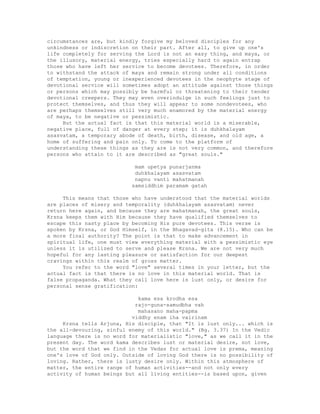
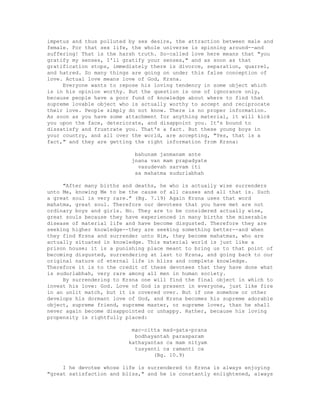
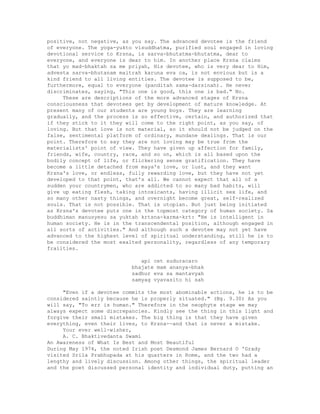
![end to war, modern education and its problems, life beyond time, and the
essential nature of love.
Mr. O'Grady: Your edition of the Bhagavad-gita is very nice.
Srila Prabhupada: It is the fifth edition in two years.
Mr. O'Grady: In which country has the Hare Krsna movement been the most
successful?
Srila Prabhupada: Everywhere. In Africa, America, Canada, Japan, China.
But actually it has been most successful in America. Many Americans have
taken to Krsna consciousness.
Mr. O'Grady: What about here in Rome? Have you had problems with the
police?
Srila Prabhupada: We have problems everywhere. Police sometimes harass
us, but usually they become tired and eventually don't do anything.
[Laughter.]
Mr. O'Grady: The system give up? That's marvelous. I feel very tired of
the system myself. Something is wrong with the present state of affairs.
Maybe you can give me some advice on how to beat the system.
Srila Prabhupada: You Irish people! You are never tired of fighting.
Mr. O'Grady: No. [Laughter.] It's inside us.
Srila Prabhupada: Actually, the fighting has been going on constantly.
Mr. O'Grady: Well, what do you suggest we do about it? I mean, is it
morally correct for me to be sitting here...
Srila Prabhupada: As long as we remain illusioned by the bodily
conception of life, thinking we are these bodies, one man thinking "I am
Irish," another thinking "I am Italian," "... American," "... Indian,"
and so on--as long as this goes on, the fighting will go on. You cannot
stop fighting between dogs and cats. Why do they fight? The dog simply
thinks, "I am a big dog." And the cat thinks, "I am a big cat." In the
same way, if we think, "I am an Irishman" or "I am an Englishman," then
we are no better than the cats and dogs. As long as people remain in a
bodily conception of life, there will be fighting.
Mr. O'Grady: What was Mahatma Gandhi fighting in the House of Commons?
Srila Prabhupada: That was another dog-ism. There is no difference. A
dog thinks, "I am a dog," because he has the body of a dog. If I am
thinking that I am Indian because this body was born on Indian soil,
then how am I different from the dog? The bodily conception of life is
simply animalism. When we understand that we are not these bodies but
are spirit souls, there will be peace. There cannot be any peace
otherwise. Sa eva go-kharah. The Vedic literatures state that a person
in the bodily concept of life is exactly like a cow or an ass. People
have to transcend this inferior conception of the self. How is that
done?
mam ca yo 'vyabhicarena
bhakti-yogena se vate
sa gunan samatityaitan
brahma-bhuyaya kalpate
"One who engages in the spiritual activities of unalloyed
devotional service at once transcends the modes of material nature and
is elevated to the spiritual platform." (Bhagavad-gita 14.25)
In our society, there are many Mexicans, Canadians, Indians, Jews,
and Muslims, but they no longer consider themselves Muslims, Christians,](https://image.slidesharecdn.com/scienceofself-realization-180727182233/85/Science-of-self-realization-176-320.jpg)
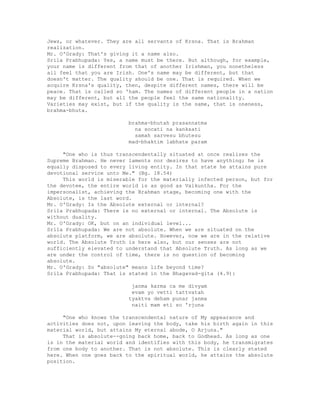
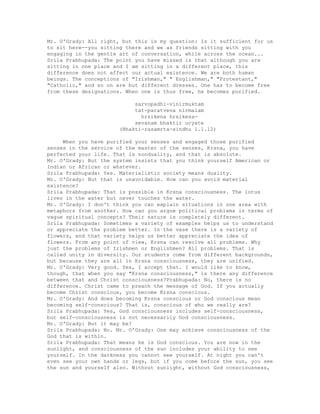
![self-consciousness is incomplete. However, God consciousness makes self-
consciousness very clear.
Mr. O'Grady: We meet a lot of young people in our teaching profession,
and we don't try to teach them any kind of didactic salvation. We do try
to direct them toward an awareness of what is best and what is most
beautiful and what is most spiritually nourishing in the world about
them--that is, insofar as the system allows us. Very frequently the
students are not neutral enough to be in a spiritual condition; they are
more in an emotional one. What we are faced with often is the basic
question of "Who am I?" or, "What is it all about?"
Srila Prabhupada: Yes.
Mr. O'Grady: Or they ask, "Why am I here?"
Srila Prabhupada: Yes, very good.
Mr. O'Grady: We are asked, "Why should I be here? Who are you, teacher,
and what gives you the right to tell us what to think or what to be or
what not to be? Why should I read Shakespeare? Why should I listen to
Mozart? I prefer Bob Dylan." These kind of questions seem to emanate
from a very disillusioned state of mind, and insecurity, and
uncertainty, and a lack of credibility in the total structure of things
as they are. Frequently we have to answer these questions in a
cataclysmic sort of way. Rather than presenting direct answers, we must
answer indirectly, taking account of the conditioning that prompted
students to ask these questions in the first place. Do you think that we
should try to reach them more directly?
Srila Prabhupada: You are talking about the problem of...
Mr. O'Grady: Modern education.
Srila Prabhupada: Yes. So many questions are there, but they are not
answered by modern education. "Why have I come here? What is the
purpose?" These questions should be answered perfectly. Therefore the
Vedas enjoin: tad-vijnanartham sa gurum evabhigacchet. To find answers
to all these questions, one must approach a bona fide spiritual master.
Mr. O'Grady: What if you have none? What if we are told that Mr. Nixon
is the bona fide spiritual master? What do we do?
Srila Prabhupada: No, no. [Laughter.] There is a standard for bona fide
spiritual masters. You have only heard one line of the verse. Who is the
spiritual master? That is the next line: srotriyam brahma-nistham. The
word srotriyam refers to one who has heard from another bona fide
source. A spiritual master is he who has taken the message from another
qualified spiritual master. This is just like a medical man who has
taken the knowledge of medical science from another medical man.
Similarly, the bona fide spiritual master must come in a line of
successive spiritual masters. The original spiritual master is God.
Mr. O'Grady: Yes. Granted.
Srila Prabhupada: One who has heard from God explains the same message
to his disciples. If the disciple doesn't change the message, he is a
bona fide spiritual master. That is our process. We take lessons by
hearing from Krsna, God, and from Him understand who is perfect. Or we
hear from His representative, who does not contradict Krsna and who has
realized His message. It is not that we speak one thing and do all
nonsense. One who does so is not a spiritual master.
Mr. O'Grady: Now there's my poor old father, living west of Ireland. A
simple old man, seventy-eight years now, your generation. He has gotten
to the point at his age where he says, "They tell me, the priests, they
tell me ultimately that it's God who knows. But I want to know who told](https://image.slidesharecdn.com/scienceofself-realization-180727182233/85/Science-of-self-realization-179-320.jpg)
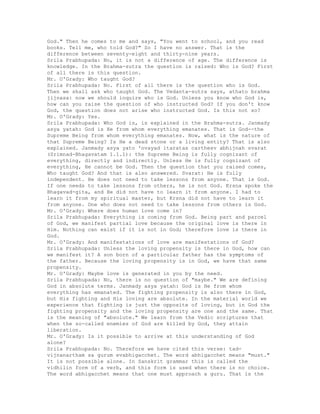
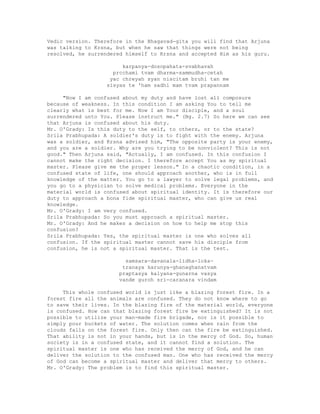
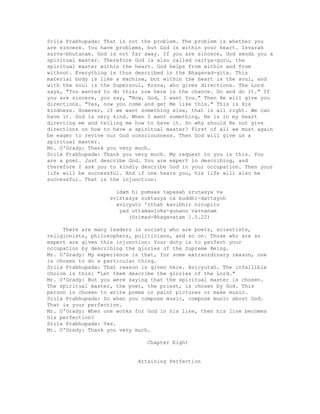
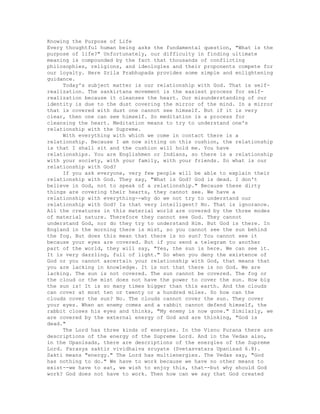
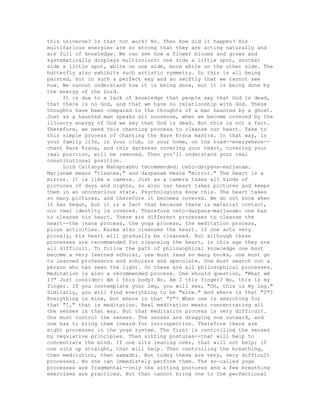
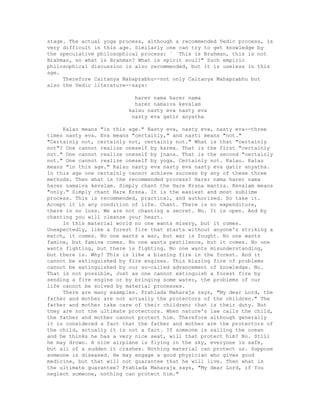
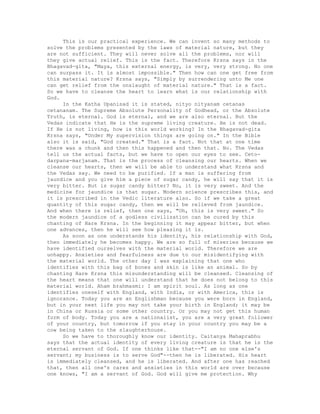
![should I worry about anything?" It is just like a child. A child knows
that his mother and father will take care of him. He is free. If he
should go to touch fire, his mother will take care of him: "Oh, my dear
child, don't touch." The mother is always looking after him. So why
don't you put your trust in God? Actually, you are under the protection
of God.
People go to church and say, "God, give us our daily bread."
Actually, if He did not give it to us, we would not be able to live.
That is a fact. The Vedas also say that the one Supreme Personality
supplies all the necessities of every other living creature. God is
supplying food for everyone. We human beings have our economic problem,
but what economic problem is there in societies other than human
society? The bird society has no economic problem. The species of life,
and out of that, human society is very, very small. So they have created
problems--what to eat, where to sleep, how to mate, how to defend. These
are a problem to us, but the majority of creatures--the aquatics, the
fish, the plants, the insects, the birds, the beasts, and the many
millions upon millions of other living creatures--do not have such a
problem. They are also living creatures. Don't think that they are
different from us. It is not true that we human beings are the only
living creatures and that all others are dead. No. And who is providing
their food and shelter? It is God. The plants and animals are not going
to the office. They are not going to the university to get technological
education to earn money. So how are they eating? God is supplying. The
elephant eats hundreds of pounds of food. Who is supplying? Are you
making arrangements for the elephant? There are millions of elephants.
Who is supplying?
So the process of acknowledging that God is supplying is better
than thinking, "God is dead. Why should we go to church and pray to God
for bread?" In the Bhagavad-gita it is said, "Four kinds of people come
to Krsna: the distressed, those who are in need of money, the wise, and
the inquisitive." One who is inquisitive, one who is wise, one who is
distressed, and one who is in need of money--these four classes of men
approach God. "My dear God, I am very hungry. Give me my daily bread."
That's nice. Those who approach God in this way are recommended as
sukrtinah. Sukrti means "pious." They are pious. Although they are
asking for money, for food, they are considered pious because they are
approaching God. And others are just the opposite. They are duskrtinah,
impious. Krti means "very meritorious," but the word duskrti indicates
that their energy is being misused to create havoc. Just like the man
who invented atomic weapons. He has a brain, but it has been misused. He
has created something that is dreadful. Create something that will
insure that man will no longer have to die. What is the use of creating
something so that millions of people will immediately die? They will die
today or tomorrow or after a hundred years. So what have the scientists
done? Create something so that man will not die immediately, so that
there will be no more disease, so that there will be no more old age.
Then you will have done something. But the duskrtinas never go to God.
They never try to understand God. Therefore their energy is misdirected.
The gross materialists who ignore their relationship with God are
described in the Bhagavad-gita as mudhas. Mudha means "ass," "donkey."
Those who are working very, very hard to earn money are compared to the
donkey. They will eat the same four capatis [whole-wheat bread-patties]
daily, but they are unnecessarily working to earn thousands of dollars.](https://image.slidesharecdn.com/scienceofself-realization-180727182233/85/Science-of-self-realization-187-320.jpg)
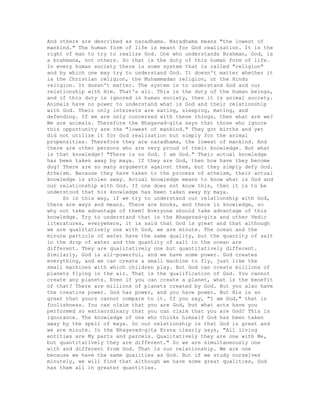
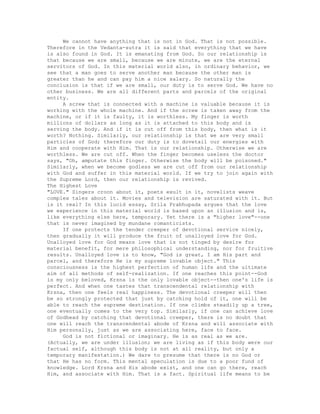
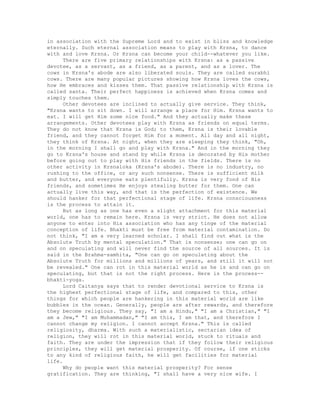
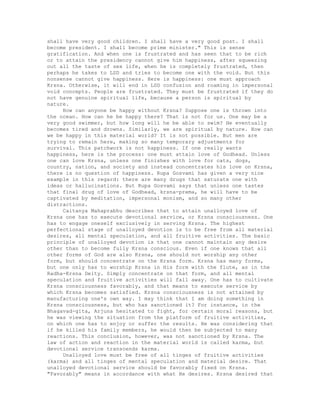
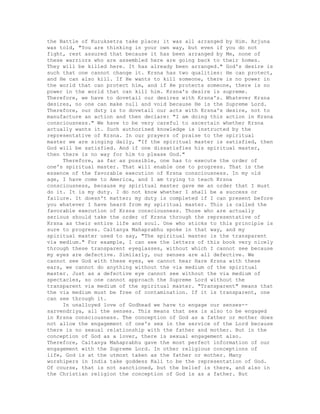
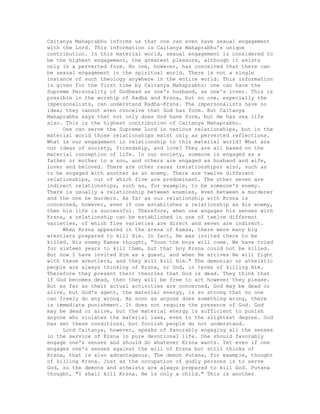
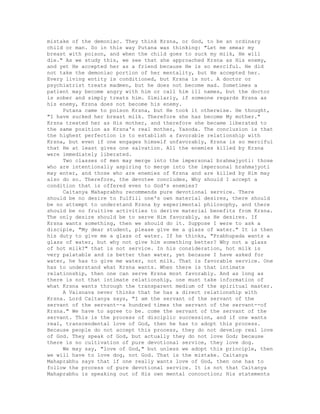
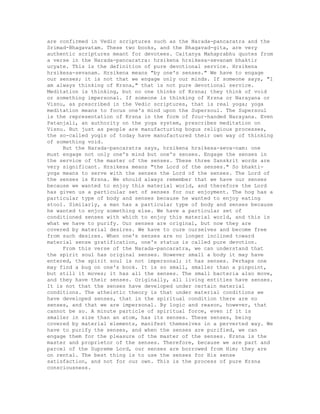
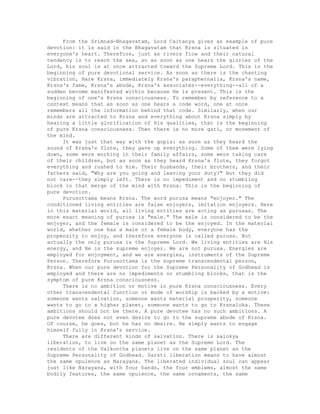
![buildings, everything. Sarupya means to have the same form or features.
Samipya means never to be far away but always to be associated with the
Supreme Lord. For example, just as we are sitting together, so one can
associate with the Lord. This is called samipya-mukti, the liberation of
being nearer. Pure devotees, however, do not accept these various forms
of liberation. They only want to be engaged in Krsna's service. They are
not concerned with any kind of liberation. Those who are actually Krsna
conscious achieve the association of the Supreme Lord, but they do not
desire it; their only ambition is to be engaged in the transcendental
loving service of the Lord. The highest perfection of devotional
service, or Krsna consciousness, is exhibited when a devotee refuses to
accept any benediction or profit from the Supreme Lord. Prahlada
Maharaja was offered whatever he liked, he had only to ask for it, but
he said, "My Lord, I am Your eternal servant. It is my duty to serve
You, so how can I accept any benefit from it? Then I would not be Your
servant; I would be a merchant." He replied in that way, and that is the
sign of a pure person. Krsna is so kind that He fulfills all the desires
of a devotee, even if he wants material benedictions. If at the bottom
of the devotee's heart there is some desire, He also fulfills that. He
is so kind. But the sublime position of bhakti-yoga, or devotional
service, is that a pure devotee refuses to accept the various kinds of
liberation, even if offered by the Supreme Lord.
If one has material desires or motives within himself, and for
fulfillment of such desires he engages himself in devotional service,
the result will be that he will never get pure love of God. If one is
thinking, "I am engaged in Krsna consciousness, in Krsna's devotional
service, because I want such and such an opulence," that desire may be
fulfilled, but he will never get such unalloyed love of Krsna as the
gopis had. If one has a motive, even though he discharges his devotional
duty, he still will not be able to reach the stage of pure love of
Godhead. In a verse from the Bhakti-rasamrta-sindhu, Rupa Gosvami says,
"As long as one desires some material benefit [bhukti], or even if he
wants salvation [mukti], then he must take those ghostly
representations." As long as that maya exists within one's heart, how
can one enjoy the spiritual bliss derived from pure love of Godhead? In
other words, if one has material desires, or even a desire for
salvation, he cannot attain pure love of Godhead. Pure devotion is
devoid of all desires--it is simply to render loving service for its own
sake.
There is a nice example in the life of Rupa Gosvami. Rupa Gosvami
and his brother Sanatana Gosvami were living separately in Vrndavana and
going on with their bhajana, devotional service. Rupa was living in the
forest, and there was no facility for cooking nice food or begging from
the village for a capati to eat. Rupa Gosvami was the younger brother,
and he thought, "If I could get some foodstuffs, then I could prepare
nice dishes and offer them to Krsna and invite my elder brother." He had
that desire. The next moment, a nice girl about twelve years old came
and delivered an abundance of foodstuffs--milk, flour, ghee, etc. That
is the Vedic system; sometimes householders present foodstuffs to
mendicants and sages in the renounced order of life. Rupa Gosvami was
very glad that Krsna had sent so many things and that he could now
prepare a feast. He prepared a feast and then invited his elder brother.](https://image.slidesharecdn.com/scienceofself-realization-180727182233/85/Science-of-self-realization-197-320.jpg)
